#And ultimately just saying 'you' and dropping the nuance of how 'you' is insulting when not used in close company is more efficient
Explore tagged Tumblr posts
Text
WARDI TERMS OF ENDEARMENT
emense [ɛmɛnse] (eh-mehn-say)
Has meaning close to 'beloved' or 'darling'. "Ya emense" (meaning 'my beloved'/'my darling') is often contracted "y'mense".
bubuch [bubuk] (boo-bookh)
Somewhat of a nonsense word, basically ‘big-big’. Tends to either be used for small children or flirtatiously between adults (kind in between 'baby' and 'big boy' in functionality, though without gendered implications of the latter). Sometimes instead used as a form of intense condescension.
ya mache mes [ja mɑke mes] (yah mah-kay mace)
Functionally means "my other face", using the figurative word for face describing a concept of fundamental nature rather than anatomy. Very intense term of endearment, expresses the recipient as a core part of one's identity. Kind of equivalent to 'my other half' but not exclusively romantic.
ya tsitsima [ja ͡tsi͡tsimə] (yah tsee-tsee-muh)
Means "my blood". This term is used more broadly to denote familial relations, and is more of a term of endearment when used outside of actual biological relationship (calling your sister 'my blood' is just an intense way of saying 'my [relative]', calling a non-relative 'my blood' is VERY pointedly affectionate).
ya ungande [ja ungɑnde] (yah oon-gahn-day)
Often contracted to y'ungande, dead literally means "my liver" as in the organ. Ungande alone is also used as a food-based term of endearment, similar to 'honey' except instead with delicious organ meat.
anuje [ɑnudʒe] (ah-noo-jay)
Food based term of endearment, referring to a tree sap that is the most commonly used form of sweetener. Functionally identical to 'honey' in usage.
anu tlansekoma [ɑnu tlɑnsekoʊmə] (ah-noo tlahn-say-koh-muh)
This one actually means 'honey' (dead literally 'bee sweet'). Less common than 'anuje' as a term of endearment due to general cultural preference for anuje as a sweetener and the relative rarity of beekeeping.
inyagit [injəgit] (een-yah-geet)
Diminutive form of 'sun'. 'Ya inya' (my sun) occurs as well, but is less common.
y'mit agai [j'mit ɑgaɪ] (yuh-meet ah-gai)
Contraction of 'ya amit agai', 'my blue moon'. This specification is more common than a general 'my moon(s)' and is fairly loaded, given this particular moon is the site of the afterlife for the most honored dead. The phrase both suggests a sort of celestial beauty and a sense of being honored and finding rest in the recipient. This is a VERY intense and almost exclusively romantic term of endearment.
coutomara [koʊtoʊmɑrə] (koh-to-mahr-uh)
Means 'handsome' or 'beautiful', implies masculine attractiveness. (Dead literally closer to 'strong face'/'strong featured').
jaimara [dʒaɪmɑrə] (jaim-mahr-uh)
Means 'pretty' or 'beautiful', implies feminine attractiveness (dead literally close to 'beautiful face'/'beautifully featured').
katsuy [kɑtsui] [kaht-soo'ee]
Sexually charged description of physical attractiveness, basically calling someone 'sexy'.
ya katsuymen [ja kɑtsuimɛn] (yah koht-soo'ee-mehn)
Related and also sexually charged, close in meaning to 'my desire'.
at akmatse yachouy [ɑt ɑkmɑtse jɑtʃɔɪ] (aht ahk-mat-say yah-choi )
Sexually explicit term of endearment. The dead literal translation is "one who makes me flower". The word "flower" here is not as euphemistic in context and is rather the nicest sounding possible way to say "makes me cum (HARD)". Not considered vulgar, rather cloyingly romantic if anything.
gan(ne) ama [gɑn(e) ɑmə] (gah(-nay) ahm-uh)
Means 'bull'. When used affectionately, implies masculine strength. Usually used in conjunction with an adjective (ie 'handsome bull') or more teasingly gannit ama (little/baby bull))
jaimeti [dʒaɪmɛti] (jai-meh-tee)
Means 'gazelle' (the name for the animal itself is close in meaning to 'beautiful horn'), heavily associated with grace and beauty. Also tends to be used with adjectives ('lovely gazelle' 'handsome gazelle' etc) or with a diminutive.
ansiba [ɑnsibɑ] (ahn-see-bah) or ansibit [ɑnsibit] (ahn-see-beet)
Means 'duck' and 'duckling' respectively, specifically refers to the animal and implies cuteness. Ansibit is a very common term of endearment for children.
"Wannaukoma such datse anmo" [wɑnaʊkoʊmə suk dɑtse ɑnmoʊ] (wahn-now-koh-muh sookh daht-say ahn-moh)
Means 'an ant could swallow you', implies cuteness (ie the recipient is so small and tiny an Ant could devour them whole). Usually used on children, occasionally used on adult women (in a way that feels intensely patronizing to many). 'Datse' (you) may be replaced by the recipients surname or honorific in the rare case that someone would dare calling someone this without being on first name basis with them.
wannaukomit [wɑnaʊkoʊmit] (wahn-now-koh-meet)
Means 'little ant', a term of endearment that borders on insulting even to babies.
OTHER:
-it [it] (eet)
This is a diminutive modifier, which can be added to a name or other word/term of endearment to denote affection (can also be condescending). It lacks internal meaning in everyday use and is closer to the English -y or -ie (billy johnny rosie susie puppy kitty ducky etc).
hippe [hipɛ] (heep-peh) (some dialects drop the h sound entirely)
Means 'small' or 'little', can be spoken with other words/names as an affectionate diminutive.
Other epithets-
Various epithets used in the language are not exclusively used as terms of endearment, but can be contextually. Most commonly, this will be the -machen epithet of the recipients zodiac birthsign (particularly those considered auspicious). Someone with the lion birthsign could be respectfully and/or affectionately called 'odomachen', or VERY affectionately called 'ya odo' ('my lion'). There's also a good variety of poetic epithets that have worked their way into common language as affectionate compliments/descriptors- ie ganatoche (dead literally 'cow-eye', more prettily 'ox-eyed') is a complimentary descriptor for brown eyes, anaemaitsa (dead literally 'river-haired', more prettily 'flowing-haired') compliments wavy hair.
Given name basis-
In Wardi culture, full names are spoken with the family name preceding the given name. When respectfully speaking to a stranger, peer, or authority figure, you refer to them by their family name, title, and/or an honorific. Being on an accepted given name basis with someone is generally indicative of closeness and affection.
datse [dɑtse] (dah-tsay)
This is the word for "you". Similarly to the use of a given name, actually referring to someone as 'you' (rather than a surname, title, or honorific in place of the pronoun) expresses familiarity and intimacy.
#FUCK I LEFT A HUGE ERROR IN THERE OVERNIGHT . Okay#Even longer Wardi insult/vulgarity post coming someday#I can't actually put a lot of the linguistic Nuance in the writing because it doesn't 'translate' well in english. Especially the avoidance#of 'you' pronouns between unfamiliar company. Translating it ranges from mildly clunky to borderline unreadable#(Ie if you're asking a stranger's name in Wardi you'd use an honorific that is roughly equivalent to sir/ma'am if you're being#deferential or 'mister/miss' if not. 'What is mister's name?' sounds weird as fuck in english)#I could just include the in-universe honorifics instead which would avoid that but I'm really trying to avoid loading the text with#constructed language where it's not really necessary. I mean I'm not writing this to be a mega-approachable mass appeal story but#having to memorize a bunch of constructed terms can be a pain in the ass as a reader#(like there's still a lot in there but it's mostly 'untranslatable' words or very specific concepts)#And ultimately just saying 'you' and dropping the nuance of how 'you' is insulting when not used in close company is more efficient#I do have the last name/first name basis distinction in there textually though. A lot of the characters refer to each other#exclusively by surname
97 notes
·
View notes
Note
hi i love your posts and as a gojohime shipper.. i feel sad that there is alot of hate towards this ship since people keep saying she hates gojo or it does not make sense due to limited reactions. What do you feel about this. i think it is just a cute fun ship .. it sadly not canon due to lack of significance and screen time utahime's character. Do you think there is alot of wasted potential with jjk even without gojohime? like with female characters like Shoko and Utahime and character arcs.
Thanks for this ask, anon! I’ll break my answers into parts cuz I’m too much of a resident gojohime yapster 😩✊
Gojo and Utahime’s dynamic
I do think that Utahime does hate Gojo because she actually have valid reasons for it BUT this does not mean that I agree with the way people shit on this part of gojohime cuz they reduce their dynamic too much on “Utahime ABHORS Gojo,” the type of abhor like wishing death on someone, but like that ignores the nuances in their dynamic as well as the individual characters themselves.
At first, Utahime and Gojo’s dynamic seems strictly professional like you know that type of situation where you hate that one person at work but you put up with them to stay “professional” and not have your personal feelings interfere with work. It makes sense because the jujutsu world is such a tight knit community that they’re just stuck with each other, and for both Teacher Gojo and Utahime, they ultimately share the goal of nurturing a better generation. That’s why Utahime puts up with him.
However, of course, with my shipping goggles on, one thing that makes this so delish (aside from their trust on each other) is the man Gojo himself. Utahime tries so much to maintain her “dignity” and “professionalism” but Gojo just keeps on poking and annoying the fuck out of her as if like begging for her attention, and he does get a reaction from her that he seems to like(10 years of it cough cough plus he genuinely thinks that Uta's annoyance to him is their inside joke LMAO)! Comparing this “teasing” to Ijichi and Nanami, Utahime is the one that likely buttheads with him and you know what? Utahime does have valid reasons for “hating” and genuinely getting angry at Gojo. I’m gonna hold Gojo here accountable for the teasing because some fans might think that it’s just him going “haha JK!” but considering how merciless he is in insulting people “weak” and swings around his “The Strongest” title around people, Utahime has the right to be that mad and in some sense, this is like Utahime wanting Gojo to be accountable for his actions and just stop being a dickhead. Like sure, sure, it’s true that it makes sense Gojo is arrogant like that because he’s literally “The Strongest.” He’s literally untouchable. Ijichi is intimidated by him so he’s passive with his teasing. Elders always are shitting their pants when he’s being unpredictable because they can’t stop him. Jeez, even Jogo is scared of him. His arrogance does get him somewhere though (especially when he’s beefing with higher ups to protect his students) and it allows him to get away with being an arrogant brat.
That’s exactly why Utahime’s constant butting heads to Gojo has so much flavour compared to his interaction with others.
Utahime’s constant “respect your senior” just wants Gojo here to see her eye-to-eye, not someone who’s weak or below him but treat her like a human person because she's strong willed like that, and of fucking curse, Gojo being the complicated one here, afterall the “haha weak” teasing, did ask for her help. It’s such a whiplash that Utahime even doubted his request, and Gojo being Gojo responded with his “cuz your weak” reasoning. *Cue that iconic gjhm scene*

BUT ME? Nah, I wasn’t TOO convinced. Gojo’s a complicated guy and this is why I even did a breakdown on why his “haha weak” to Utahime questions is a weak attempt of him tryna cover his emotionally constipated ass.
Manga spoilers but ever since this manga panel dropped,

it basically confirmed that Gojo sees himself as a separate category of people because his “The Strongest” title made him believe that, and this thinking puts him in a strained relationship to most people in his life. He tries to do things alone because others are just “too weak” to support him, like apparently it’s a constant game of a “it’s a skill issue” when it comes to relying to others. He does this to himself when the dude badly needs support, like my guy, you said it yourself that you can’t reform the entire jujutsu system alone lol.
But you know what’s crazy? His cahoots with Utahime is the closest thing to him letting others support him, especially someone he DEEMS “weak.” While yes later on, Gojo did ask Ijichi’s help for the Sukuna fight but Utahime gets a special mention here because she’s THE first. These two just stuck to each other despite being cities away. Moreover, both Utahime and Gojo are teachers who aim to nurture a better generation. They kinda understand each other in that department, ykyk. But then Gojo here isn’t really letting Utahime in because she’s supposedly “weak” and there’s the strained dynamic that surrounds it. Here’s an excellent post that isn’t mine that kinda explains this stuff too.
In other words, I do think Utahime hates Gojo because of how he treats people which is super neat to me cuz she wants him to be accountable and not get away from being an arrogant brat. Meanwhile, Gojo here, in an emotionally constipated, seems to yank her attention A LOT, and I even dare to think that even with walls that he builds, he craves for support but can't be totally upfront about it.
JJK and the wasted potential
The jjk fandom (even how divided we all are at times) can universally agree that Gege fumbled a lot of female characters. I have specifically talked about Utahime, Mai, and Nobara (And I’m working on another Utahime plus kyoto tech actually that was an ask from..months ago hehe) As for Shoko now, yes. I’ve read this one great post about her in how she goes against the “healer of the group” trope presented in shonen anime (example: Naruto’s Sakura and Bleach’s Orihime being the healer shown to have their hearts on their sleeves). I guess what I can say is there’s so much fun to explore with Shoko is her relationship with Utahime because even though she appears distant, she does in fact maintain a long term relationship with Uta. Another potential is her interacting with the students because the number of adults in the manga are literally almost next to none, I see her having the character arc of learning to open up to them and being that aunt who gets real with them why being an adult sucks over alcoholic drinks lol
As for the overall wasted potential from jjk, ngl I go through the cycle of grief whenever I felt this about jjk like yes, I do feel like Mai and Maki’s arc are handled badly and yes, I am saddened by the lack of kyoto tech exploration in the manga. There’s Nobara’s and Yuki's death. However, when hitting the acceptance stage, I just grew to understand that jjk is a bleak ass manga (and it rightfully established itself like that from the start with Junpei’s death) and deaths are a huge part of it which I think a huge chunk of the fandom sometimes FORGETS. Second, Gege’s just not interested in exploring shit that I like. So yeah, I just came to the conclusion that Gege is Gege and the only way he actually makes me keep reading jjk (even with the many heartbreaks of wasted potential I have with it) is how he’s handling Yuuji and Megumi right now cuz I’m pretty invested in them.
28 notes
·
View notes
Text
Is Jensen the most talented person on the face of the planet for making one particular ad-lib? Of course not. I definitely see why some people think it’s an important addition to that scene, though.
In the original scene as written, Mary whines, “I am your mother - but I’m not “just a mom.” I never was. **And you’re not a child**.”
Then they just stare at each other, until Dean asks, “So between us and them-”
I shit you not that ** bullshit is underlined in Bobo the Assclown’s script for emphasis. He apparently is that convinced the Winchesters not being children is a good argument to make for why they totes shouldn’t be upset their own mother abandoned and ignored them to go work with their enemies who tortured them. Then, to add insult to injury, put them in danger at the behest of said enemies while lying about it. Obviously an argument that shouldn’t/couldn’t/wouldn’t be challenged! When it should rightfully be laughed at. Those are not things you should do to a fucking stranger and expect them to just shrug it off.
This is one of the worst points where it was clear that the writers could not tell the difference between how to write a strong independent woman versus a self-involved asshole. For some reason we were supposed to be happy with the Winchesters desperately chasing after zombie!Mary’s affection while she demonstrably gave zero fucks about them as people, let alone as family. I’m not saying that the weight of Sam & Dean’s expectations wouldn’t have been an understandable burden on Mary it was hard for her to deal with. I’m saying the writers attempts to show that conflict had all the nuance and subtlety of dropping a cartoon anvil ten feet from the painted X.
Is “I never was [a child].” the world’s best rebuttal? No, but at least it doesn’t let that utterly asinine bullshit Mary is spouting stand without any response at all as if she’s made some actually valid point. Even if thanks to Berens’ moronic script Dean does ultimately still quasi-validate it in the end after being worried she might have died.
81 notes
·
View notes
Text
Calebros: A Rant About My Favorite VTM NPC
I do love the newer Vampire: the Masquerade content, but sometimes the writing leaves a lot to be desired. A prominent example is - what in my opinion is - the butchery of Calebros’ character in Beckett's Jyhad Diary.



While I do love seeing the more brusque side of Calebros’ personality, I don’t think I’ve ever recalled him being this vulgar in the original Clan Novels. He was definitely not dropping the f-bombs left and right, and even his gruff manner had more to do with dry humor, sarcasm, and keeping up the dignified image fit for a clan leader. I do realize that this series of chat is set much after his whole ordeal as Prince of New York is over, so maybe the experience really changed him. However, the in-universe explanation of his drastic shift in personality is lacking– it is most likely the result of a change in writers which led to inconsistent writing and characterization.
Here are some examples of scenes that presents his characterization in a more nuanced light.
Scene 1: The Nictuku Accusation
“They would have eaten me, I tell you!” “I believe you, Jeremiah,” Calebros said in a forced, calm tone. He was tired of nodding politely, of reassuring his clanmate. Jeremiah could be a difficult person to like at times. This was rapidly becoming one of those times. “Don’t you humor me!” Jeremiah snapped. “I’ve been coming to you about this for weeks now.” Seems more like years, Calebros thought. “And still you’ve done nothing. Nothing!” Jeremiah paced around, gesticulating wildly. There was no second chair by Calebros’s desk, and for this very reason. He mostly didn’t like guests, didn’t want guests, didn’t want to encourage them to sit down, to take a load off and stay for a while. Most anyone who had reason or inclination to visit Calebros was irate, complaining, or tiresome. Jeremiah happened to be all three presently. “That is not true,” Calebros assured him. Jeremiah snorted in disgusted. “What, then? Tell me. What have you done?” “I have considered quite carefully your report.” “Ha! Like I said, nothing. ‘Considered my report…’” Jeremiah repeated contemptuously. “This is what I think of you and your reports—” he said, grabbing a handful of papers from the nearest stack on Calebros’s desk. Jeremiah made to fling them into the air— Instantly, Calebros’s hand shot out and latched around his visitor’s wrist. Talons pricked undead flesh ever so slightly. “Believe me,” said Calebros evenly. “You do not want to do that.” They faced each other for a moment, one monstrous creature restraining the hand of another. Jeremiah’s fingers, biting into the papers, were long and grotesquely thin, little more than needles of bone. His entire body was thin and hard and covered with knots, bulging masses of hardened tissue, like an old, gnarled swamp tree. Finally he stopped resisting Calebros and returned the reports to the desk. “I’m sorry,” Jeremiah said and resumed his pacing, just as intently if less frenetically.
This is from the Nosferatu clan novel. Here, Jeremiah is trying to get Calebros to believe that there truly are Nictukus dwelling in the sewers. Calebros is, frankly, tired of hearing the folk tale especially when he has other pressing matters to deal with. Yet, even with his patience paper thin, he does not lash out at his broodmate. He is shown to be deeply introverted, anti-social perhaps, but he does not let his own nature affect his duties. As the Nosferatu primogen - as the leader of the clan - he has to listen to the concerns of his family, no matter how absurd. He knows when to express his authority, and he never abuses it. Again, no f-bombs dropped.
Scene 2: The Salt Lake
“Geez, what am I, your mother?” Emmett asked. “No,” Calebros said. “You are my brother, my broodmate.” “Brood, litter, whatever. We were both chosen to suck the old blood tit, so who am I to ask questions?” Calebros sighed. Blood tit, indeed. “That’s not how you remember it.” Now it was Emmett’s turn to sigh. “Don’t do this. Don’t get all… You always do this, get all touchy-feely we’re-all-brothers-in-the-blood, when you soak your head, blah, blah, blah…” “Make light of it if you will—” “I will. Thank you very much. Got enough salt here?” Emmett flicked some at Calebros.
This is from the Nosferatu clan novel. Here, Calebros has just came up from his meditation within the mud hole / salt lake. He is shown to be introspective and even sentimental. In terms of character voice, his more poised speaking style and inner monologue is contrasted against Emmett’s rough, colloquial style.
Other Sources
In the Calebros graphic novel, a similar scene is shown where Calebros is depicted to be trying and failing to remember his past before he became a vampire, losing his mind as he mixes up imagination with false memories. His inner dialogue in the graphic novel shows him saying:
“Do I tell him that his prince, his... compatriot?, is losing his mind? Never.”
This very much reflects his true nature. In Vampire: the Masquerade, there is a system of nature vs demeanor. According to his character sheet, his demeanor is that of a “director” while his nature is a “martyr (penitent)”.
Director: To the Director, nothing is worse than chaos and disorder. The Director seeks to be in charge, adopting a "my way or the highway" attitude on matters of decision-making. The Director is more concerned with bringing order out of strife, however, and need not be truly "in control" of a group to guide it. Coaches, teachers, and many political figures exemplify the Director Archetype.
Martyr: The Martyr suffers for his cause, enduring his trials out of the belief that his discomfort will ultimately improve others' lot. Some Martyr simply want the attention or sympathy their ordeals engender, while others are sincere in their cause, greeting their opposition with unfaltering faith in their own beliefs. Many Inquisitors, staunch idealists, and outcasts are Martyr Archetypes.
Penitent: The Penitent exists to atone for the grave sin she commits simply by being who she is. Penitents have either low self-esteem or legitimate, traumatic past experiences, and feel compelled to "make up" for inflicting themselves upon the world. Penitent Archetypes aren't always religious in outlook; some truly want to scourge the world of the grief they bring to it. Repentant sinners, persons with low self-esteem, and remorseful criminals are examples of the Penitent Archetype.
All of these quotes, if feel, matches very much with the Calebros I knew from the clan novel saga. Below are also a set quotes detailing Calebros’ inner dialogue in his graphic novel.
“As prince, only I can save them, only I can keep them from looking where they shouldn’t. A force exists underneath this city, sleeping, and it must remain so, lest we all perish.
“Augustin, my sire, left us to investigate the Nictuku, and came back to me with this information. Could this be Gehenna? The Final Nights? When the Ancients awake to devour their errant children? Can it be stopped? Should it be stopped? Everything that is done is a hope of staving off the inevitable. Why?”
“My embrace into this world was a foregone conclusion, made for me by Augustin. It is no different for anyone else. Why then do we not welcome the coming Armageddon? Exchange one world for another. It sounds almost painless, except I would never accept such a course, neither would my fellow Nosferatu. Neither would my fellow Kindred, for that matter.”
He is incredibly contemplative, and determined too, willing to fight against the inevitable apocalypse of the vampires. As long as his clan and the Kindred as a whole does not give up, does not give in the the despair of Gehenna, he too will be willing to fight for the survival of others.
Scene 3: Against a Master Manipulator
The character of Hesha is... complex. I see him as sort of a sweet-talking, cunning, charismatic cult leader. Here is a dialogue between him and Calebros.
“No harm was done,” Hesha said softly, his voice still the slightest bit scratchy from the ordeal he’d undergone. “As you say,” said Calebros, not looking up and continuing to write furiously. “You concede without agreeing.” Hesha laughed quietly. Calebros’s head whipped up. Angry words were ready on his lips, but the Egyptian’s smile was not mocking. The Setite obviously realized the weakness of his position, physically and strategically, as well as the fragility of their alliance. “Candor is important between friends,” Hesha said. “Otherwise, perceived insults take hold and fester.” “I am quite accustomed to festering,” Calebros said curtly. “I fear that I’m growing so as well,” Hesha said, squeezing one of the boils that stood raised about one of his many open wounds until the canker popped, and frothy pus ran down his arm. He laughed quietly again. Calebros punctuated a written sentence with a particularly violent period. “Your woman willfully disobeyed her instructions.” “She exercised discretion,” Hesha countered. “She blatantly disregarded the safety of my people.” “If anything had gone wrong,” Hesha said, “it would be Pauline lying torn on the ground. Your people would have faded into the night, none the worse for wear.” Calebros fumed. Probably Hesha was correct—but the Nosferatu was not about to admit as much. “I will speak with her,” Hesha said reasonably. “She has not encountered those of your clan before. She’s not aware of how strongly your predilection for…” “Cowardice?” Calebros suggested accusingly. “Prudence, I was going to say. She’s not aware of how strongly your predilection for prudence runs.” Good choice of words, Calebros thought. But, then, Hesha always chose his words carefully, always seemed to know just the right thing to say. It was discomforting in a way, how easily the Setite could alleviate tension with just a few words. Go ahead, Eve. Take a bite of the apple. Adam might like some too. But it seemed that they needed one another—and that outweighed their natural and mutual tendencies to distrust one another. Just barely.
Hesha’s actions managed to get under Calebros’ nerves, as seen in his curt speech, his furious writing, his accusatory reply to Hesha. He is angry for the safety of his clan (which, as seen from all the other sources, is something very dear to him). He is even shown to be stubborn, refusing to admit that Hesha was correct. Even still, he keeps his head rather than loose his cool completely. He also realises Hesha’s smooth words for what they are- manipulation. He is willing to compromise and form a sort of alliance with Hesha too, despite of his distrust and personal feelings.
Calebros and Ramona
I found the strange friendship Calebros had with the Gangrel Ramona to be incredibly touching, and tragic due to the turns it took towards the end (which I won’t spoil). Below are some excerpts from the Nosferatu clan novel showing Ramona’s initial meeting with Calebros and his later assessments of her character.
Neither Pauline nor the other girl, Ramona, had been subjected to the full brunt of facing a Nosferatu. Not until now, that is, when they were brought into Calebros’s presence. He did not hide his true appearance from them. And he could read the dismay, the fear and disgust, on their faces. Of the two, Pauline made the worthier attempt, attempt, to maintain her demeanor of professional detachment—perhaps Ruhadze had taught her well. The Gangrel, unsurprisingly, was not so couth. She gawked, both at Calebros and at Hesha in his current condition, and she hid her revulsion quite poorly, if she tried at all. […] Ramona looked at Calebros again, a more measured look this time, trying to see through the deformities. Good girl, Calebros thought. Young and brash, but not stupid.
Ramona reached for a calendar on Calebros’s desk, but tossed it back when she realized it was from 1972. “That’s still a whole month, and nobody knows where Leopold was that whole time. He could have gone back to the cave.” Smart girl, Calebros thought. He was leading her along the same path of reconstructing events that he had followed.
He compliments her intelligence again and again, and seems genuinely fond of her. Which I believe is why, after he became Prince of New York, he allows her a private audience with him to which he offered her a safe passage out of town which she rejects, viewing his actions as a betrayal. Below is an excerpt from what I think is the Clan Brujah novel.
The hunched form stepped forward, leaning heavily against the seatbacks as he came. Ramona kept straining to pick out the sound of broken gasps that must accompany such labored progress, but the air did not stir. "You had requested an audience, my dear. A private audience. I have gone to some pains to secure a place where we might be alone. Privacy is such an indulgence here. All too often, I find myself unable to justify the expense of importing it. And there is always someone else jealous of such decadence. But you have not come to hear of my distractions. Sit here, next to me, and tell me why you have come.”
[…]
“Calebros chuckled low, a sound like an engine turning. "No, I don't imagine you would. I will miss your straightforward style, Ramona. I find it refreshing. But already you know that there is no longer any place for you here. In the midst of battle—against the Sabbat and later, against Leopold and the Eye—we could afford certain marriages of convenience. But these partnerships will not survive the challenges of peacetime. Your associates, Mr. Ruhadze and Mr. Ravana, they found themselves in much the same position. Each has already left New York.”
[…]
“Calebros was silent for a time, letting her wind down. "I'm sorry I couldn't help you with the Eye, Ramona. And I'm sorry you will have to leave us. Believe me, I would like nothing better than to find a place for you here. I will have sore need of people who can be relied upon in the nights ahead. But you know what you would be up against if you remained here— the posturing, the none-too-subtle snubbing, the outright backstabbing. You are a rarity among our kind, Ramona. But because you are different, you will be hated and eventually destroyed if you stay among the society of the damned. Know that I will remember our time together fondly. If I can be of any assistance to you in relocating..." "No, I understand. It's 'thanks for your help; here's your bus ticket.' Well, I don't need any of your favors. I don't like the strings attached to them. And I resent the fact that you think I'm so stupid that I'll let you screw me over and then thank you for it." "Ramona...”
Again, even during his tenure as Prince of New York he is so damn eloquent, I definitely can’t fathom the word fuck ever slipping out of his mouth. He is compassionate, helping Ramona perhaps for future gains too, but mainly I believe he genuinely wants to do something right, give her the happy ending she deserves for once.
Moreover, I have a soft spot for this quote of Calebros pondering about Ramona’s nature, why she’s always so angry at the world, why every word out of her mouth sounds like an accusation. It showcases well his world-weariness, a cynical attitude that hides his concerns for others.
What have you seen that makes you so angry, so bitter, little one? Calebros wondered. Family killed? Have you been betrayed? How many times, I wonder. You’d best get over it, if you hope to survive.
So... yeah. I’d pay money to see an accurate portrayal of Calebros in a newer media otherwise I might have to write my own fanfic pairing my OC with him
53 notes
·
View notes
Text
Enola Holmes: A Not So Elementary Adaptation

It's cliché and a bit unfair to say that the book was better than the film, but I'm afraid that's precisely where I need to start. Nancy Springer's Enola Holmes: The Case of the Missing Marquess is leagues better than Netflix's adaptation of it. They did her work dirty and to say that I'm shocked at the accolades other reviewers are heaping on the film is an understatement. Before I dive into any critiques though, it's worth acknowledging that not every minute of the two hour film was painful to get through. So what worked in Enola Holmes?
The film is carried by the talent of its cast, Millie Bobby Brown being the obvious heavy-hitter. She helps breathe life into a pretty terrible script and it's only a shame her talent is wasted on such a subpar character.
The idea to have Enola continually break the fourth wall, though edging into the realm of Dora the Explorer at times—"Do you have any ideas?"— was nevertheless a fun way to keep the audience looped into her thought process. Young viewers in particular might enjoy it as a way to make them feel like a part of the action and older viewers will note the Fleabag influence.
The cinematography is, perhaps, where most of my praise lies. The rapid cuts between past and present, rewinding as Enola thinks back to some pertinent detail, visualizing the cyphers with close ups on the letter tiles—all of it gave the film an upbeat, entertaining flair that almost made up for how bloated and meandering the plot was.
We got an equally upbeat soundtrack that helped to sell the action.
The overall experience was... fine. In the way a cobbled together, candy-coated, meant to be seen on a Friday night but we watched it Wednesday and then promptly forgot about it film is fine. I doubt Enola Holmes will be winning any awards, but it was a decently entertaining romp and really, does a Netflix film need to be anything more? If Enola was her own thing made entirely by Netflix's hands I wouldn't be writing this review. As it stands though, Enola is both an adaptation and the latest addition to one of the world’s most popular franchises. That's where the film fails: not as a fun diversion to take your mind off Covid-19, but as an adaptation of Springer's work and as a Sherlock Holmes story.
In short, Enola Holmes, though pretty to look at and entertaining in a predictable manner, still fails in five crucial areas:
1. Mycroft is Now a Mustache-Twirling Villain and Sherlock is No Longer Sherlock Holmes
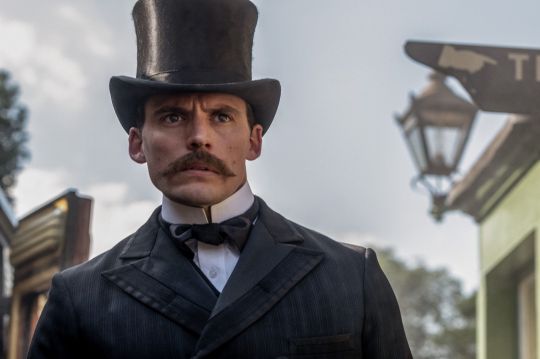
This aspect is the least egregious because admittedly the film didn't pull this version of Mycroft out of thin air. As the head of the household he is indeed Enola's primary antagonist (outside of some kidnappers) and though he insists that he's doing all this for Enola's own good, he does get downright cruel at times:
He rolled his eyes. “Just like her mother,” he declared to the ceiling, and then he fixed upon me a stare so martyred, so condescending, that I froze rigid. In tones of sweetest reason he told me, “Enola, legally I hold complete charge over both your mother and you. I can, if I wish, lock you in your room until you become sensible, or take whatever other measures are necessary in order to achieve that desired result... You will do as I say" (Springer 69).
Mycroft's part is clear. He's the white, rich, powerful, able-bodied man who benefits from society's structure and thus would never think to change it. He does legally have charge over both Enola and Eudoria. He can do whatever he pleases to make them "sensible"... and that right there is the horror of it. Mycroft is a law-abiding man whose antagonism stems from doing precisely what he's allowed to do in a broken world. There are certainly elements of this in the Netflix adaptation, but that antagonism becomes so exaggerated that it's nearly laughable. Enola's governess (appointed by Mycroft) slaps her across the face the moment she speaks up. Mycroft screams at her in a carriage until she's cowering against the window. He takes her and throws her into a boarding school where everything is bleak and all the women dutifully follow instructions like hypnotized dolls. Enola Holmes ensures that we've lost all of Springer's nuance, notably the criticism of otherwise decent people who fall into the trap of doing the "right" (read: expected) thing. Despite her desire for freedom, in the novel Enola quickly realizes that she is not immune to society's standards:
"I thought he was younger.” Much younger, in his curled tresses and storybook suit. Twelve! Why, the boy should be wearing a sturdy woollen jacket and knickers, an Eton collar with a tie, and a decent manly haircut—
Thoughts, I realised, all too similar to those of my brother Sherlock upon meeting me (113-14).
She is precisely like her brothers, judging a boy for not looking and acting enough like a man just as they judged her for not looking and acting enough like a lady. The difference is that Enola has chaffed enough against those expectations to realize when she's falling prey to them, but the sympathetic link to her brothers remains. In the film, however, the conflict is no longer driven by fallible people doing what they think is best. Rather, it's made clear (in no uncertain terms) that these are just objectively bad people. Only villains hit someone like that. Only villains will scream at the top of their lungs until a young girl cries. Only villains roll their eyes at women's rights (a subplot that never existed in the novel). Springer writes Mycroft as a person, Netflix writes him as a cartoon, and the result is the loss of a nuanced message about what it means to enact change in a complicated world.
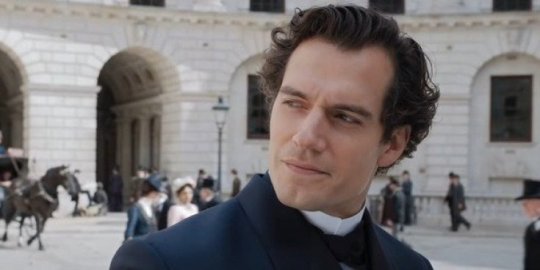
Which leaves us with Sherlock. Note that in the above passage he is the one who casts harsh judgement on Enola's outfit. Originally Mycroft took an interest in making Enola "sensible" and Sherlock— in true Holmes fashion—straddles a fine line between comfort and insult:
"Mycroft,” Sherlock intervened, “the girl's head, you'll observe, is rather small in proportion to her remarkably tall body. Let her alone. There is no use confusing and upsetting her when you'll find out for yourself soon enough'" (38).
***
"Could mean that she left impulsively and in haste, or it could reflect the innate untidiness of a woman's mind,” interrupted Sherlock. “Of what use is reason when it comes to the dealings of a woman, and very likely one in her dotage?" (43).
A large part of Enola's drive stems from proving to Sherlock, the world, and even herself that a small head does not mean lack of intelligence. His insults, couched in a misguided attempt to sooth, is what makes Sherlock a complex character and his broader sexism is what makes him a flawed character, not Superman in a tweed suit. Yet in the film Mycroft becomes the villain and Sherlock is his good brother foil. Rather than needing to acknowledge that Enola has a knack for deduction by reading the excellent questions she's asked about the case—because why give your characters any development?—he already adores and has complete faith in her, laughing that he too likes to draw caricatures to think. By the tree Sherlock remanences fondly about Enola's childhood where she demonstrated appropriately quirky preferences for a genius, things like not wearing trousers and keeping a pinecone for a pet. They have a clear connection that Mycroft could never understand, one based both in deduction and, it seems, being a halfway decent human being. We are told that Enola has Sherlock's wits, but poor Mycroft lucked out, despite the fact that up until this point the film has done nothing to demonstrate this supposed intelligence. (To say nothing of how canonically Mycroft's intellect rivals his brother's.) Enola falls to her knees and begs for Sherlock's help, saying that "For [Mycroft] I'm a nuisance, to you—" implying that they have a deep bond despite not having seen one another since Enola was a toddler. Indeed, at one point Enola challenges Lestrade to a Sherlock quiz filled with information presumably not found in the newspaper clippings she's saved of him, which begs the question of how she knows her brother so well when she hasn't seen him in a decade and he, in turn, walked right by her with no recognition. Truthfully, Lestrade should know Sherlock better. Through all this the sibling bond is used as a heavy-handed insistence that Enola is Sherlock's protégé, him leaving her with the advice that "Those kinds of mysteries are always the best to unpick” and straight up asking at one point if she’s solved the case. The plot has Enola gearing up to outwit her genius brother, which did not happen in the novel and is precisely why I loved it. Enola isn't out to be a master of deduction in her teens, she's a finder of lost people who uses a similar, but ultimately unique set of skills. She does things Sherlock can't because she is isn't Sherlock. They're not in competition, they're peers, yet the film fails to understand that, using Sherlock's good brother bonding to emphasize Enola's place as his protégé turned superior. He exists, peppered throughout the film, so that she can surpass him in the end.
You know what happens in the novel? Sherlock walks away from her, dismissive, and that's that.
That's also Sherlock Holmes. I won't bore you with complaints about Cavill being too handsome and Claflin being too thin for their respective parts, but I will draw the line at complete character assassination. Part of Sherlock's charm is that he's far more compassionate than he first appears, but that doesn't mean he would, at the drop of a telegram, become a doting older brother to a sister of all things. Despite the absurdity of the Doyle Estate's lawsuit against Netflix for making Sherlock an emotional man who respects women... they're right that this isn't their character. Oh, Sherlock is emotive, but it's in the form of excited exclamations over clues, or the occasional warm word towards Watson—someone he has known and lived with for many years. Sherlock respects women, though it's through those societal expectations. He'll offer them a seat, an ear, a handkerchief if they need one, and always the promise of help, but he then dismisses them with, "The fairer sex is your department, Watson." Springer successfully wrote Sherlock Holmes with a little sister, a man who will bark out a laugh at her caricature but still leave her to Mycroft's whims because he has his own life to tend to. This is a man who insists that the mind of a woman is inscrutable and thus must grapple with his shock at Enola's ability to cover the "salient points" of the case (58). Cavill's Sherlock is no Sherlock at all and though there's nothing wrong with updating a character for a modern audience (see: Elementary), I do question why Netflix strayed so far from Springer's work. The novel is, after all, their blueprint. She already managed the difficult task of writing an in-character Sherlock Holmes who remains approachable to both a modern audience and Enola herself, yet for some reason Netflix tossed that work aside.
2. Enola is "Special,” Not At All Like Other Girls
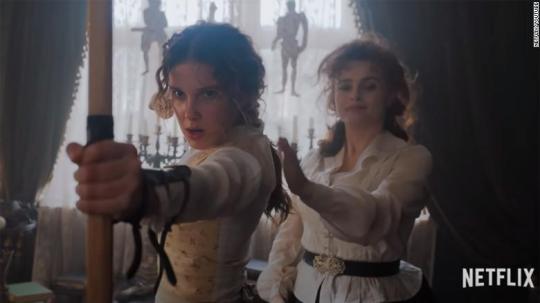
Allow me to paint you a picture. Enola Holmes is an empathetic, fourteen-year-old girl who, while bright, does not possess an intelligence worthy of note. No one is gasping as she deduces seemingly impossible things from the age of four, or admiring her knowledge of some obscure, appropriately impressive topic. Rather, Enola is a fairly normal girl with an abnormal upbringing, characterized by her patience and willingness to work. Deciphering the many hiding places where her mother stashed cash takes her weeks, requiring that Enola work through the night in secrecy while maintaining appearances during the day. She manages to hatch a plan of escape that demonstrates the thought she's put into it without testing the reader's suspension of disbelief. More than that, she uses the feminine tools at her disposal to give herself an edge: hiding her face behind a widow's veil and storing luggage in the bustle of her dress. Upon achieving freedom, her understanding of another lonely boy leads her to try and help him, resulting in a dangerous kidnapping wherein Enola acts as most fourteen-year-olds would, scared out of her mind with a few moments of bravery born of pure survival instinct. She and Tewksbury escape together, as friends, before Enola sets out on becoming the first scientific perditorian, a finder of lost people.
Sadly, this new Enola shares little resemblance with her novel counterpart. What Netflix seemingly fails to understand is that giving a character flaws makes them relatable and that someone who looks more like us is someone we can connect with. This Enola, simply put, is extraordinary. She's read all the books in the library, knows science, tennis, painting, archery, and a deadly form of Jujitsu (more on that below). In the novel Enola bemoans that she was never particularly good at cyphers and now must improve if she has any hope of reading what her mother left her. In the film she simply knows the answers, near instantaneously. Enola masters her travels, her disguises, and her deductions, all with barely a hitch. Though Enola doesn't have impressive detective skills yet, her memory is apparently photographic, allowing her to look back on a single glance into a room, years ago, and untangle precisely what her mother was planning. It's a BBC Sherlock-esque form of 'deduction' wherein there's no real thought involved, just an innate ability to recall a newspaper across the room with perfect clarity. The one thing Enola can't do well is ride a bike which, considering that in the novel she quite enjoys the activity, feels like a tacked on "flaw" that the film never has to have her grapple with.
More than simply expanding upon her skillset—because let’s be real, it’s not like Sherlock himself doesn’t have an impressive list of accomplishments. Even if Enola’s feelings of inadequacy are part of the point Springer was working to make—the film changes the core of her personality. I cannot stress enough that Enola is a sheltered fourteen-year-old who is devastated by the disappearance of her mother and terrified by the new world she's entered. That fear, uncertainty, and the numerous mistakes that come out of it is what allowed me to connect with Enola and go, "Yeah. I can see myself in her." Meanwhile, this new Enola is overwhelmingly confident, to the point where I felt like I was watching a child's fantasy of a strong woman rather than one who actually demonstrates strength by overcoming challenges. For example, contrast her meeting with Sherlock and Mycroft on the train platform with what we got in the film:
"And to my annoyance, I found myself trembling as I hopped off my bicycle. A strip of lace from my pantalets, confounded flimsy things, caught on the chain, tore loose, and dangled over my left boot.
Trying to tuck it up, I dropped my shawl.
This would not do. Taking a deep breath, leaving my shawl on my bicycle and my bicycle leaning against the station wall, I straightened and approached the two Londoners, not quite succeeding in holding my head high" (31-32).
***
"Well, if they did not desire the pleasure of my conversation, it was a good thing, as I stood mute and stupid... 'I don't know where she's gone,' I said, and to my own surprise—for I had not wept until that moment—I burst into tears" (34).
I'd ask where this frightened, fumbling Enola has gone, but it's clear that she never existed in the script to begin with. The film is chock-full of her being, to be frank, a badass. She gleefully beats up the bad guys in perfect form, no, "I froze, cowering, like a rabbit in a thicket" (164). This Enola always gets the last word in and never falters in her confident demeanor, no, "I wish I could say I swept with cold dignity out of the room, but the truth is, I tripped over my skirt and stumbled up the stairs" (70). Enola is the one, special girl in an entire school who can see how rigid and horrible these social expectations are, straining against them while all her lesser peers roll their eyes. That's how she's characterized: as "special," right from the get-go, and that eliminates any growth she might have experienced over the course of the film. More than that, it feels like a slap in the face to Springer's otherwise likeable, well-rounded character.
3. A Focus on Hollywood Action and Those Strong Female Characters
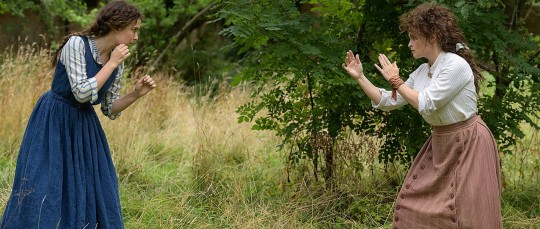
It never fails to amaze me how often Sherlock Holmes adaptations fail to remember that he is, at his core, an intellectual. Sure, there's the occasional story where Sherlock puts his boxing or singlestick skills to good use, and he did survive his encounter with Moriarty thanks to his own martial arts, but these moments are rarities across the canon. Pick up any Sherlock Holmes story, open to a random page, and you will find him sitting fireside to mule over a case, donning a disguise to observe the suspects, or combing through his many papers to find that one, necessary scrap of information. Sherlock Holmes is about deduction, a series of observations and conclusions based on logic. He's not an action hero. Nor is Enola, yet Netflix seems to be under the impression that no audience can survive a two hour film without something exploding.
I'd like to present a concise list of things that happened in the film that were, in my opinion, unnecessary:
Enola and Tewksbury throw themselves out of a moving train to miraculously land unharmed on the grass below.
Enola uses the science knowledge her mother gave her to ignite a whole room of gunpowder and explosives, resulting in a spectacle that somehow doesn't kill her pursuer.
Enola engages in a long shootout with her attacker, Tewksbury takes a shot straight to the chest, but survives because of a breastplate he only had a few seconds to put on and hide beneath his shirt. Then Enola succeeds in killing Burn Gorman's slimy character.
Enola beats up her attackers many, many times.
This right here is the worst change to her character. Enola is, plainly put, a "strong woman." Literally. She was trained from a young age to kick ass and now that's precisely what she'll do. Gone is the unprepared but brave girl who heads out onto the dangerous London streets in the hope of helping her mother and a young boy. What does this Enola have to fear? There's only one martial arts move she hasn't mastered yet and, don't worry, she gets it by the end of the film. Enola suffers from the Hollywood belief that strong women are defined solely as physically capable women and though there's nothing wrong with that on the surface, the archetype has become so prevalent that any deviation is seen as too weak—too princess-y—to be considered feminist. If you're not kicking ass and taking names then you can only be passive, right? Stuck in a tower somewhere and awaiting your prince. But what about me? I have no ability to flip someone over my shoulder and throw them into a wall. What about pacifists? What about the disabled? By continually claiming that this is what a "strong" woman looks like you eliminate a huge number of women from this pool. The women we are meant to uphold in this film—Enola, her Mother, and her Mother's friend from the teahouse—are all fighters of the physical variety, whereas the bad women like Mrs. Harris and her pupils are too cultured for self-defense. They're too feminine to be feminist. But feminism isn't about your ability to throw a punch. Enola's success now derives from being the most talented and the most violent in the room, rather than the most determined, smart, and empathetic. She threatens people and lunges at them, reminding others that she's perfectly capable of tying up a guy is she so chooses because "I know Jujitsu." Enola possesses a power that is just as fantastical as kissing a frog into a prince. In sixteen short years she has achieved what no real life woman ever will: the ability to go wherever she pleases and do whatever she wants without the threat of violence. Because Enola is the violence. While her attacker is attempting to drown her with somewhat horrific realism, Enola takes the time to wink at the audience before rearing back and bloodying his nose. After all, why would you think she was in any danger? Masters of Jujitsu with an uncanny ability to dodge bullets don't have anything to fear... unlike every woman watching this film.

It's certainly some kind of wish fulfillment, a fantasy to indulge in, but I personally preferred the original Enola who never had any Hollywood skills at her disposal yet still managed to come out on top. That's a character I can see myself in and want to see myself in given that the concept of non-violent strength is continually pushed to the wayside. Not to mention... that's a Sherlock Holmes story. Coming out on top through intellect and bravery alone is the entire point of the genre, so why Netflix felt the need to turn Enola into an action hero is beyond me.
4. Aging Up the Protagonists (and Giving Them an Eye-Rolling Romance)
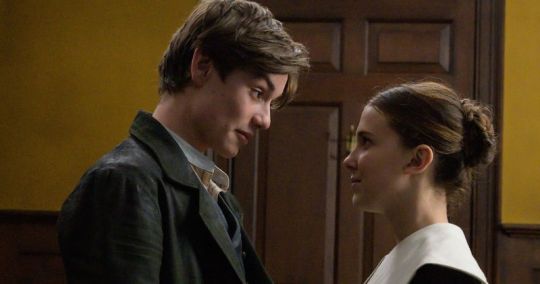
The choice to age up our heroes is, arguably, the worst decision here. In the original novel Enola has just turned fourteen and Tewksbury is a child, twelve-years-old, though he looks even younger. It's a story for a younger audience staring appropriately young heroes, with the protagonists' status as children crucial to one of the overarching themes of the story: what does it really mean to strike out on your own and when are you ready for it? Adding two years to Enola's age is something I'm perfectly fine with. After all, the difference between fourteen and sixteen isn't that great and Brown herself is sixteen until February of 2021, so why not aim for realism and make her character the same? That's all reasonable and this is, indeed, an adaptation. No need to adhere to every detail of the text. What puzzles me though is why in the world they would take a terrified, sassy, compassionate twelve-year-old and turn him into a bumbling seventeen-year-old instead?
Ah yes. The romance.
In the same way that I fail to understand the assumption that a film needs over-the-top action to be entertaining, I likewise fail to understand the assumption that it needs a romance—and a heterosexual one to boot. There's something incredibly discomforting in watching a film that so loudly proclaim itself as feminist, yet it takes the strong friendship between two children and turns it into an incredibly awkward, hetero True Love story. Remember when Enola loudly proclaims that she doesn't want a husband? The film didn't, because an hour later she's stroking her hand over Tewksbury's while twirling her hair. Which isn't to say that women can't fall in love, or change their minds, just that it's disheartening to see a supposedly feminist film so completely fall into one of the biggest expectations for women, even today. Forget Enola running up to men and paying them for their clothes as an expression of freedom, is anyone going to acknowledge that narratively she’s still stuck living the life the men around her want? Find yourself a husband, Enola. The heavy implication is she did, just with Jujitsu rather than embroidery. Different method, same message, and that’s incredibly frustrating when this didn’t exist in the original story. “It's about freedom!” the film insists. So why didn't you give Enola the freedom to have a platonic adventure?
It's not even a good romance. Rather painful, really. When Tewksbury, after meeting her just once before, passionately says "I don't want to leave you, Enola" because her company is apparently more important than him staying alive, I literally laughed out loud. It's ridiculous and it's ridiculously precisely because it was shoe-horned into a story that didn't need it. More than simply saddling Enola with a bland love interest though, this leads to a number of unfortunate changes in the story's plot, both unnecessary additions and disappointing exclusions. Enola no longer meets Tewksbury after they've both been kidnapped (him for ransom and her for snooping into his case), but rather watches him cut himself out of a carpetbag on the train. I hope I don't have to explain which of these scenarios is more likely and, thus, more satisfying. Meeting Tewksbury on the train means that Enola gets to have a nighttime chat with him about precisely why he ran away. Thus, when she goes to his estate she no longer needs to deduce his hiding spot based on her own desires to have a place of her own, she just needs to recall that a very big branch nearly fell on him and behold, there that branch is. (The fact that the branch is a would-be murder weapon makes its convenient placement all the more eye-rolling.) Rather than involving herself in the case out of empathy for the family, Enola loudly proclaims that she wants nothing to do with Tewksbury and only reluctantly gets involved when it's clear his life is on the line. And that right there is another issue. In the novel there is no murderous plot in an attempt to keep reform bills from passing. Tewksbury is a child who, like Enola, ran away and quickly discovers that life with an overbearing mother isn't so bad when you've experienced London's dangerous streets. That's the emotional blow: Enola has no mother to go home to anymore and must press out onto those streets whether she's ready for it or not.
Perhaps the only redeeming change is giving Tewksbury an interest in flowers instead of ships. Regardless of how overly simplistic the feminist message is, it is a nice touch to give the guy a traditionally feminine hobby while Enola sharpens her knife. The fact that Enola learned that from her mother and Tewksbury learned botany from his father feels like a nudge at a far better film than Enola Holmes managed to be. For every shining moment of insight—the constraints of gendered hobbies, a black working class woman informing Sherlock that he can never understand what it means to lack power—the film gives us twenty minutes worth of frustrating stupidity. Such as how Enola doesn't seem to conceive of escaping from boarding school until Tewksbury appears to rescue her. She then proceeds to get carried around in a basket for a few minutes before going out the window... which she could have done on her own at any point, locked doors or no. But it seems that narrative consistency isn't worth more than Enola (somehow) leaving a caricature of Mrs. Harris and Mycroft behind. The film is clearly trying to promote a "Rah, rah, go, women, go!" message, but fails to understand that having Enola find a way out of the school herself would be more emotionally fulfilling than having her send a generic 'You're mean' message after the two men in her life—Sherlock and Tewksbury—remind her that she can, in fact, take action.
Which brings me to my biggest criticism and what I would argue is the film's greatest flaw. Reviewers and fans alike are hailing Enola Holmes as a feminist masterpiece and yes, to a certain extent it is. Feminist, that is, not a masterpiece. (5) But it's a hollow feminism. A fantasy feminism. A simple, exaggerated feminism that came out of a Feminism 101 PowerPoint. To quote Sherlock, let's review the salient points:
A woman cannot be the star of her own film without having a male love interest, even if this goes against everything the original novel stood for.
A feminist woman cannot also be selfish. Instead she must have a selfless drive to change the world with bombs.
The best kind of women are those who reject femininity as much as they can. They will wear boy's clothes whenever possible and snub their nose at something as useless as embroidery. Any woman who enjoys such skills or desires to become lady-like just hasn't realized the sort of prison she's in yet.
The best women also embody other masculine traits, like being able to take down men twice their size. Passive women will titter behind their hands. Active women will kick you in the balls. If you really want to be a strong woman, learn how to throw a decent punch.
Women are, above all, superior to men.
Yes, yes, I joke about it just as much as the next woman, but seeing it played fairly straight was a bit of an uncomfortable experience, even more-so during a gender revolution where stories like this leave trans, nonbinary, and genderqueer viewers out of the ideological loop. Enola goes on and on about what a "useless boy" Tewksbury is (though of course she must still be attracted to him) and her mother's teachings are filled with lessons about not listening to men. As established, Mycroft—and Lestrade—are the simplistically evil men Enola must circumvent, whereas Sherlock exists for her to gain victory over: "How did your sister get there first?" Enola supposedly has a strength that Tewksbury lacks— he's just "foolish"—and she shouts out such cringe-worthy lines as, "You're a man when I tell you you're a man!"
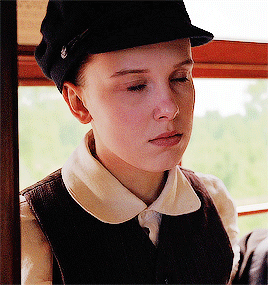
I get the message, I really do. As a teenager I probably would have loved it, but now I have to ask: aren't we past the image of men-hating feminists? Granted, the film never goes quite that far, but it gets close. We’ve got one woman who is ready to start blowing things up to achieve equality and another who revels in looking down on the men in her life. That’s been the framing for years, that feminists are cruel, dangerous people and Tewksbury making heart-eyes at Enola doesn’t instantly fix the echoes of that. There's a certain amount of justification for both characterizations—we have reached points in history where peaceful protests are no longer enough and Tewksbury is indeed a fool at times—but that nuance is entirely lost among the film's overall message of "Women rule, men drool." It feels like there’s a smart film hidden somewhere between the grandmother murdering to keep the status quo and Enola’s mother bombing for change, that balance existing in Enola herself who does the most for women by protecting Tewkesbury... but Enola Holmes is too busy juggling all the different films it wants to be to really hit on that message. It certainly doesn’t have time to say anything worthwhile about the fight it’s using as a backdrop. Enola gasps that "Mycroft is right. You are dangerous" when she finds her mother's bombs, but does she ever grapple with whether she supports violence on a large scale in the name of creating a better world? Does she work through this sudden revelation that she agrees with Mycroft about something crucial? Of course not. Enola just hugs her mom, asks Sherlock not to go after her, and the film leaves it at that.
The takeaway is less one of empowerment and more, ironically, of restriction. You can fight, but only via bombs and punches. It's okay to be a woman, provided you don't like too many feminine things. You can save the day, so long as there's a man at your side poised to marry you in the future. I felt like I was watching a pre-2000s script where "equality" means embracing the idea that you're "not like other girls" so that men will finally take you seriously. Because then you don't really feel like a woman to them anymore, do you? You're a martial arts loving, trouser-wearing, loud and brilliant individual who just happens to have long hair. You’re unique and, therefore, worthy of attention, unlike all those other girls.

That's some women's experiences, but far from all, and crucially I don't think this is the woman that Springer wrote in her novel.
The Case of the Missing Marquess is a feminist book. It gives us a flawed, brave, intelligent woman who sets out to help people and achieves just that, mostly through her own strength, but also with some help from the young boy she befriends. Her brothers are privileged, misguided men who she nevertheless cares for deeply and her mother finally puts herself first, leaving Enola to go and live with the Romani people. Everyone in Springer's book feels human, the women especially. Enola gets to tremble her way through scary decisions while still remaining brave. Her mother gets to be selfish while still remaining loving. They're far more than just women blessed with extraordinary talents who will take what they want by force. Springer's women? They don't have that Hollywood glamour. They're pretty ordinary, actually, despite the surface quirks. They’re like us and thus they must make use of what tools they have in order to change their own situations as well as the world. The fact that they still succeed feels very feminist to me, far more-so than granting your character the ability to flip a man into the ground and calling it a day.
Know that I watched Enola Holmes with a friend over Netflix Party and the repeated comment from us both was, "I'd rather be watching The Great Mouse Detective." Enola Holmes is by no means a horrible film. It has beauty, comedy, and a whole lot of heart, but it could have been leagues better given its source material and the talent of its cast. It’s a film that tries to do too much without having a firm grasp of its own message and, as a result, becomes a film mostly about missed potential. Which leads me right back to where I began: The book is better. Go read the book.
Images
Enola Holmes
Mycroft Holmes
Sherlock Holmes
Enola and her Mother Doing Archery
Enola and her Mother Fighting
Tewkesbury and Enola
33 notes
·
View notes
Text

Dear @lunitamoon,
First of all, I am sorry it took so long to get to you, but thank you very much for your sweet compliments! The day you sent the ask was great, and so is today. I hope your life is good to you too.
But now without further ado, your question.

Uchikawa Reo
I think Reo is a very good actor. My first opinion of him when I saw him in Noah’s Ark Circus 2016 was that he has a lot of talent. Some of these talents were not polished yet, (his singing being one example, but given his young age I couldn’t possibly blame him), while other talents were already polished to a sparkling gem. When people talk about Reo, it is usually “cuteee, so tiny!!!” or compliments of the like. His looks make people shove his remarkableness as an actor under these irrelevant external qualities. That is a shame, so please allow me to highlight a few things that are remarkable about this boy.
Character interpretation and understanding
I think Reo understood the character of O!Ciel very well and he was able to deliver many of the nuances even his first time in the role. When hastily interpreted, O!Ciel’s character runs the risk of being taken for nothing but cranky, sulky and haughty. Reo however, even at the age of 12 managed to see that these three obvious traits have a much deeper root: ‘doneness’. O!Ciel is done with his butler’s sauciness, done with people around him imposing their opinions on him, done with the world. Uchikawa Reo managed to capture this fatigue quite well.

In the scene where Soma is altogether a bit too clingy, I think many would think O!Ciel would push the prince away or slap him away. Reo however, did not. He was trying to pull away Soma’s hands, but he never showed antagonism. Just doneness. Regardless of whether O!Ciel does or doesn’t see Soma as his ‘big brother figure’ and ‘friend’, he does care about him. Even when Reo-bocchan said: “I’m exhausted because of you,” there was no callousness in his voice; just irritation.
Reo managed to find a beautiful middle ground between ‘warm’ and ‘cold’ for O!Ciel, and that is exactly what I believe our Trash Baby Lord is. That is a lot more nuance in character study than I could possibly expect from most actors, let alone a 12 year old one.
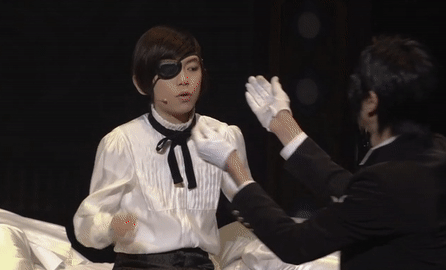
Another example of Reo’s great understanding of his role is in the scene where he questions his butler whether he would be able to bring them to Baron Kelvin’s manor within an hour. Here he raised an eyebrow as he spoke. This raised eyebrow is very significant.
In the post ‘That Butler, Punchable‘, I discussed in detail how Sebastyun is constantly being very snarky at his master, presumably so because he did not consider the boy worthy of his full respect. In the scene of this example however, O!Ciel has earned the demon’s full respect, and he knows it.
Raising an eyebrow, O!Ciel shows that he has reestablished dominance as master, and that intellectually he is on the same playing field as the demon. He knows what he is doing, and unsurprisingly, the question asked was thusly phrased as a rhetorical one. Hence I did not translate this line as: “can you?” but instead as “you can, right?” Through this nuance, Reo-bocchan shows a great level of confidence and his grasp over the case.
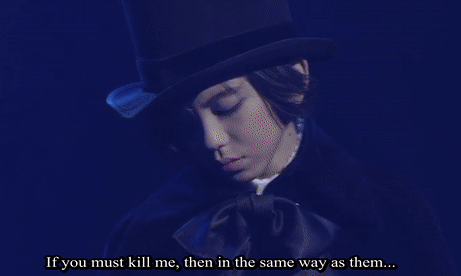
Something else remarkable about 12-year-old Reo is his body-language. In the showdown between him and Baron Kelvin, Reo knew very well how to deliver his actions and the tension of the scene to even the people in the furthest back of the theatre. He takes his time to carry out every movement with meaningful decisiveness. One powerful kick. Re-assume stance. Walk behind his victim. Trap him under his foot. Point the gun at him. Had Reo just kicked Kelvin and stood on him in one consecutive movement, then the impact would have been broken.
I am not sure whether this was intentional, but before Reo pointed the gun at Kelvin, the hand that held the weapon was relaxed, which meant it would not attract attention away from his footwork. Only when the footwork was finished did Reo reveal his gun again from underneath his cape, effectively re-shifting attention back to the weapon when that should be the central focus again. In theatre where audiences don’t view the production through edited and selected footage, it is vital that actors know where they should draw attention to, and reversely, where not to. Reo did well.

Reo’s natural flair for comedy is also noteworthy. O!Ciel’s character’s funniness is mostly his insane cuteness and inability to can at times; not because he has funny remarks to make. Trying too hard to be funny is a big theatre/movie sin, but Reo is luckily no sinner
As demonstrated above, Reo has an excellent understanding of his role and is careful in maintaining it even when the musical calls for comedy. Reo employed a very advanced technique of achieving comedy; namely discrepant solemness. He does not loosen up or start monkeying around; instead he maintains his usual up-tightness while tricking Aberline into saying his own name wrong. The brilliancy in this scene was not just Reo’s ability to employ this advanced comedy technique, but also that the nature of this skit was perfectly in character for this insidious, manipulative brat.

In Tango on the Campania Reo filled most of the ‘space for growth’ he still had in the previous musical. Even though Reo’s body language on stage was already great in Noah’s Ark Circus, he did have the tendency to stand idle when the scene’s focus was not on him. In the latest musical however, Reo would not forget to also act when he was in the background.
His singing also largely improved, and was able to prolong his notes as well as transitioning between the notes. He still had trouble hitting the highest of notes, but his voice would no longer die off mid-way in its ascending.
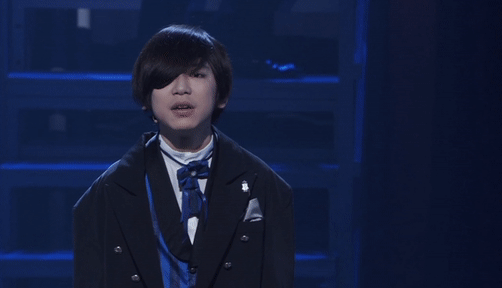

Fukuzaki Nayuta
I think Nayuta is a great actor too, and personally a seemingly very underrated gem. In the first run of the Lycoris that Blazes the Earth (2014) Nayuta was admittedly not the best actor ever seen in theatre history. However, he did up the game for Ciel actors even at the time. Acting style is more preference-bound, but undeniably Nayuta’s singing was more solid than any past Ciel performer before him. Despite him having outclassed past Ciels’ singing, Nayuta received a lot of hate from fans, most amounting to: “I can’t watch this, he is too ugly.” (Yes, very constructive, very legit. Ughum. The Kurofandom never fails to remind me how so many are here just for the pretttiiiiiiessss >_>)
In 2015, Nayuta’s voice was actively dropping, sending him in a constant swing between up-and-down. I don’t have experience with a dropping voice, but I heard from everyone who did that it is incredibly hard to control your voice in speaking, let alone singing. And yet, though his voice was rough at all times, Nayuta did manage to hit all the tones. I find that very impressive. I think technique-wise, Nayuta is the strongest singer among all Ciel stage-actors so far. I haven’t heard his singing after his voice-change was complete, but I can imagine him having become a very good singer now. His capacity for control over his voice is superb, after all.

Nayuta’s acting is very subtle but convincing. When Nayuta-bocchan was in his cage, he even added some little movements of the hand that would not be in people’s usual expectations given the situation. To me, this little quirk seemed to convey how despite already having hit rock bottom, the last straw had only fallen just now. This boy is not just scared and desperate, he is murderously angry and resolute.
Nayuta’s subtle and yet convincing body-language can be seen throughout the musical. To demonstrate what I mean by ‘convincing’, I wish to point at Tango on the Campania. Compare Nayuta’s shaking to the headbanging of the stand-in for O!Ciel... Nope. (This actress is not a child, so I can be harsher.)

Again, Nayuta’s acting is subtle, but it does mean it is easily missed, especially in a live theatre. (’Overacting’ is obviously a thing (see demonstration 1 above ⇈), but to the people who initially criticised Furukawa for “moving around too much”, that’s the theatre medium for you. Theatre was not made to be recorded and viewed in close proximity. Moving any less will basically be invisible in a theatre (see my analysis of Tamaki’s performance as Snake).)
Enough side-tracked, back to Nayuta. In the scene where Nayuta-bocchan just woke up, he performed the panic dying down slowly expertly. We can tell that the shaking and heavy breathing really got the better of him, but that the boy was actively trying not to show his butler. This was probably not visible live, but we have footage of it, so let us savour the panic-dying-down for what it is.
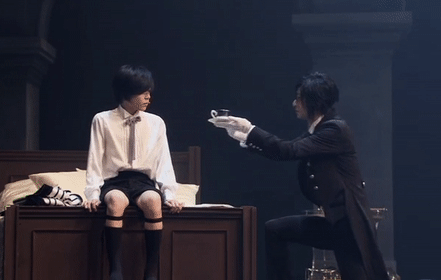
Though I might go as far as to say Nayuta might be better suited as a film-actor than theatre-actor, what was not missed on live audiences was this iconic scene below ⇊ when it finally dawned in O!Ciel that he had been chasing the wrong tail all along.
The atmosphere he created was incredibly tense, and we could practically hear the gears grinding and suddenly coming to a shocking halt. Bravo. It is ultimately for this scene that I think Nayuta would make a phenomenal stage-actor with just a BIT more stage-oriented instructions from the director.

Another scene that also conveyed the tension excellently was when O!Ciel was putting up with the Viscount. Nayuta knew better than put on an insulting high-pitched voice in parody of “a girl’s voice”, instead he minded the intonation of speaking and subtler mannerisms girls are socialised to perform.
When the Viscount really got way too close, Sasaki’s acting was incredibly flamboyant and loud, and yet it never threatened to overshadow Nayuta’s performance. Nayuta knows very well how to keep people’s attention on him even when he doesn’t have lines to say. When the Viscount turned Nayuta-bocchan around, the boy’s facial expression spoke voluuuumes.


Sakamoto, Nishii and Tanaka
I don’t have footage of them, and I am not going to get them legally or illegally, so I will include no visual examples of them in this post.
I don’t want to be harsh on children, they all did their best I believe, but do allow me to say that I am not very enthusiastic about their performances.
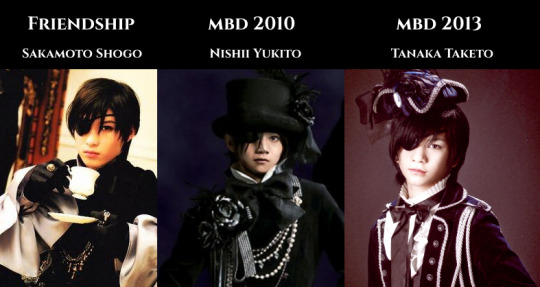
Sakamoto’s performance of Ciel was not very memorable, but I think it mostly has something to do with his part in the script just not being memorable at all. To sum up; Ciel in ‘Friendship’ received some guests from Japan, played chess, and stared wide shifty-eyed until the case solved itself. Sakamoto’s singing was decent, though. I wish they capitalised more on that.
Nishii... I think many people were initially especially enthusiastic about him because he did not “look like Vincent Phantomhive”. He did his best, I could tell he had fun in the performance, but whatever acting-talent he might have, the musical never gave him any chance to shine. That musical gave his character ZERO nuance. Nishii’s singing was very unpolished, and in the mere 3 weeks of audition time, there was also no time to get it polished. But then again, the same goes for the singing of most of that cast.
Tanaka... I could tell he did his best, but perhaps he was doing his best not to f*ck up a bit too hard. The songs in this musical were rather challenging, and Tanaka always seemed very tense as he was trying to chase the notes. It was like he was desperately clinging to his spot within a safety-zone, which ultimately meant he didn’t explore any potentials outside the range of monotony. When it comes to acting, it also seemed like cranky outbursts were the only emotion he dared touch upon.

So that was that! Thanks for reading!
#Kuroshitsuji#Black Butler#Kuromyu#Musical#Noah's Ark Circus#tango on the campania#Lycoris#Lycoris that Blazes the Earth#TotC#NAC#MBD#the most beautiful death in the world#uchikawa Reo#Fukuzaki Nayuta#aka my underrated boi#sakamoto shougo#Nishii yukito#Tanaka Taketo
115 notes
·
View notes
Text
Thoughts on Other Students in 3H
in no particular order
Hubert: evil snake boi, i kinda like you. i just wish there was more actual meat to ya then what there is. still, he does his role effectively and unlike edelgard plays into the whole evil empire thing with more gusto so i ironically find him more palatable because atleast the game isnt trying to pretend he isnt shady as fuck.
Dedue: oddly charming despite his straight laced attitude, he gets some interesting nuance in how well he highly respects (cough loves cough) dimitri and likes individual people from the blue lions, he doesnt have any particular fondness for faerghus as a whole which is definitely understandable given his history. hes essentially using the camus/murdoch aspect of undying loyalty and even borrows elements of the female camuses line of romantic interest in their liege however heavily implied it might be and applying that to a male playable character. Plus he just has some fun and interesting interactions with other characters in general.
Lorenz: I have difficulty saying whether i like him. on the one hand, he ended up being more multidimensional then i thought he was going to be with his internal conflict between keeping up appearances for the sake social status and societal order and his desire to pursue his own personal interests and ideals against the needs of his father and thus societal conventions. on the other hand, the game never really runs with this as much as it should and hes still treated as a bit of a joke character so... c+ to b?
Ingrid: the token heterosexual of the blue lions whos still kinda gay anyways, her whole struggle with being a knight over a housewife seems a bit odd on the surface considering theres plenty of female knights and no one throws much of a fuss in universe, until you learn that it isnt so much that society expects her to do it as matter of course and more so that shes struggling with whether to pursue personal duty to her family or personal desires and ideals kinda like lorenz. in that respect she hits the mark a bit better then he does.
Raphael: kinda insubstantial but i liked him anyways, his sheer exuberance can be kinda refreshing in the games darker moments and hes got a few angles of his own such as his refusal to consider his parents deaths as part of a larger conspiracy so as to not hurt his friendship with ignatz nor ruin his own life and his sisters. plus hes just generally a nice guy. like a big huggable bear. just a shame that being a nice kinda dumb huggable bear is all thats really done with him.
Ignatz: his painting stuff and personal insecurities about wanting to do it over being a knight which his parents want him to do, more of that duty over desires and ideals thing again, is well enough and his probably misplaced guilt over raphaels misfortunes is definitely a highlight of him but he never really grabs as a character for some reason. probably because theres a lot of other characters in the game that hit those same marks and do it better then him.
Sylvain: has a lot of aspects that never really feel like they get proper follow up, his big thing is less womanizer and more so that he covers up his own mistrust and personal feeling by pretending to be a shameless flirt and philanderer. basically, maybe the emotional pain will go away if i flirt with girls and act the fool. but again there never really feels like theres any proper follow up for all this, others comment on it and then its more often then not dropped in story. hes fun enough but never really realized if that makes sense.
Caspar: shonen protagonist is kinda an apt word to describe him honestly, and that idealism of his clashes with the more grey on grey morality of the world hes within which is never a particularly bad direction to take the shonen bois in if done well like hunter x hunter. And he is done well, or at least satisfactorily to the point that hes another one i ended up liking more then i thought i would. his problem is more so that his interactions with most other characters in the main cast which feel duller then they should on most occasions.
Dorothea: probably gonna get a bit of shit for this, but i have no interest in her. her insecurities about her future and getting a good husband is well and interesting but manuela does that better honestly and outside of that dorotheas a bit... not shallow but hazy and insubstantial if you will. she obviously has appeal to people but like ignatz she failed to grab me in part because others did what she did and better within the game itself.
Ashe: soft boi chose to be soft instead of hard, one of the characters i found liking and one i expected to kinda like to begin with. in game he gets accused of being childish and naive a lot but i dont see it personally, hes not naive but more so tries to look for the best in people and in life like lonato did all those years ago for him. that said, the speed with which lonato dies damages his identity as a character a bit by happening before we really get a chance to feel for his relation to lonato, its not to big a bug bear as it doesnt hurt his character all that much but it does feel a bit frustrating.
Felix: teenage angst personified, his main gripes seem to be a distaste of warrior culture and its glorification of bloodshed and sacrifice but instead of approaching it with sadness or pacifism, he lashes out against what he feels is the unfairness of the world. hes not exactly wrong in his feelings and as a character it makes sense and works for his abrasive attitude, and its an interesting twist to the navarre type to have their isolation come not from stoicism nor sheer blood lust or a combo of the two but rather from a rage against the machine of society mindset.
Ferdinand: he got more interesting as i got farther along, and i personally feel he works the best as a character when going against edelgard since thats where more of his personal drama comes from. hes eager to succeed and prove himself worthy of his title over time and holds a chivalrous mindset very similar to others in the cast but his growth is less about learning how to hold onto those ideals in the face of reality for the sake of personal fulfillment but more so about learning to define himself by himself and not by societies needs. ultimately he comes to value chivalry not because its what people tell him to value but because he truly values it and i enjoy that. but its also why i feel he works better on other routes then edelgards since there hes still valuing himself not for himself but for the expectations society or edelgard in this case is placing him under, one tyrant for another in a sense. i admit i dont remember much about him on edelgards route though because i just like him more on the others.
Leonie: poorly timed support aside, she has an odd charm to her that a lot of modern fire emblem characters just dont have anymore. but knuckling past jeralt senpai shes an interesting blend of stingy and work effort that goes to inform itself and her relations to others. and like a lot of the golden deer she has a lackadaisical attitude of ‘i might not know what the fuck is happening, but i do know someone needs an ass whooping!’ and it works especially well in her case since her character is very attuned towards focusing more on her personal matters then the grand scheme of things because she has rent due in a few months. if she was in a more traditional fe set up she would definitely be a beowolf archtype that you need to pay to recruit. in fact im surprised thats not an option on other routes to begin with for her.
Hilda: honestly suprised me by not being a pure serra type. she has aspects of that on the surface with the selfish almost vain attitude towards life and others bur well serra is more about puffing herself up to hide insecurity and contribute towards a desperate desire for grand social status, Hilda downplays herself and her abilities due to living in her brothers shadow if unintentionally and seeing the stress it can bring. they’re both lazy and vain, on the surface anyways, always getting others to do their work for them but well serra seeks more social status to escape it hilda seeks less social status to escape it. plus it was kinda funny to see hilda act as claudes unofficial number 2 you could still recruit.
Lindhart: Sleepy boi needs a nap and thats kinda it really. exaggeration maybe but unlike a lot of characters in the game and the series as a whole he really doesnt have a reason to be there as a character. as a unit certainly but not a character, in terms of motivation anyways. He hates blood, fighting and violence, hed rather sleep or pursue personal interests then work or politics, hes insightful and intelligent but the important players in the plot have other advisers and hes not interested in stepping up in that regard anyways. his only real reason for being there is academic interest and even then a pin has to be put in that when war breaks out. hes not a bad character overall though, his sleepiness and insight make for an interesting double act along with his blunt mannerisms, i just have trouble pinning down motivations for him.
Mercedes: big team mom energy, which i suppose goes along with the whole being older then everyone thing. a bit dopey and airheaded at first glance shes one of the more receptive characters to how others are feeling and well she does try to nurture shes not above scolding if she feels it would help someone more then praise and reassurance. of course shes also very detached to events of the world mostly just there to help the people around her from the bottom rather then the top which is not an insult and more one of the things i find fascinating about her. it all makes for a very interesting character and one of my personal favorites of the cast.
Annette: overworker, issues with her dad, magic bubbly, and hits things with axes. a nice recipe of a character but it never feels as if the game can get it all to blend properly. more so to the point is that most of these elements work independently of each other and not to inform each other despite the games insistence. theres a lot of dramatic potential involving her father as well and though the game makes the best use of those aspects its not to the benefit of the rest of her character. it doesnt hurt her either though and she has some appealing dialogue with other characters.
Marianne: I had trouble getting to like her, perhaps more so then any other character among the other students. not because i hated her but because shes, well, very boring. alot of the characters in the game are into the self deprecation thing already and well her personality aspects of acting quite and submissive to fall into the background from a lack of self confidence it also feels like the game came up with two different explanations for it and couldnt settle on whether it was because of her adoptive fathers pressure or her families history and instead of weaving both together decided to use them interchangeably. Sometimes shes a wallflower because of her father and a lack of confidence to state her mind and self loathing over that lack of confidence, other times its because of her lineage and self loathing over her cursed history. never really at the same time.
Bernadetta: another odd favorite for me. recent support changes aside, the basic gist of her history remains the same in that her father was a tyrant in regards to her future which caused her to grow up with no confidence and a crippling fear of society, so shes already off to a good start as a character by basically doing mariannes schtik but better. well its hard for me to definitely say she ever grows past that as a character, thats fine in my opinion because her development is less stop being a recluse because society demands you dont and more so about making actual friends and learning that not all people are garbage fires just most of them. in most of her supports anyways. she just feels the most rewarding to interact with alright, and she was the one i always felt the most upset to mess up a speak thing with. Let us hug and stay inside watching cartoons together.
Petra: i went in wanting to like her and really liking her at first, but shes hit a middle of the road for me now. her speech gimmick wasn't particularly egregious and gets even less noticeable after the timeskip, but her actual character is a very straight forward ‘national pride demands independence’ package and doesnt really escape past that boundary all that much. its very understandable motivation, id even go so far as to say that shes the one with the best reasons to betray the empire of the black eagles characters, so like ferdinand i feel she works better outside of the black eagles in term of her own character identity and motivation/development as she finally stands up for her peoples right to exist on their own in an fe6 echidna kinda fashion. outside of that though shes... foreign to the other characters. thats kinda it.
Lysithia: as a unit she hits like a truck, as a character shes functional but hardly revolutionary for the series. i mean i did like her since i have a fondness for her archtype of weird magic prodigy poor social skills, but more so that she doesn't hit any particularly new notes in that regard. Shes a lot of lute, with some delthea childishness in her, some of sanakis sharper political wit and dark history, and a bit of miriels scientist on top. that said its all blended very nicely and she has some nice scenes for herself that got me to feel and care for her, some kinda adorable moments, and a history well woven into the games background and more so then most of the other deer and a lot of the other characters from across the houses in general. for a minor character anyways.
you may now all stone me to death.
12 notes
·
View notes
Note
"landing" for Willy/Kappy?
landing - will/kap
there was supposed to be a lot of italics in this, but i pasted from google docs so it didnt show up. im too lazy to go through it and italicize things manually, so reading on ao3 might be better for the formatting. also set in 2017-18 season.
Kasperi doesn’t know why he got roped into watching Olympics hockey. Not when both teams aren’t the ones he’s cheering for. Not when none of the big guns are playing. It’s bound to be boring, especially since it’s Switzerland against Canada. And yeah, it’s a joke like he expected, with Canada pushing past Switzerland with a 5-1 lead. Normal hockey bullshit.
“Absolute waste of my time,” Kasperi sighs, leaning back into the sectional at Mitch’s place.
“Shut up,” Mitch shoots back, looking very absorbed in the game. “You shouldn’t have come.”
Kasperi snorts. “If I didn’t come, I’d be chirped for the rest of the season for not partaking in 'team bonding’.”
“Hey, so you do have a vocabulary,” Mo hollers from the far end of the sectional.
Kasperi flips him off without much flourish, a lazy flick of his fingers. The rest of the guys laugh for no reason, as if Mo’s chirp was the stuff made of gold.
“Wow,” Kasperi says sarcastically. “The Canadians won, what a surprise.”
The guys boo him good-naturedly, the majority of them praising their nation proudly.
“It’s not even a crazy big game,” he mutters to himself offhandedly. The glare he receives from Mitch is vicious.
He ends up huddling in a corner with Auston and Jake, defending the good ol’ United States of America and lamenting the nuances of living in Canada with Canadians. It’s nice. But Kasperi is bored.
“Hey, look,” Mo says, pointing to the screen. “Figure skating’s on. I bet you a hundred bucks that none of you guys could do anything close to that stuff.”
Kasperi looks up and, sure enough, the commentators have started introducing the skaters for men’s figure skating. Kasperi doesn’t take the bet at all; he’s smart and knows how hard that shit is. He looks around. Surprisingly, Mitch isn’t jumping around and betting Mo back, he looks worried instead. The only person who looks the tiniest bit willing is Jake, and that’s only because he always wants to prove Mo wrong.
Kasperi almost goes back to whispering insults with Jake and Auston when Mitch shushes them all harshly. He squints at Mitch with sharp confusion. It’s just figure skating. The curiosity inside him wins out. He wants to know why Mitch is so concerned. He takes a look at the screen and—oh. He gets it.
The man on the screen is ethereal. The blond hair, blue eyes are all accentuated by the black outfit he’s wearing along with his black skates. He looks sleek, powerful.
“And we have William Nylander, the twenty-one-year-old representing Sweden. He’s looking to climb the podium at his first ever Olympics,” the broadcaster announces excitedly.
Kasperi can tell he’s been looking forwards to the performance. He can understand why.
William Nylander, he rolls in his mind. He places it to memory.
“William Nylander?” Auston asks out loud, looking to Mitch. Mitch nods frantically, shushing Auston again with a haphazard finger thrusted in his general direction.
Kasperi can’t take his eyes off of the TV, especially not when William gives that look to the camera. He’s all smiles, face playful and flirty. Kasperi wants. He wants so bad.
The music starts and Kasperi falls a little. The lines of the William’s body are smooth and sensual, moving along to ACDC with a sense of rebellion. It’s perfect, not a beat out of rhythm and every jump accounted for. He’s on the edge of his, literally.
“Fuck!” he shouts, flinching back a little as William does the splits, in the air. From a jump. Several heads turn in his direction, glaring at him for disturbing the moment. Kasperi doesn’t care what they think, he can’t believe how good he is.
The program goes on, William showcasing his agility and skill with the fast pace of his performance and equally shocking jumps.
“And he sticks the landing to the last combination jump with his own added flair!” the TV shouts out, narrating the impressive quad triple William had performed with both of his arms in the air.
Kasperi’s jaw drops. He’s unable to hold in his own surprise and slumps back into his seat. There’s a huge fist pump from Mitch beside him.
It’s too much for Kasperi to handle.
It’s worse when William finds out his scores. The boy cries when he finds out he’s in first place by a large margin, hugging his coach tight and babbling nonsense into her ears. Kasperi can’t pick anything up over the excitement of the broadcasters and Mitch right beside him. But he knows he won’t be able to think about anyone else for a while.
Big butt, bigger heart, his mind supplies helpfully. Yeah. Big heart.
***
Days pass and the Olympics end. Ultimately, Finland doesn’t place. And neither does William Nylander. But it’s okay, because Kasperi knows both will bounce back.
So he keeps playing his hockey, keeps working at his game. He’s grinding to keep his NHL playing time. And all his games matter. But he didn’t know this one would mean so much.
It’s a normal gameday, they’re playing the Bruins in their home stadium, so it’s bound to get chippy.
But during warm-ups, he sees Mitch huddled at the glass for a long time. He’s thrown a few pucks over and has moved on to taking photos. It’s strange, because Mitch never stays in the same spot for that much time. It gets even more suspicious when he drags Auston over and starts waving to someone behind the glass.
Kasperi doesn’t know what’s going on, but he wants to know. So he skates closer, looking to the outside of the glass.
It takes him a while to recognize the person, especially with the glasses and the beard. But, of course, it’s William Nylander.
He can’t really stop staring, doesn’t notice when he skates directly into Freddie the Goat and falls flat on his face. He stares up, and sees Auston and Mitch laughing at him vigorously. He gets up quickly and scowls.
He’s truly done for when William stares straight into his eyes and giggles, nose scrunched up adorably and white teeth on full display.
#asks#eafay70#fic stuff#ship: boyf riends#my writing#i actually had trouble with this one too cuz i didnt have an idea#i was thinking more of plane landing and running away at first#now we have figure skater willy#great
7 notes
·
View notes
Text
My Top Ten Favorite Danganronpa Characters
So I’ve watched a playthough of all three Danganronpa games. Trigger Happy Havoc, Goodbye Despair and Killing Harmony. I can officially say I love this series and is obsessed with it.
Here’s a list of all the 10 characters that I like the most. Befrore we start I’m going to go over two rules.
This is based on their appearance in the main games. No supplementary material like spinoffs or the anime will be taken account. Also anything that can be gleamed from the character in free time or school mode will also not be taken into account.
I’m not going to adding you-know-who to the list because really, I only like him for shallow reasons and there are way more characters that are objectively better than him.
Spoilers. (duh)
10. Ultimate Imposter (Byakuya Togami)

This the Ultimate Impostor, not Byakuya, so there’s no bias.
I don’t know much about the real Ultimate Imposer so this based on what I’ve seen in Goodbye Despair.
Impostor had the same smatassness as Byakuya but he was also determined to keep everyone alive. Which makes his death in the first case really sad, he tried so hard to prevent on murder that in the end, he was one that got murdered.
Also he gets called “ham hands” by Hiyoko and instead of retorting, he actually kinda rolls with. That’s kinda interesting.
9. Gundham Tanaka
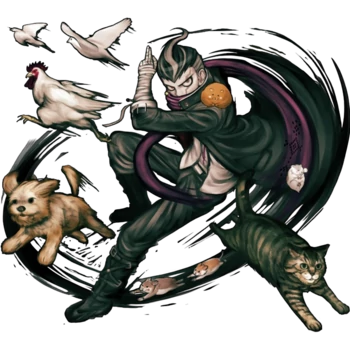
Oh my god. Gundham was just buckets of fun.
“FOUR DARK DAVAS OF DESTRUCTION! SAND-D, JUM-P, MAGA-Z, CHUM-P!” Oh man! I love the way this guy emotes.
Fun fact: I was convinced Gundham wound’t die because he had cute hamsters. I mean, his hamsters didn’t die regardless I think.
Gundham puts his scarf up when he’s embarrassed. That’s just adorable.
8. Nagito Komaeda
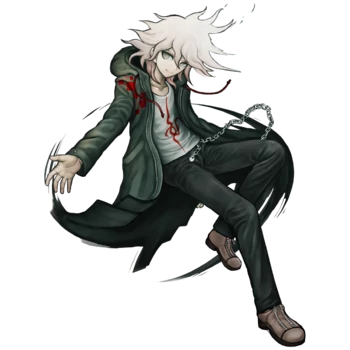
I just recently got into the Danganronpa so I’m not familiar with all the jokes and meme. With that in mind, I don’t really understand Nagito’s infamous meme status and how he’s comparable to Sans. I can kinda get it from seeing him in Goodbye Despair but I don’t fully understand.
The reason why he’s on the list is because I strangely find this pathetic sad-sack to be endearing. He tries SO HARD to be a stepping stone for the other characters and his self deprecation and constant tearing himself down was so fun to watch.
And when Nagito learns about the truth of the other ultimate, he gets even better. I don’t know but watching this pitiful, insane, individual try to act all arrogant is so funny to me.
His role in the overall narrative of Danganronpa was pretty interesting too. In the first game, hope and despair were black and white, good and evil. In Goodbye Despair, it was cool to see a little more nuance added and it’s shown that hope isn’t objectively good. The most extreme end of hope can be just as devastating as despair.
7. Genocide Jack/Jill
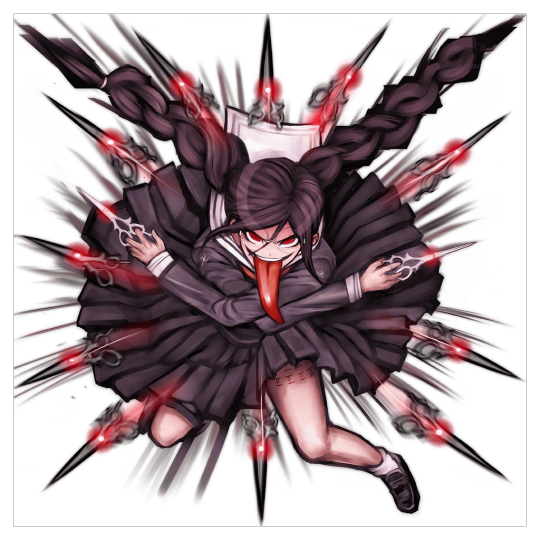
Ok, so it Genocide Jack or Genocide Jill? In Trigger Happy Havoc, The serial killer is Genocide Jack but she refers herself as Jill. But for the rest er series, it’s only Genocide Jack? WHAT IS IT?
Oh well. Genocide Jill was quite the surprise, taking a character I was indifferent to, Toko Fukawa, and turned her into something beautiful and crazy. Genocide Jack is super expressive, and wild, and funny, and I love her. The one sided relationship between her Byakuya was pretty entertaining even if it got a bit too gross.
Also that tongue tho.
6. Kokichi Oma
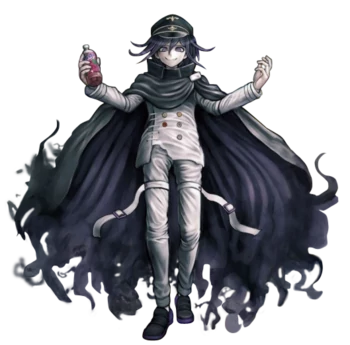
This guy, the freaking guy.
I love him. I don’t care what you say, he’s a good boy.
The way he emotes is just fantastic.
I think what makes me sympathetic towards Kokichi was his motive video. Turns out he isn’t some evil overlord, he just pulls harmless pranks with his friends. That made me feel really bad for him. Even if he was piece of shit.
The 5th case made me fall in love with him but really, I took a shine on him throughout the entire game. His insults are something out Glee but they’re still entertaining because they’re directed to the worst people like Miu. Fucking Miu.
Also his fake death was great.
Yeah, I know he’s a lying basted but look at him!

HE LOOKS SO SAD. AND WHEN HE’S SAD! I’M SAD! AAAAAAAAAAAGGGGGGGGGGGGHHHHHHHHHHHH
5. Junko Enoshima

This was a mind blowing reveal. Junko Enoshima, the character who died at the start and is quickly forgotten was the mastermind of the killing game. She fits the role of total despair perfectly, it’s so unsettling to see this girl talk about destroying the world and torturing 14 innocent teenagers while also being excited about doing it.
Her multiple personalities were also a treat. The fact that she changes her personally because she’s bored of her current one is just amazing. The regal one is my favorite.
That giant Junko at the end of Goodbye Despair... WOW.
But I will admit they kinda overused her. Seeing her in Goodbye Despair was a kinda neat but in Killing Harmony... Yeah. I was so ready get disappointed if Junko was the main villain a THIRD TIME. It she was, she would’t even be on the list. But while I’m glad she wasn’t, the teasing and the fake reveal still kinda soured Killing Despair’s ending for me.
4. Sakura Ogami
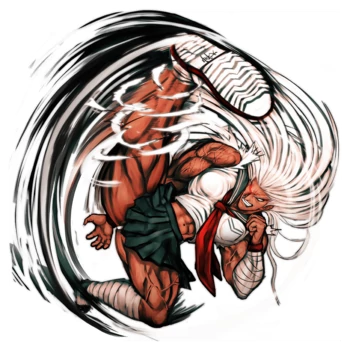
Overtime throughout Trigger Happy Havoc, my admiration for Sakura grew exponentially over time. She was definitely was the most mature of the entire cast of high schoolers, determined to keep focus on the goal ahead and despite her outward appearance, she was very kind.
Her friendship with Hina was great to see even if it made Hina try to kill everyone.
Sakura is the type of person where you can talk to her about personal issues and she’d try to help.
It’s so depressing how she was treated by everyone when she was nothing but nice, even if she was the traitor and planned to kill someone.
3. Kaito Momota
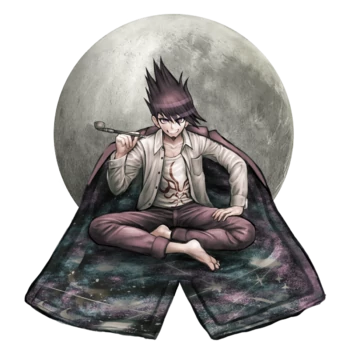
Spoiler alert. The last three on this list will be the best friend group from Killing Harmony. I couldn’t just pick one, they are all just amazing.
At first, Kaito seems like your typical filler character that gets killed off in early cases but boy was I wrong. His kind, supportive, and determined attitude to believe in his friends and survive the killing game was wonderful.
Kaito was the one to approach Maki and try to start a friendship, even after learning of her true origins. That just shows what a great guy he is.
His peak was undoubtedly the 5th case.
Kaito contracting that disease and fearing he not survive and get into space was heartbreaking. But that last “fuck you” to Monokuma during his execution was awesome.
2. Shuichi Saihara

Hands down, best Danganronpa protagonist ever. Makoto was ok, kinda unoriginal and bland design but was nice seeing him in Goodbye Despair and Hajime, actually he has an ever blander design LOL, but he makes up for with good writing and performance.
But Shuichi blows those two out of the water. Admittedly I was disappointed that Kaede was killed off and the protagonist role was switched to him because a female protagonist would have been amazing. But Shuichi proves himself to be something great.
First, him being the Ultimate Detective made a lot sense when he was figuring out these complex cases.
Second. his eternal struggle of figuring out the truth vs the truth harming others was so interesting to me.
Third, his relationship with Maki and Kaito was so fun and satisfying to watch and his brief friendship with Kaede was so sweet but sad to see end. It’s adorable that Shuichi accepts the role of sidekick to Kaito despite him and Maki knowing full well Kaito barely knows anything.
1. Maki Harukawa
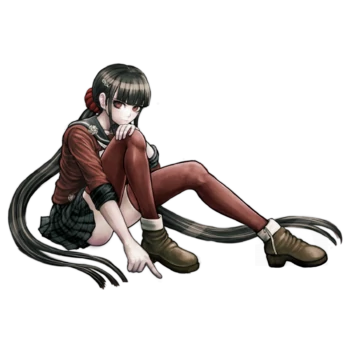
GIVE. MAKI. ROLL. A. HUG.
If Maki is upset, give her a hug. If Maki is happy, give her a hug. If Maki is threatening to kill you, give her a hug.
What started out as an cold, intimidating girl, became something amazing when Kokichi dropped this bombshell.
The Ultimate Assassin.
The name alone sends chills down your spine. A person like that someone you’d want to put as many doors, walls and continents between. But in a killing game that might be a bit difficult. Which is why Kaito tries get him, Maki and Shuichi to all form a blossoming friendship.
Maki’s con disaster backstory was really cute.
Her origins as the big sister of an orphanage and how despite the fact she’s a ruthless killer, kids still love her, that was really cute.
And how she talks about assassinations as if it were a mundane job was interesting.
Look. The point is, Maki is best girl and my favorite character in all of Danganronpa.
...
...
...
JUST KIDDING! NUMBER ONE CHARACTER GOES TO BYAKUYA TOGAMI!!!

BEST BOY! NO DOUBT!
HE DID NOTHING WRONG EXCEPT ALL THINGS HE DID THAT WERE WRONG.
FUCKING EAT IT BITCH!
#danganronpa#DanganRonpa: Trigger Happy Havoc#danganronpa 2: goodbye despair#danganronpa v3: killing harmony
4 notes
·
View notes
Text
[Death Note] Near: Anime vs. Manga Potrayals

I love Death Note. But, I have to admit that when it comes to the anime and the manga, the latter has my preference. This is for several reasons, primarily that it adds more detail, but another crucial point in which I favor the manga over the anime is Near's portrayal. I didn't think much of it at first, but when I read the manga, I couldn't help noticing just how different of an impression that Near made on me, as opposed to his anime counterpart. The more I thought about this, the more hate I saw Near get in the fandom, the more it bugged me.
Of course, there will always be those people who hate Near just for existing, pretty much, but the most common reason I saw for disliking Near was that "he was too emotionless", and "a boring, dull character. As I also found, many people who believed that also had not read the manga.
I have to say, unfortunately; in my experience, the anime's portrayal of Near did make him seem like such unless you dug really, really deep - almost irritatingly so. When I first watched the anime, I was on Near's side. For one thing, I found his emotionless persona to be cool and unique from most heroes in any series. For another, I really, really wanted to see Kira die, so...yeah. Despite this more favorable opinion of him, after I finished the anime, my love for Near was nowhere near (Death Note and its endless puns) what it is now.
In contrast, after I read the manga, I found myself much more invested in Near as a person. As I read the manga, layer after layer was added to the character of Nate River; by the end of it, Near was on the road to his current position as one of my favorite characters in any fictional work to date. After doing more analysis on him and discussing him with other DN fans on Quotev (thank you so much to all of those who analyze Death Note with me, I have so much fun during our debates about it and I've learned a lot of things), my adoration only increased. If I have to rank him in my favorite fictional characters (and believe me, I'm familiar with a lot of fiction, be it games, manga, anime, books, visual novels, you name it), Near would definitely be in my top ten.
I love that boy.
To put things in perspective, I'll begin with a list of similarities between Near's anime and manga portrayal (and I'm obviously speaking characteristics, not physical appearance):
1. His puzzle/toys obsession
2. His antisocial nature and complete lack of life skills
To be honest, that's pretty much all that I can recall that remains nearly identical between the anime version and manga version of Near.
Now, let's get into the differences.
1. His intelligence
Yes; Near is a clear genius in both the anime and the manga. However, the manga shows more examples of this. For one thing, Near's extremely complex explanations in the manga are nearly paragraphs of text long. The anime never shows him giving any such detailed analyses, which is probably part of the reason why there are those who complain that Near gets too much plot armor. For example, the infamous "figuring out who X-Kira is scene": I have to say, the anime utterly failed in that, if you ask me. The scene blatantly seems like filler and just completely unrealistic. I mean really - Near's eyes lighting up like his superpowers are being charged and hyperspace blurring behind him? Yeah...no. I can understand why that seems like plot armor. In contrast, the manga actually bothers to thoroughly explain Near's thought process and the evidence backing up his conclusion.
Also, there are two plans of Near's that are cut out from the anime (that I can remember):
- His plan to get the mafia to return the Death Note (if I remember correctly): (Confession time - I forgot the contents of this plan, aside from it requiring Light to pose as L and threaten the mafia somehow.) Obviously, coming up with plans takes intelligence, but Near appears to come up with this strategy on-the-spot, making it all the more impressive. Light cracks his own plan (that gets his dad killed, so touching) so it becomes immaterial, but it still shows the levels of Near's intelligence.
- His plan to get a member of the Task Force on his side: A.K.A. we see how badass Near is. He requests that a member of the Task Force meet with the SPK in person - that member turns out to be Mogi. As they talk, Demegawa unleashes the mob on the SPK's headquarters, cueing the "drop the money from the sky" scene. Now, this was a failed plan of Light's to take out Near and the SPK, but not only does Near counter this plan - he actually uses it for his own benefit. He orders Mogi to be bound and gagged to prevent him from making any noise, and when the Task Force contacts them to ask if everyone is safe, Near lies straight to their faces and says Mogi had a heart attack on the way to their new base - meaning, Kira is aware that Mogi is in the SPK's hands and is trying to prevent him from giving any information. Naturally, the only ones who know this are the Task Force and the SPK, which means that Kira is among the two groups. This is what ultimately leads Aizawa to ally himself with the SPK - the suspicion towards Light that reblossomed thanks to Near's machinations.
2. His snarkiness
So, in both the anime and the manga, Near has some snarky moments, though significantly more in the manga. However, in my opinion, the anime left out the most significant snark from Near in the series. When Light comments that the SPK members all died despite Near's best efforts (this was after Sayu's kidnapping, where Mello acquires the Death Note and kills most of the SPK), Near replies, "Yes...I was somewhat prepared for this the moment you handed over the notebook, but it sure does hurt." He throws the implied insult back at Light's face (who is the placeholder of L at that point in time). Near shows more willingness to take the initiative and be a little more aggressive in the manga (given the fact he snarked off at L the Second). In fact, the second one of the plans cut out of the manga that I mentioned earlier also shows this difference between anime and manga Near.
And now, we arrive at what is my biggest problem with Near's anime portrayal -
3. His humanity
I can actually understand why anime-only people saw Near as a soulless robot. The anime does not provide any show of emotion from him whatsoever unless you dig ridiculous deep into the situation to the point where you almost feel like you're reading too much into things. Near is not a robot - he is a human being, and on a human being, this is simply unrealistic. On the other hand, the manga cleverly throws in subtle nuances that lead you to question and analyze Near's softer sides without directly showing them to you. It adds a much more interesting spin to his character and makes you question what exactly caused him to become the way he is - all in all, the manga's portrayal makes Near much more interesting than the anime's.
Let's begin.
- The mass murder of most of the SPK
Alright, so Mello writes all the names of the SPK that he has access to, promptly killing them. In the anime, Near simply sits in his chair with a stone-cold expression, and doesn't look at all concerned as his colleagues literally fall to the ground, dead, around him. By contrast, in the manga, he actually looks pained. From the way his gaze is intently focused on the dice structure and his bothered expression, it's almost as if he doesn't want to look. Obviously, this makes for a much more relatable and realistic character in the eyes of the audience - showing visible pain at the death of his coworkers. It also makes you begin to think about Near's character specifically because he seemed so emotionless. We're introduced to Near and see how devoid of feeling he seems to be the first few chapters of his appearance, and then bam - he's clearly upset as his colleagues die. At least for me, it got me thinking about Near's more human sides
- His interactions with his subordinates
Near's interactions with the members of the SPK remain largely the same in the manga and the anime. In my opinion, though, two important scenes were cut out from the anime that adds a lot more to Near's character. For one, there's the scene where Near disbands the SPK officially and explains that they'll now have to operate as an underground organization. He goes on to warn his subordinates of how dangerous their positions will be should they choose to continue under his lead, as he will keep trying to catch Kira. This is significant to me because he actually offers them a way out. Going even further, he admits that he's afraid - "I'm scared, so I'm not going outside". This ability to understand and sympathize with the possible fears of those who work under him adds yet another layer of complexity to Near - he prefers to seem almost inhuman and strange and his behavior, but has no trouble admitting to a very human quality - fear. I should also add that this line is refreshingly vulnerable in a way, meaning that Near is close enough to and trusts his subordinates enough to drop the facade at least a little.
It also displays his capability to see through and grasp the perspective of others emotionally and not just pragmatically. This is something that I find Light, and to a lesser extent, L, to be lacking in. They can both accurately predict the next moves of their opponents by putting themselves in their foe's tactical situation and practical mindset, much like Near. However, unlike Near, they fail to do the same when it comes to more sentiment-based areas.
And the other interaction is when Near admits that Mello is dangerous, but he also remarks on his belief that his subordinates will be fine. "That may very well happen. But I have faith in your excellent skills."
As you can tell from this quote, Near praises his subordinates for their abilities. Unlike L or Light, who use the Task Force/Kira followers like chess pieces almost all of the time, Near allows his subordinates some freedom in their actions. Notice that he doesn't tell them exactly what to do should Mello try something - he simply states that people of their caliber will be able to get out of a difficult situation. This is very different from the condescending way that L and Light tend to treat people working under them. The Task Force/Kira's followers are older than L and Light, yet they treat them like children because they know that their intelligence is inferior in comparison to their own. This shows a blatant lack of respect. In contrast, Near, despite knowing this, respects his subordinates and holds them in high enough regard to give them free reign over such things. It may also be influenced by the fact that Near is aware that despite his ingenuity, he is still a teenage boy and his subordinates likely have more general life experience than he does. And we as humans tend to hold the opinions of our elders in high regard.
- His words about L
In the anime, Near doesn't say much about L at all. There's barely anything suggesting that he feels any kind of attachment to L - in fact, it seems as though he actually doesn't see L as all that great. In the manga, however, either Aizawa or Mogi calls Near out on his use of borderline illegal methods. His response is, "For Mello and I, L is the only person we adore, and the only person who deserves our respect. And the one person we respected was killed by Kira, so we're willing to use any methods necessary to defeat him...don't you think it's only natural for us to feel that way?"
This quote proves two things about Near. First, he did respect L. Second, it reflects on his humanity once again. Near is basically saying that it's only natural for himself and Mello to want revenge on Kira for killing the one person they respect. The desire for revenge is also a very human trait, and the fact that Near shows a deeper understanding of such matters says a lot about him.
- Speaking of everyone's contributions
In the anime, Near states that his victory is thanks to Mello. In the manga, he elaborates upon this, giving credit to the people who had a hand in defeating Kira and placing special emphasis on Mello - basically, he's indirectly thanking all of them. This is already interesting in itself, but what really stood out to me is the way Near dismisses any contribution he made to the case. Even though he provided the backbone for the defeat of Kira during Death Note's second arc (without his initial plan, nothing anyone else did would have meant jack shit), he gives himself no credit. He seems to place more value on his gratefulness towards the others for helping him rather than savoring the feeling of his own success, which is, to me, an admirable trait.
- His reaction when Light tries to write his name on a scrap of the Death Note
Light, sneaky little bastard that he is, managed to write 'Nate Rive' on the scrap of Death Note paper that he had hidden in his watch. One more letter and Near would have...you know, died. The thought is too painful.
We never do see Near's reaction to this in the anime, which I found almost offensive. Seriously, Near almost died and his reaction to his brush with the grim reaper isn't even shown? By contrast, the manga shows that he's alarmed. Though he regains his composure within the next few seconds, the single panel of his shocked expression was all that we needed. It's very understandable, as a human being, to fear death. The fact that Near showed surprise at the very least when he came close to meeting his end makes him more relatable.
And finally...
- Eating chocolate at the end of the manga
When working with the Task Force to solve a new case some time after Light's death, Near is seen playing with his toys and...eating a bar of chocolate. For one thing, this is an obvious way to honor and remember Mello. This alone is touching, as it shows that Near really does miss Mello and wish that he hadn't perished.
But recently, a friend of mine pointed something out that I hadn't thought about before (I love hearing her theories about Death Note, they're always so insightful and well thought-out, not to mention that talking to her is just enjoyable in general). Chocolate is a commonly known stress reliever, and Near is now the new L. Him eating chocolate at the end of the manga, in his new position, could be signifying that he is, understandably, like any sane person would be, stressed out. He now has to bear a considerable burden on his shoulders for the rest of his life as the new World's Greatest Detective.
So, there we have it, my rant analysis on my problems with the anime's portrayal of Near. Overall, the manga just made Near a more complex and interesting character. Thanks for reading.
#death note#near#nate river#death note analysis#near analysis#nate river analysis#this is all my opinion#l lawliet#light yagami#the task force#the spk
95 notes
·
View notes
Text
Air: “Endgame”

Eleven episodes and a two-week hiatus later (oops!)~~
My praise, my wishes, and my feelings of the season finale of Book I.
[Heart eyes.]
Oh, Bo. What would we do without you.
As always, he gifted us with his silly and endearing humor,
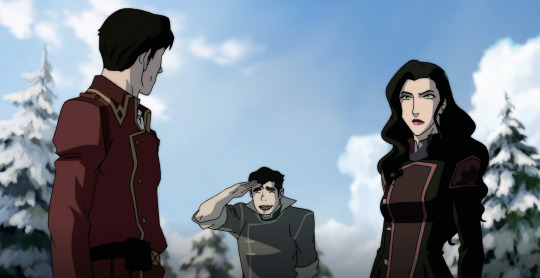
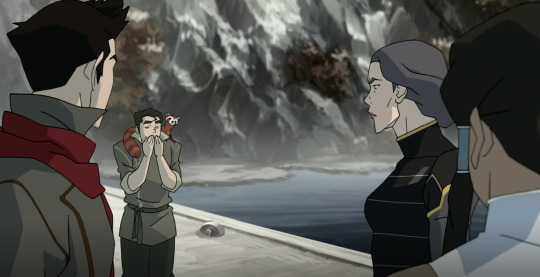
but he also starred in some fantastic collabs.
Bolin x Naga
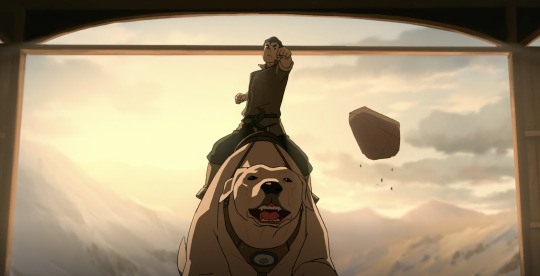
Bolin x General Iroh

Honestly, Bolin x Any Character <--- now that’s my kind of ship.
General Iroh is just as stupidly fearsome and heroic as his grandfather.
This is fact.
His stunt with the planes?
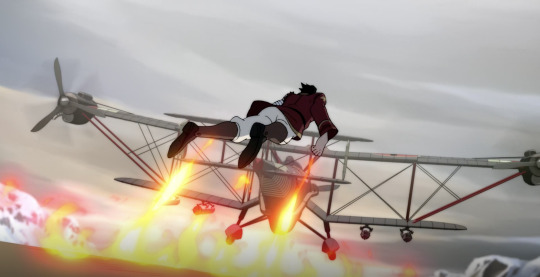


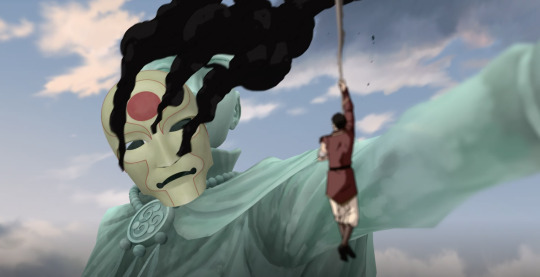
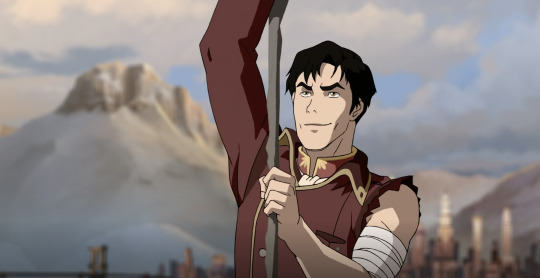
Cray.
I’m looking forward to seeing more of him in the future, preferably in the same scene(s) as Zuko because that’s something I desperately need in my life.
My favorite Mako: protective and powerful.
Let’s not forget, he can break free of Noatak’s bloodbending!!!

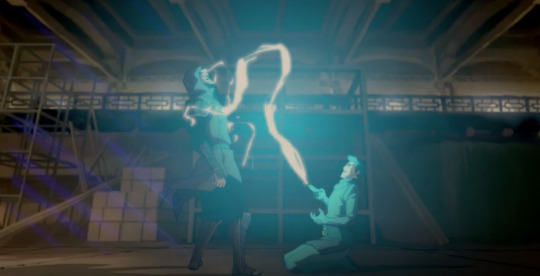


Korra---the freakin’ Avatar---couldn’t even do that! At least, not at first.
Amon admits it himself: “I'm impressed. No one has ever gotten the better of me like that. It is almost a shame to take the bending of someone so talented.”
I hope Mako’s talents become focal points in the next books. Please, oh please don’t revert him back to a frustrating, lovesick puppy who can’t make up his damn mind. It really doesn’t do his character justice.
Speaking of lovesick puppies...
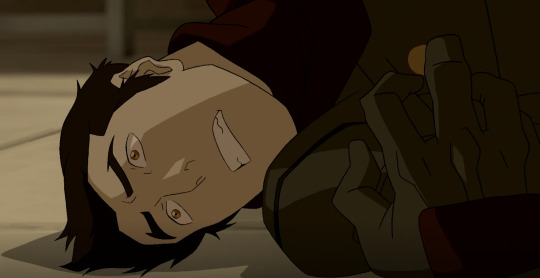
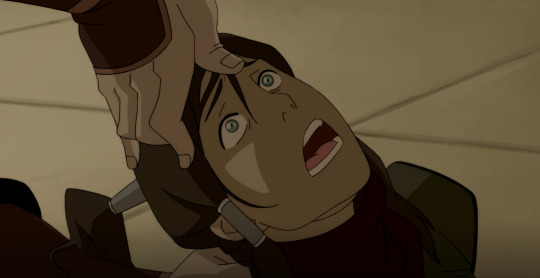
Without a doubt, Mako and Korra had the most compelling scenes of the entire episode (and not because they were fighting Noatak).
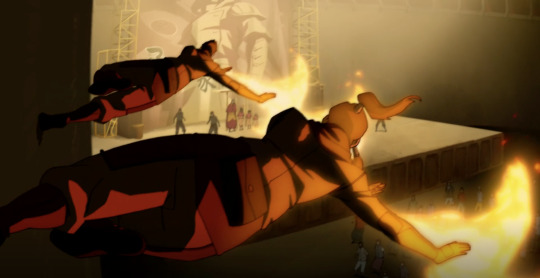
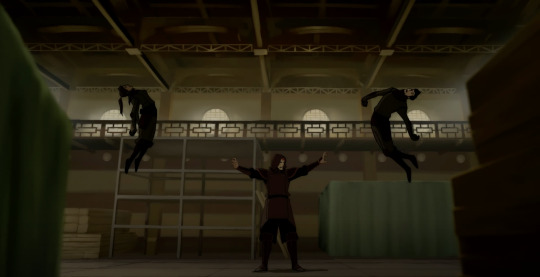

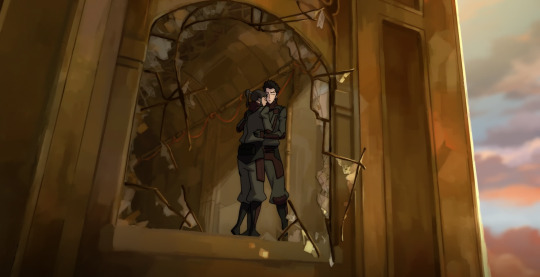
Canon couple or not, these two make a great team. They obviously care about each other, but they’re fiercely protective of one another as well, and that’s what makes their chemistry so palpable.
Although I wasn’t over the moon about dropping the love bombs, even I recognize how heartwarming their moments were.
Take, for example, the penultimate scene of the finale:
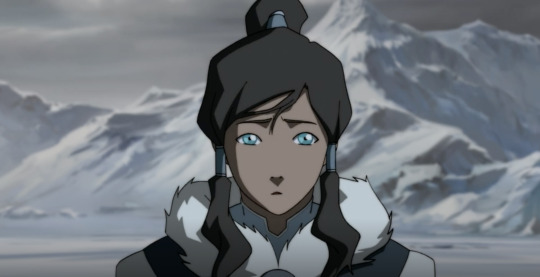
Recap: Mako tells Korra he loves her, Korra dramatically runs away with Naga, and Tenzin tells Mako they have to be patient with her, which is old people code for “give her some space.”
If you ask me, that’s shitty advice.
In real life, I want someone to go after me, even if I say I want to be alone or I tell people to go away.
Yes, I am that person.
So you best believe my heart SOARED when the boy chased after the girl:
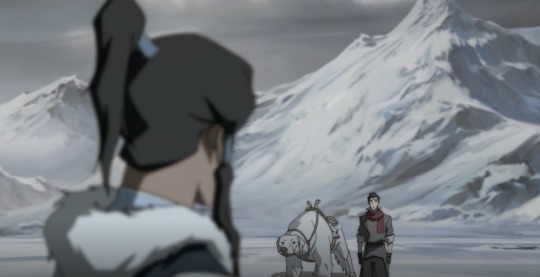
At first, Mako’s shocked.
No surprise there.
He just witnessed Korra in the Avatar State, which means 1) her bending is back and 2) the Avatar State is no joke!! The glowing eyes!! The command of the four elements at your fingertips!! That’s hardcore, bro!!

But then he fondly smiles at her, which I wholeheartedly interpret as “Ah, yes. That’s my girl.”
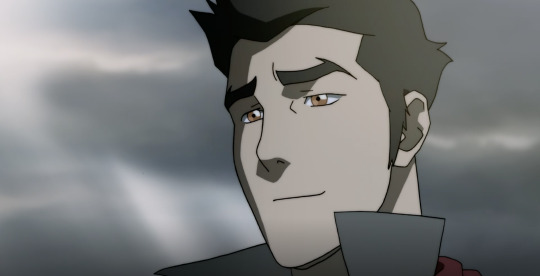
And look at her face!!

These two aren’t endgame, so I’m allowing myself to savor in the swoon.
FYI: If there’s anything you should know about me, it’s that I’m a sucker for cheek caresses.
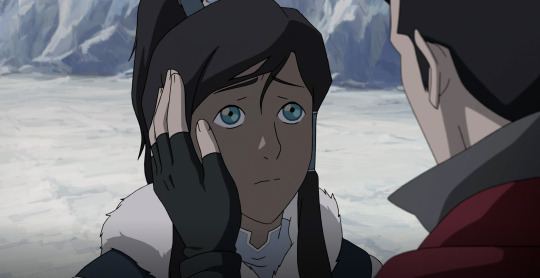
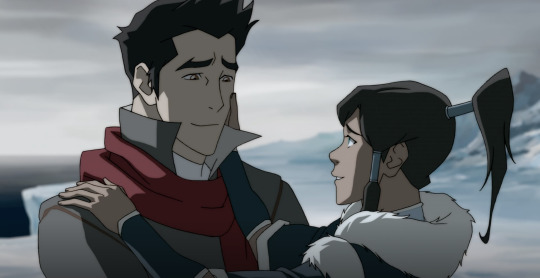
Twirling hugs also make me a lil weak in the knees.
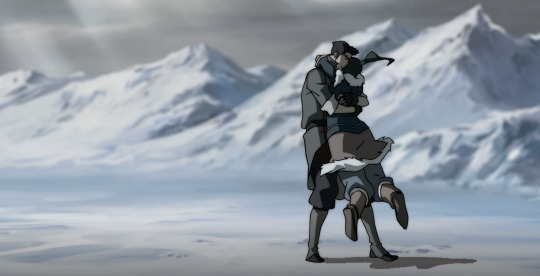
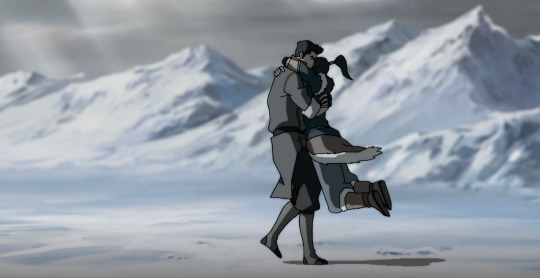
Running to someone and barreling into their arms is just stupid cute.
[Heavy sigh.]
I was really rooting for Asami.
After Chapter 7, I thought we were going to see how Asami was coping with the reveal of her father’s conspiring nature. Instead, her character seemed to revolve more around the love triangle (or whatever shape you want to call the ridiculous Asami x Mako x Korra situation). When Asami does mention her father, it’s only a sparse comment every other episode or so.
Thus, the showdown between father and daughter lacks an emotional weight, and it’s partly because we haven’t explored enough of their relationship to truly feel for these characters.
That isn’t to say their sequence doesn’t have powerful moments.
I just want to take a moment to holla at ma boy @Jeremy Zuckerman, sole music composer.
Your music is always stunning, but the accompanying track in Asami and Hiroshi’s showdown (plus the music in the boat scene and everything in the third act) is what carries the entire segment.
Your melodies tugged at my heartstrings in ways the story couldn’t.
Their final fight, for instance:
Asami is so caught up in the battle---defending herself against her father, no less---that you think she might actually do it, she might actually hurt him.
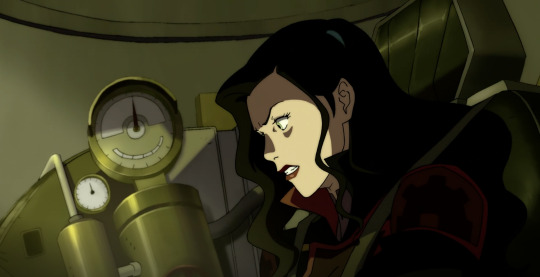
But then he’s looking at her like this,
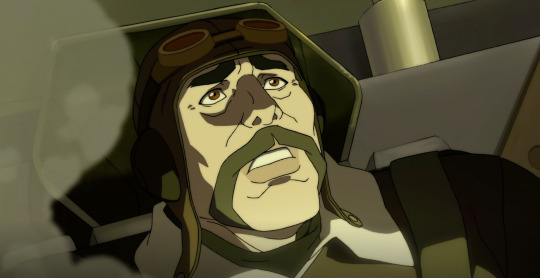
and she starts to hesitate (this is her father after all),
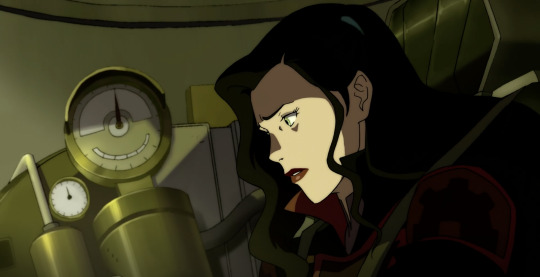
which is the exact moment Hiroshi strikes.
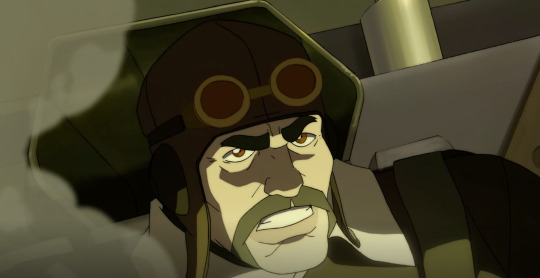
In the end, Asami captures her father, but not without remorse: “You really are a horrible father.”
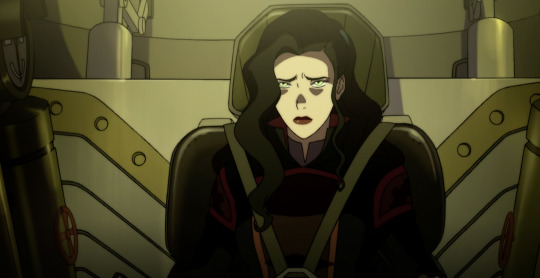
Dear Creators,
Please give your characters the emotional depth they deserve and explore the nuances of their relationships.
Trust me: they can lift the weight of their stories just fine.

I am unbelievably disappointed in Noatak’s arc.
I just---
I mean---
How?
How are you going to build the foundation of a character on a lie?
How are you going to develop that character’s arc for ten episodes, then discredit almost everything with deceit??
How are you going to completely undermine your character like that???
And to add insult to injury, Noatak keeps lying, going so far as to reveal a fake, painted scar:
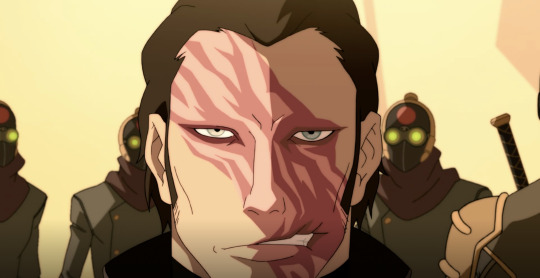
Here’s the thing: Zuko is my world.
Of all the characters from Avatar: The Last Airbender, I found pieces of myself in his story the most. Scars, then, are sore subjects for me; sometimes, I feel like I’m as sensitive about his scar as he was.
Yes, I jumped in my seat upon first seeing Noatak’s “scar,” but make no mistake---I’d rip that lie off his face in a heartbeat.
Undermining your character with lies is bad enough, but this shit felt like mockery, and while I’m certain that wasn’t the creators’ intents, I’m taking it personally anyway.
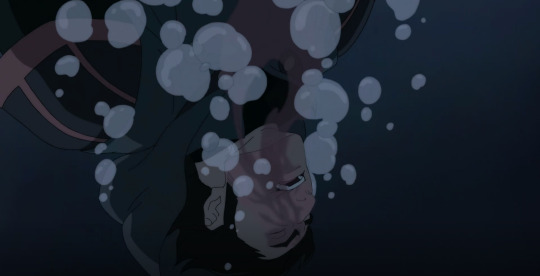

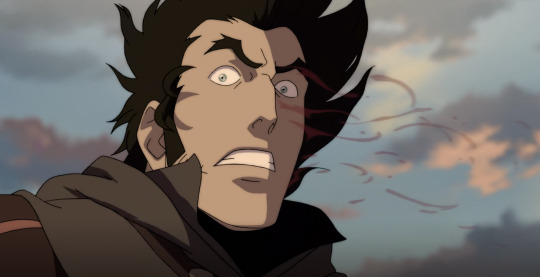
However, attention should be paid to Noatak’s last scene:
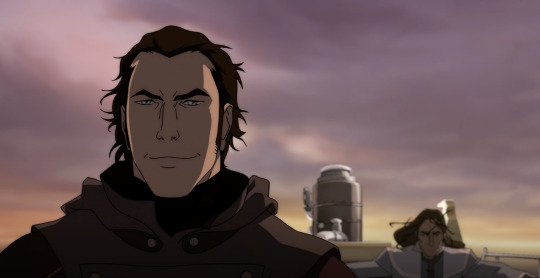
Again, the music is so beautifully somber, but the dialogue here is probably some of the episode’s best.
From Noatak’s “I had almost forgotten the sound of my own name,” to Tarrlok’s "It will be just like the good old days.”
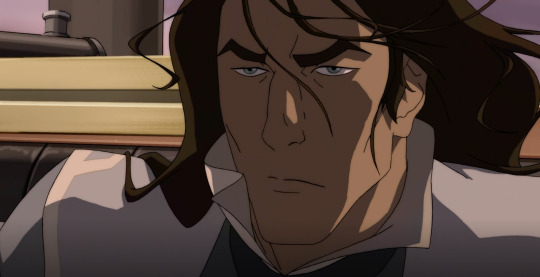
From the tear that rolls down Noatak’s cheek,

to Tarrlok's decision to sacrifice them both.
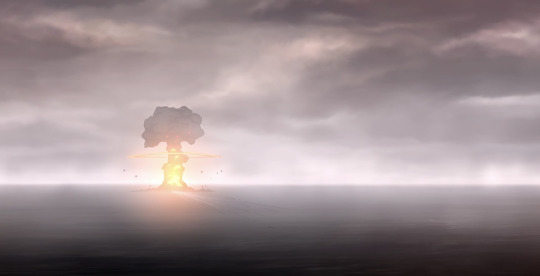
It doesn’t make up for butchering Noatak’s arc, but this was, quite simply, a beautiful ending to a sad story.
Dear Creators,
Please don’t make the same mistake twice.
You compromised the integrity of your character the moment you sacrificed a fleshed out plot for woaw!shock factor.
Villain or not, he deserved better.

Also, I CAN’T BELIEVE YOU.
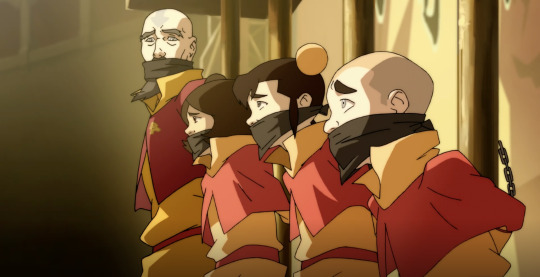
It was at this moment that I wanted to jump into the screen and rescue Tenzin and his beautiful children myself.
LOOK AT THEIR FACES.
I WAS SO MAD.
LIKE:
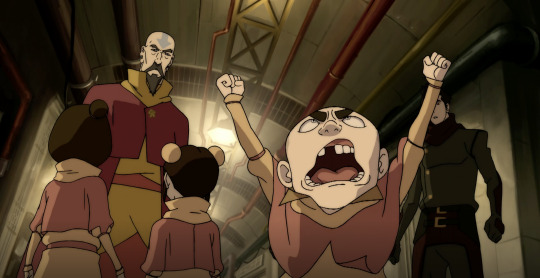
HOW COULD YOU.
It should be said: I loved Korra in this episode.
I mean, she was pretty daft to think that hiding under a table would keep her safe from a bloodbender. A bloodbender (a psychic one at that) can feel your blood, Korra, of course he knows you’re under there.
So just for that:
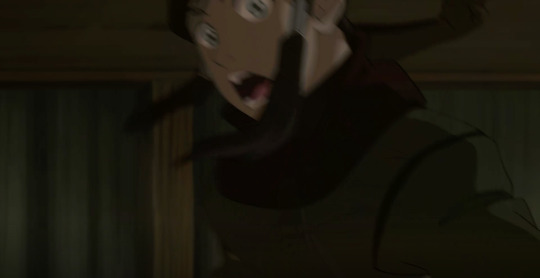
Yeah, don’t you look all silly and fuzzy.
Aside from this idiotic little slip, she was pretty badass, unlocking her airbending and fighting against Noatak’s bloodbending:

What a crappy screenshot of her airbending, haha. Would you believe me if I said this was genuinely the best I could do?
And unlike Asami and her father, I actually felt for Korra. I was devastated when Katara couldn’t repair her severed connection to the other three elements.
Though I wonder if I felt more for Korra because she acted just as I would. That is, she’s clearly distraught over losing her bending, but she wants to spare her friends and family the trouble of making a scene:
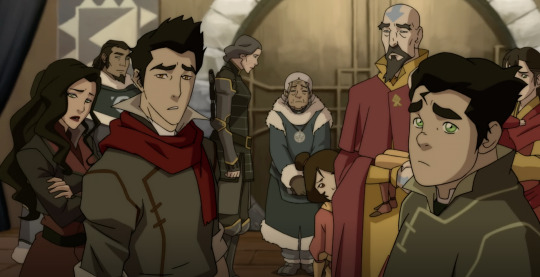
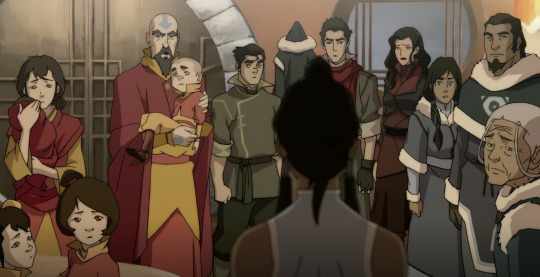
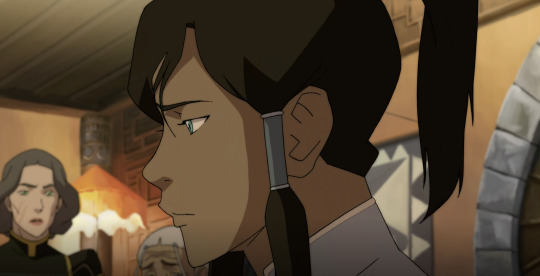
So she waits until she’s alone to let it all go:

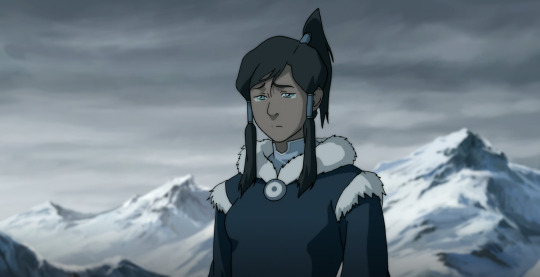

:’-(
As I said, I loved and felt for Korra in the finale, and I don’t have a problem with her...
I have a problem with the writing.
Korra’s airbending was very badass, but I completely forgot about her airbending struggles.
The first four episodes show Korra’s conflict with the element (i.e., it’s literally the plot line of Chapter 2). If anything, these episodes have small moments that remind us of Korra’s airbending training---practicing in the temple’s courtyard or doing exercises with the kids, to name a few examples.
Then, in Chapter 8, Tarrlok insults her with the “half-baked Avatar” comment, snidely remarking on her less than satisfactory airbending. It’s in this same episode that Korra reminds Tenzin---and the audience---that she’s never been able to connect with her spiritual side. (More on this later!)
And... that’s it.
After the eighth episode, she’s kidnapped by Tarrlok, who reveals himself as a bloodbender; she’s rescued but then Amon and Hiroshi attack Republic City, separating Korra and the teens from Tenzin, his family, and Lin; Korra decides to take Amon on her own (but not really because Mako decides to tag along) and the two of them bump into Tarrlok, who reveals that Amon is actually his long-lost, waterbending, psychic bloodbending brother, Noatak.
It’s not necessarily a bad thing. If the creators were prioritizing awe! and shock! and woaw!, then unlocking Korra’s airbending this way definitely did the job. But it felt a little too... convenient? Plus, there was no explanation for why her airbending worked when it did.
I mean, saving Mako obviously had something to do with it, and they didn’t have time to get into the details because, duh, they were trying to restore Korra’s bending.
Still, the audience shouldn’t have to interpret everything.
(Or perhaps I’m just being petty, lol.)
For a book titled after the element, I guess I just expected more.
Ultimately, I wish we saw Korra practicing more airbending; I wish we got an explanation for how and why she airbended when she did; I wish her success in unlocking her final element had not been overshadowed by the loss of her water-, earth-, and firebending.
Which brings me here, to this special moment:
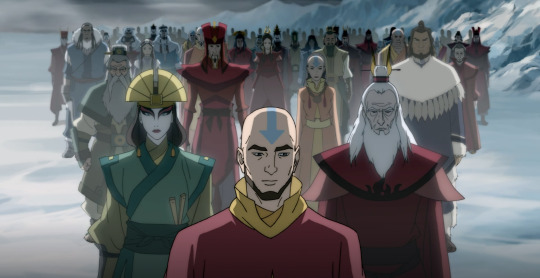
I cried.

100%.
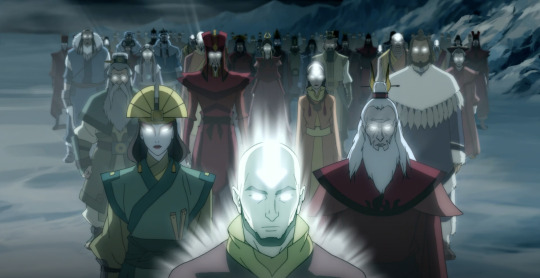
And the gentle, yet all too familiar Avatar theme playing in the background? Yeah, I was a puddle of tears.
However, as nostalgic as this was, I wasn’t too pleased at how quickly Korra’s bending was restored because it felt like the creators were taking shortcuts again.
For the record, I like that Noatak took Korra’s bending away (though I would have liked a more epic battle?), as it debunked the whole “the Avatar is invincible” concept. But, really? A quick touch of Aang’s fingers and her bending is restored, just like that?
Maybe it’s just me, but I would’ve loved to see Korra struggling to get her bending back. Perhaps we could’ve seen her retraining and relearning the other elements, which is something I still feel we were robbed of.
Furthermore, as much as I enjoyed seeing Aang and all the former Avatar reincarnations, I didn’t like that this was also the moment Korra connected with her spiritual side. Similar to her airbending moment, I forgot about her spiritual struggles; the issue is last mentioned in Chapter 8 and, before that, all the way back in Chapter 1. But, honestly, I think the ease and convenience of this moment lends to the problematic pacing of Book I as a whole.
Dear Creators,
While I thank you for restoring Korra and Lin’s bending, please don’t resort to convenient endings. I recognize that you only had twelve episodes, but please, no more shortcuts.
Your story will suffer.
Your characters will suffer, too.
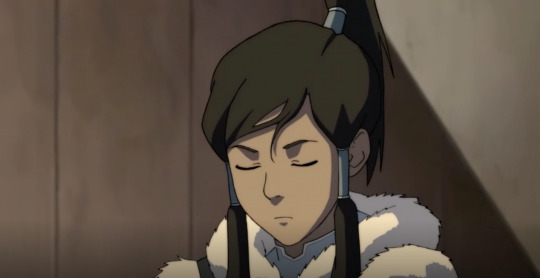
p.s., I’m sorry for being so mean to you. I have a lot of feelings, is all.
Cheers to Book II, though!
Parting Thoughts
Before sitting down to write the finale’s review, I took a two-week break.
In that time, I rewatched (and re-rewatched) the entire first book.
I even had time to indulge in the fifth season of The Great British Baking Show.
Shameless Plug:
I absolutely recommend this charming baking competition.
You learn quite a lot about the science and precision of baking, endure (but also adore) countless baking puns, and witness what true competition looks like. That is, genuine camaraderie, rooting for your fellow bakers to succeed, and sometimes, lending them a hand if they’re pressed for time.
Warning: do not watch late at night. You will reach for a baguette.
And yet, I still feel meh about Book I.
The season has its share of success: the music is as impeccable as ever and the technological and industrial components of the Avatar-Korra universe are developing and expanding nicely.
However, it will always come down to the story, and the writing just wasn’t up to par.
Truthfully, the real triumphs are the characters, who---after only twelve episodes---have built a home for themselves in my heart:
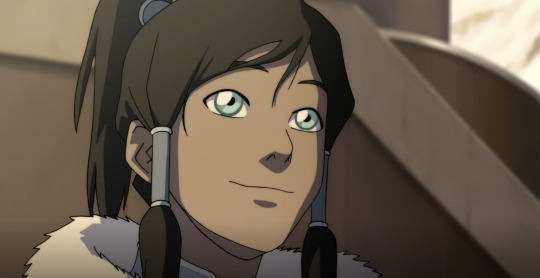

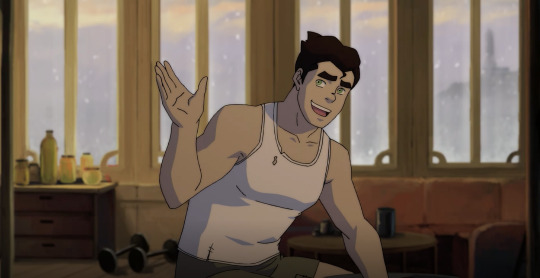
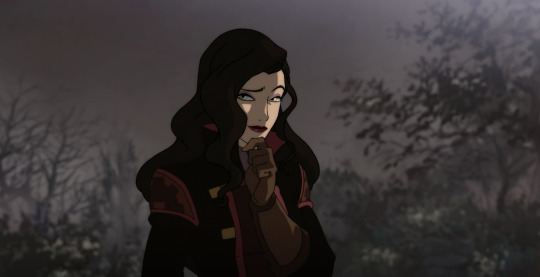
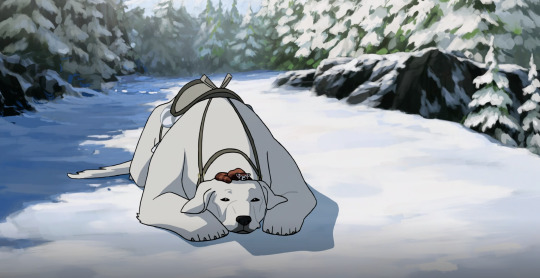
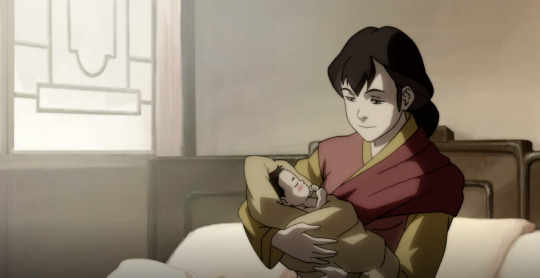


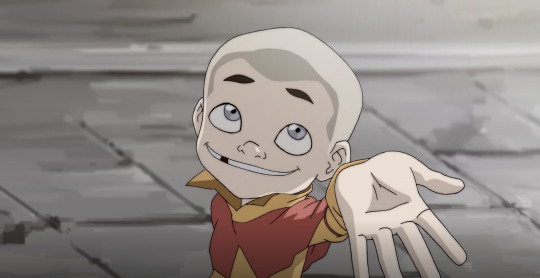
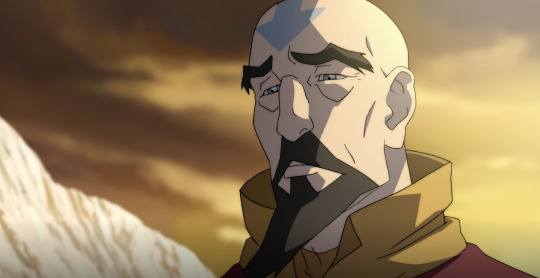
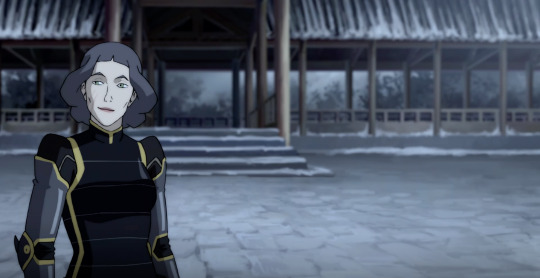
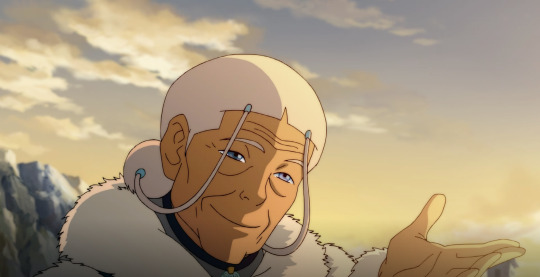
Although, our bright, blue-eyed Avatar still has much to learn.
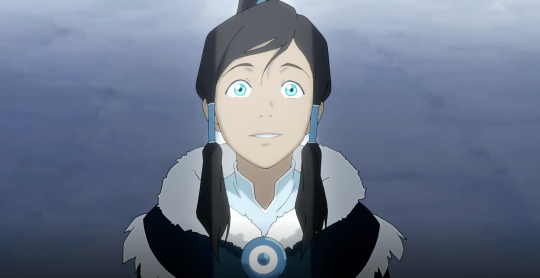
(i.e., how to stop being an impatient little dumdum)

But take heart...
Her story’s only just begun.

From Beginning to End:
“Thanks for looking out for me, Aang.”

credits
1 note
·
View note
Text
So, um, Legion season 3.
Obviously huge spoilers ahead.
So season 3 goes full tilt into David being a narcissist and a bad guy (although to the show's credit they did it more subtly than I expected. David never actually becomes the destroyer of worlds, the evil acts he commits with his powers are mostly in manipulating people's minds when he can't deal with anything negative. Which is a good analogy for why a lot of abusers who become that way because of trauma and abuse do what they do. I still don't buy the way he got there as a character though. The show seemed to occasionally be suggesting that he had multiple personalities, and I understand that comes from the comics, and I could possibly even buy that the "Legion" persona, the narcissistic person who believes that "nothing that hurts me is real", is distinct from the David persona that we saw in season one, as psychologically dodgy as that is.
And I do think the show was TRYING to address the issues of abuse and redemption and how sometimes you can't save everyone and how shouldn't try to save abusive men. They never had Syd go back to David or forgive him for what he did to her, as hard as it was for her.
But that's also hard to reconcile with the rest of the way the show treats the topic of abuse and mental illness. Okay, so the show spent the whole season telling us that David's desire to rewrite the past was a symptom of narcissism (true) and what made him a villain (okay) but then in the end they had him...get what he wanted anyway? And present it as a good and hopeful ending?
The fixation on David's biological parents was definitely narcissistic, but then it seemed like the show actually brought into it in the end, which made no sense. After season two I felt like this show insulted me as a viewer and now I feel like it slapped me in the face again and tried to convince me I was stupid for believing what was presented onscreen. Which, okay, it's Legion. The show has always run on the idea that nothing you see onscreen might be real, but there has to be some narrative grounding somewhere.
I didn't like the suggestion that all David needed in the end was to be loved by his biological parents. I go pretty hard on nurture vs nature usually, but the thing is...he had loving parents before. His adoptive family loved him. They didn't understand him, which led to a lot of his trauma, but...that's life. X-Men and all its properties have always been about the trauma of living in a world that doesn't understand you. And Legion season one said that's okay. It doesn't make you a bad person. Season two said, well, actually, it does. Season three said you can fix it by resetting the whole thing. The show tried to say that the other characters weren't acting from the same narcissistic place as David was, but David was still never held accountable and never had to actually deal with his shit, because everything just got reset like he wanted it to.
Oh? Also? The show's insistence that some people can't be redeemed would have made much more sense if they didn't try to convince us not only that the mentally ill protagonist was bad all along, but that the Shadow King actually became a good person! That was completely ridiculous, narratively unearned, and insulting. David doesn't get redemption because of his abusive actions but his abuser, who the show had built up as totally sadistic, does? Because he said he loved David? The show said no to one abusive love story but then gave us another. The show demanded that David be held responsible for things that (in season 2, at least) weren't his fault, in order to make him a villain, but then they never held the Shadow King responsible at all. I think the show was trying to say that the Shadow King got redeemed because he chose redemption, but there was still no build up. Yeah, he repeatedly said that he loved David but you can love someone and still be abusive to them, and whatever the Shadow King felt for David was never shown as anything other than extremely toxic. The hypocrisy of the Shadow King showing us David's life to show his newfound empathy when during all those scenes he was the one who destroyed David's life was bizarre and offensive.
Speaking of troubled relationships, the show's increased focus on David and Syd didn't work, either, because they never felt like a believable relationship in the first place. I liked it in season one largely because it hit my hurt/comfort kink, but as I said before, it also came across as a male fantasy and an unbalanced relationship. From the beginning, he was emotionally dependent on her because she literally saved him. I saw a gif of the scene in the first episode when she saves him from the anti-mutant organization, and when she's holding out her hand to him, there's a flash of her as she was in the mental hospital, holding a hand out to him as he was in the hospital, and in both scenes she is standing over him and offering a hand to help him up. I remember noticing it at the time but thought it was an indication that what was happening was maybe in David's imagination. But I think the meaning is more symbolic, and it's really a brilliant visual way of showing the audience how David sees her, as someone who not only saves him from literal danger but who saves him from his life in an institution, saves him from the schizophrenia narrative, from himself. And given what happens later I feel like the show wants me to think that David was the unhealthy one in the relationship all along, and I want to tread very carefully when I talk about this because I've read some discussion and it seems like there's a lot of discourse over whether David actually raped Syd. And I want to make it clear that he did and that she shouldn't be blamed for it in any way. I also think that it never should have been her responsibility to fix David. But she was the one who told him in season one that she could fix him. In fact, she was the one who told him that he didn't need fixing.
I saw somewhere someone say that season one Syd was like David's medication, and season two was him going off his meds. But first of all, women are not and should not be responsible for fixing unstable men. And second of all, that wasn't what happened onscreen. In season one, Syd was like the manic pixie dream girl that told David he didn't need his meds. That what he thought was a problem was actually a super power.
That relationship worked when it seemed like they were both unstable (their initial meet cute and "Do you want to be my girlfriend?" "Okay, but don't touch me" works in the confines of the mental hospital, but as the grounds for a real relationship it doesn't work, on both ends. Syd never explains to David why he can't touch her until it's too late, and then she's all "this isn't a problem we have to address in our relationship, it's a super power!")
If season two is David going off his meds it's because his girlfriend literally told him he didn't need them, and then at the end of season two it's like "just kidding, plus you're the one in the wrong for not accepting that you're ill." God.
Again, that does not change the reality of what he did to her or make her somehow not a victim, but I still think the narrative had to twist things in unbelievable ways to get him there, and part of that was some bullshit regarding his relationship with Syd. And it's not that she's at fault, I think it's more that she's not written well. She does the "you left me, you don't appreciate me, also I'm irrationally jealous" thing that women written by men often do in fiction to advance a male character's plot and provide conflict. Like, he literally gets kidnapped (by her from the future!) and she accuses him of leaving her?? She tells him to lie to her, won't tell him why except that if she loves him he'll do it, and then tells him he's sick and doesn't really love her when he does those things? Like, maybe this is a commentary on what happens when two broken people initiate a relationship, but in the end the show definitely tried to present Syd as the healthy one and David as the "crazy" one. Again, I'm not saying Syd was really the abuser or whatever junk the man-boys of the internet are putting out there, but I am saying this narrative frustrated me a whole lot.
One commentary I read which I do agree with is that the show went off the rails when season two flipped the script from seeing the world from David's fractured perspective to presenting us with a crazy outer world instead of a crazy inner one. Which on one level I understand why, because it's hard to create a sustainable TV show with the premise of this show. Once David figures out that his powers are real it's hard to maintain the "is he crazy or not" narrative, so at the beginning of season two it's largely dropped, as is the conflict of David struggling to control his powers. Then at the end of season two the narrative becomes "he actually is crazy but in a different way, and now he's powerful and that presents a problem." Which, on paper, okay. But I really feel like the show missed an opportunity to show David struggling with the aftermath of finding out his powers are real, picking up the pieces of his life after the Shadow King is gone, and really dealing with what happened to him and what he is. That would have been a compelling and weird and wild journey without the constant narrative fake-outs. Maybe it's because I read him as a trauma victim in season one more than anything. Or maybe it's because of how season two introduced a lot of elements that I hate in fiction (time travel, self-fulfilling prophecies). But I do think that season one, even with its faults, presents a nuanced and empathetic picture of mental illness and healing that ultimately isn't delivered on.
But, the stylistics of this show! The dance numbers!
0 notes
Text
Weekly Anime Rambling Re: Creat...ive Conceit
Another week of getting everything mixed up because my viewing schedules are a disaster hahaha! is it very obvious i’m running out of puns
The season’s drawing to a close, and it looks like every show is rushing at full-gear to wrap up all their loose ends or end on a good place before the season break. Which means a lot of shows are doing shitfests and I have A LOT OF WORDS
I haven’t talked much about Fate/Apocrypha in this feature but I must shamefully admit I’m enjoying it way more than I expected. I’ll talk more about that in my final season rundown, so for the time being I’ll just say Astolfo is my waifu and if you use the T slur to refer to them I’ll gut you alive.
One show clearly struggling to meet its planned middle-point is Altair, with the past two episodes breezing through plot points like a speedcourse on acquiring new party members for Mahmut. The production itself is also clearly suffering, finding an in-model shot of any given character woud be a challenge. I did like the latest episode because we’re finally getting to see more political nuances beyond “Evil empire wants to conquer the world”. I also really liked how they brought the Prenses into the fold by emphasizing her importance in the political moves they’ll carry out next, and that she was the one to come up with them was specially great

Giving female characters agency? What, Like it’s easy?
I’m not even gonna talk about episode 10 of Ballroom because it was so boring I hardly remember anything about it except thinking “is there ever gonna be any dancing” (the answer was no). But I am going to talk about episode 11 because god was it frustrating.
Firstly, this was the episode that featured the most and probably best dancing animation of the entire show. Unsurprisingly, even then it’s overshadowed by the abuse of stills and audience shots. Whatever little magic and good-will they manage to create with, for example, a neat shot of Tatara and Mako hopping is almost instantly voided by a full minute of still frames. Let 👏 me 👏 see 👏 the 👏 fucking 👏 dance 👏 gdi 👏

Of course it wouldn’t be Welcome to the Ballroom without at least a very fine layer of casual sexism and neglecting the female characters entirely, this time awfully noticeable in the second half where all the focus is on Tatara and Gaju having a load of fun with their dick measuring contest! Wait, what do you mean ballroom dancing is a pair sport?
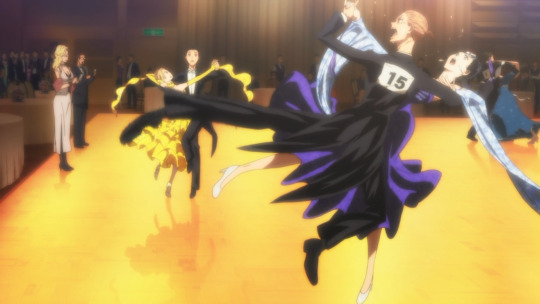
If you ask this show, Ballroom dancing is a sport about men being cool while dragging around women who have no fucking idea of what the fuck is even going on. Add to that all the harping on how “it’s the lead that makes or breaks a pair” “if the leader is bad the pair will look bad” because I guess the follower doesn’t ever matter.Or how only the boys are dead tired after the event, because I gues the girls weren’t dancing at all, what a relaxing job it must be to be a female in competitive ballroom dancing, you don’t have to put in any effort at all!
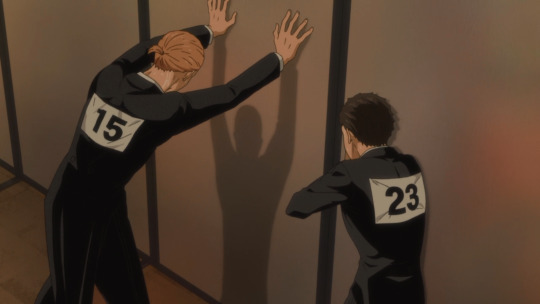
Also the music choices are atrocious which is finally explained by the Production team revealing they thought the audience would not like “old” music -because I guess the audience is too stupid or smth- so instead they went for completely inappropriate pop-rock themes instead! Maybe don’t underestimate your audience if you want them to buy your produc! (source)
But okay, after god knows how many episodes, the Tenpei cup finally ends, Gaju and Shizuku win but Mako wins Queen of the Dancefloor! At least some recognition fo Mako’s dancing skills, that even in spite of Tatara’s sloppy dancing she managed to outshine Shizuku through her own talents! Wait, hold on, what’s that?

FUUUUUUUUCK YOUUUUU SHOOOOOOW
Adding insult to injury, Gaju doesn’t even apologize to Mako for treating her like crap. In spite of his scummy attitude, Gaju seems to be a good sport, so I thought at least he’d “officially” ask Mako to become his partner again, but no such luck, it’s her who approaches him first. Fuck you again, show.
I also have a lot of thoughts about the garbage treatment of Shizuku, but I’ve talked about the show enough in this week, so that’s another post.
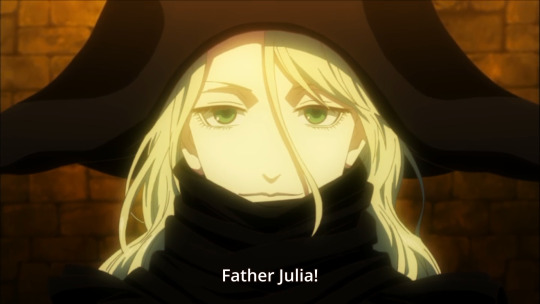
Oh yeah, Vatican is... the expected mess I guess lol. I have literally no idea of what is going on anymore but...

I want some of that cocaine too bruh (i’m kidding, don’t do cocaine my friends)
Also, Made in Abyss is great but can we please drop all the pee jokes.
I’ve technically already watched the final episode of Re:Creators, but I want to address the penultimate episod which is the actual resolution of the conflict because it’s not only a convoluted mess (and if I went into that in detail I’d write thousands of words), it’s ultimately a betrayal of the show’s opening promise.
To elaborate, Sota’s first dialogue is something along the lines of “I’m not the protagonist of this story. This story is about her”. At first I thought it meant Selesia too bad she died meaninglessly and without really doing anything for the story like 99.99% of the creations :’D, but we later learn he’s talking about Setsuna, for whose death he feels guilty yadda yadda Potato McBoring manpain.
But then the show decided to make Altair so ridiculously and unbelievably overpowered that the only way to defeat her is the very predictable “create Setsuna” and this is where the show betrays itself
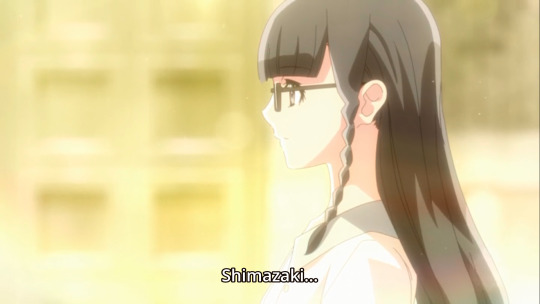
Because even if the resolution is that Setsuna and Altair go off into this some other world to live as abstract creations happily ever after, the actual emotional climax of the episode is after they disappear:

This is a massive slap in the face to everything the show was trying to do and to Setsuna’s character. Basically she’s stripped of her agency and becomes a figment of Sota’s creation. Sota who abandoned her when she was going through the hardest of times, now gets to be -even if briefly- her creator, her god, and he takes the credit for being the amazing creator that save the world. He even says it out loud in a culminating moment of disgusting conceit.

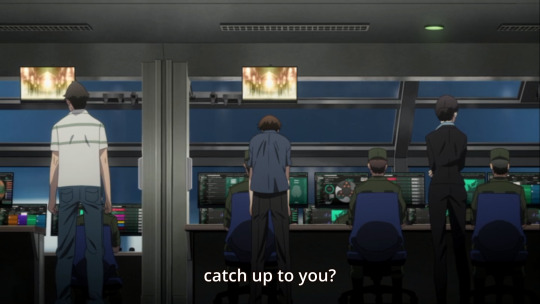
The whole purpose of the story, of the show, as it turns out to be, is to satisfy Sota’s ego. Setsuna is literally fridged for the sake of Sota’s manpain. This was never a good show, but until now it just felt like a lot of poorly executed great ideas. This, though, is basically giving up on any pretention of being “different” of stepping away from “Blandy McBoring protag saves the world because no one else but him can do it, he is so special”, and it’s made even worse because of the context of Setsuna’s death and the meaning of being a creator. Ugh, I’m coming short of words so I’ll just leave it at this was already a mediocre show and somehow they managed to go all the way and make it terrible.
And now another show that is sadly crapping the bed for its last hurrah, and one I’m very sad to be dissing like this. Yup, I’m talking about Virgin Soul
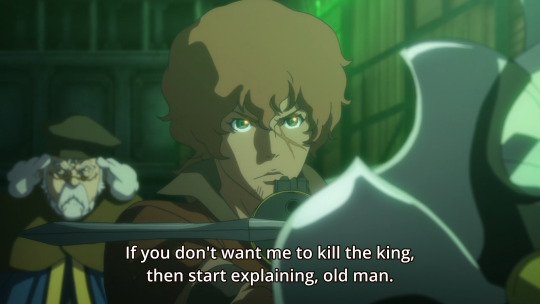
It’s like 10 episodes late and all the reward we get for waiting so long to hear Charioce’s motivation boils down and awfully rote and predictable to “Bahamut killed my mommy so now I kill Bahamut”. Next we know Charioce’s mom was also named Martha I guess. The explanation is also delivered in the most transparently expositional dialogue possible and seems like a very last-minute attempt by the writers to paint Charioce in a sympathetic light because they realized too late they hadn’t given him anything for the audience to like him beyond his romance with Nina. Somehow their explanation doesn’t even address the genocide against the gods or the enslavement of the demon race, and it seems every insinuation of Gabriel being shady has been forgotten too. Okay...
It’s sad because this feels like a hugely missed opportunity. The first half of the series painted the possibility of a tri-racial conflict in which all sides were to blame, but instead it seems like it was all a fabricated conflict to pad the way so they could have a three-way confrontation bombastic finale, but with none of the nuances and grey morals it initially promised. The characters are still great, but I’m very sad that the story has been reduced to an uninteresting, predictable cliché that doesnt even quite work with all the previously established ideas.
Oh well, the season’s almost over. Next week should be my last Rambling of the season before my Final Review and I also somehow gotta find time to post about my most anticipated shows for the fall. Fun!
#weekly anime rambling#summer anime#welcome to the ballroom#shingeki no bahamut virgin soul#re:creators#oof what a long post#i had a lot of feelings and frustrations about ballroom and re:creators#and virgin soul to a lesser extent#like the plot twist itself is torrible but the characters at least are great
6 notes
·
View notes
Text
Hate? On the Internet???
Argh, I am so mad right now.
Like, incoherently, making random noises of frustration at my laptop screen, wondering why the world is so stupid angry.
A couple of days ago, I wrote about the current situation with Pewdiepie on my other blog. Honestly, I thought I was hovering on the line of being too forgiving of offensiveness in an attempt to understand the mindset of the people supporting him. And even six months ago, I would have told you that I didn’t really like the Pewdiepie persona, but I liked the guy behind the channel, Felix, well enough. He seemed like a decent guy, and I liked seeing him and his girlfriend Marzia in her vlogs. Since he amped up the “shock” humor in his videos, I started to be really uncomfortable with him, because even if it’s just a persona, he’s still choosing to create that character and broadcast that to millions of people. All this backlash over his Nazi jokes seemed inevitable.
What didn’t seem inevitable — although perhaps it should have — was the entire Internet seeming to show up in support of him. I get that this must be a really tough time for him. He’s dealing with a lot of public backlash, a lot of guilt over the cancellation of his show, and a giant spotlight on him while he grapples with all this. But, you know, he also chose to say those things. Actions have consequences. And the number of people I’ve seen twisting this around so that it’s the mainstream media bullying him and taking his statements out of context is mindblowing.
Anyone who talks to me about Youtube for more than a minute will figure out that there are two (well, three) Youtubers that I really love: Jacksepticeye, and Dan & Phil. These are my “watch their stuff as soon as they put up a video, don’t miss their liveshows, genuinely think they’re awesome and would watch them painting a fence for an hour if they filmed it” Youtubers. And they’re all friends with Felix. Dan and Phil haven’t said anything, because they never comment on serious issues, unless it’s in a liveshow. But yesterday, Jack put up a video talking about the Felix drama, and while I didn’t agree with everything he said, I thought his response video was incredibly sensitive and measured, talking about how Felix is a good friend, but that he definitely messed up, and that he can’t blame companies for reacting the way they did. Basically, saying Felix is a decent person, but his jokes failed spectacularly and crossed the line into offensive territory, and now he’s seeing the consequences of that.
So, of course, the internet seems to have imploded with hate for Jack, saying he backstabbed Felix, calling him horrific names, and generally being so intense that he has now said that he regrets the video. It’s a mess on the level that only the Internet can provide, where over-intense strangers pile onto somebody because of some perceived infraction — this time, for being too “SJW-y,” despite the mildness of what Jack even said in his video.
And it’s just exhausting. It’s exhausting and depressing to see someone say something so middle of the road and be lambasted for it. It’s exhausting to see someone you respect then backtrack in response to the pile-on criticism. Gotta be nicer to the person who has been vocally supported by Neo-Nazis because of his “jokes,” after all! It’s exhausting to see how people are the worst, and will go to extreme lengths to insist that that popular white guy who said really offensive things did absolutely nothing wrong and should face no consequences for his actions.
I hate internet pile-ons, no matter the cause. Liberal or conservative, 4chan memesters or “SJWs,” I find the entire culture of mass insulting and shaming abhorrent. This is apparently an unpopular view these days, where a lack of willingness to join the pile is taken as a lack of caring about an issue. I also hate how the culture of the internet seems to default to hurting others. It’s shock jokes, jumping to telling people to kill themselves when you disagree with them, enjoying the schadenfreude of someone else’s humiliation, swinging from idolising someone to despising them at the drop of a hat, just… everything is so big and so negative, where being offended is a far bigger crime than being offensive, and sympathy to the nuances of a situation is the ultimate betrayal. And it’s so depressing, and so infuriating, to see all of this falling down on someone for daring to say that hey, maybe a more considered and sensitive approach is in order here.
I’m stretching for a wise-sounding way to conclude this, but I got nothing. This is basically just a rant. I almost want to ask why any of us bother existing online at all. It’s just all so much, so stressful, so dark. And then, of course, I come back to the fact that one of the reasons I’m upset is because I must have spent hundreds of hours at this point watching Jack’s videos, having them cheer me up when I feel low. Without the internet, without the structures and content at the heart of this culture, that wouldn’t exist, and that would suck. But I don’t know, guys. Maybe we could try and take the good parts without all the violent words and hate as well? Maybe?
Hate? On the Internet??? was originally published on Rhiannon Thomas
3 notes
·
View notes
Text
Inside the Sports-Industrial Complex (Ep. 364)
The N.F.L. makes roughly $7 billion a year from TV contracts, more than any other sports league in the world — and more than all the other big U.S. sports leagues combined. (Photo: Ronald Martinez/Getty)
For most of us, the athletes are what make sports interesting. But if you own the team or run the league, your players are essentially very expensive migrant workers who eat into your profits. We talk to N.F.L., N.B.A., and U.F.C. executives about labor costs, viewership numbers, legalized gambling, and the rise of e-sports. (Ep. 5 of “The Hidden Side of Sports” series.)
Listen and subscribe to our podcast at Apple Podcasts, Stitcher, or elsewhere. Below is a transcript of the episode, edited for readability. For more information on the people and ideas in the episode, see the links at the bottom of this post.
* * *
Lauren MURPHY: When you bleed and sweat and cry with somebody every day, you get to be pretty close to them.
JJ REDICK: For me, shooting a basketball and seeing it go through the net became just an obsession.
Kim NG: If you want something, you have to be aggressive.
Mark CUBAN: Yeah we were awful. When players were traded here, they just couldn’t wait to get out.
Daryl MOREY: Oh, I care so deeply, and it’s stupid. I have no idea why I care, but I like winning.
MURPHY: And I distinctly remember thinking, “I’m going to get better at this and I’m going to come back and I’m going to kick your ass someday.”
CUBAN: I’ll take e-sports. Yeah, buy e-sports, sell N.F.L.
Mark Cuban is an entrepreneur, and also a star of Shark Tank and owner of the N.B.A.’s Dallas Mavericks. When he said he’d sell the N.F.L. and take e-sports — I’d asked him to play a game of buy, sell, or hold with three stocks: the National Football League, the Ultimate Fighting Championship or U.F.C., and a basket of e-sports. So why is Cuban selling the N.F.L., which is the most profitable sports league in the world?
CUBAN: I just think C.T.E. creates a problem.
C.T.E. being chronic traumatic encephalopathy, or the brain damage associated with contact sports like football.
CUBAN: So participation has been dropping the last few years and will continue to drop more. I have an 8-year-old son; there’s no way I’d let him play tackle football. If you don’t want your child playing contact football then you diminish the viewing in the house. Now he’d much rather play Fortnite than watch football.
DUBNER: Okay, and you’re buying e-sports. So say why, and especially explain to people who can’t get their mind around it at all: what is the appeal of watching — I mean there’s stadiums being built. So why do twenty, fifty thousand people want to go to a stadium to watch other people play video games?
CUBAN: Because once you play, you understand the nuances of the game, and it’s aspirational and educational. So if you like to play League of Legends — it’s hard. But one of the ways to get better is to watch other people play. And to learn the nuances and to learn the strategies, particularly given that they change the rules every 90 or 120 days. The e-sports teams have got to practice hours and hours and hours a day. So, it takes a real skill, it’s a real sport, and you also have to realize that anybody in front of a PS2, Xbox, or PC watching these kids that play, in their mind just like we watched sports growing up and say, “Hey if they can do it I can do it.” That’s the aspirational part of it as well. There’s no physical hurdles — you can be 4 feet 1 inch or 7 feet 1 inch, and if you’ve got the hand-eye coordination and the brain-processing speed and anything’s possible, you could do it too.
Is e-sports really the future juggernaut Cuban describes? At the very least, he’s putting his money where his mouth is: among his many sports-technology investments is an e-sports betting platform called Unikrn. In this regard, Cuban is not an outlier. A lot of N.B.A. teams — as well as teams from the National Football League and Major League Baseball and the National Hockey League and Major League Soccer — they’re all investing in e-sports franchises that play games like League of Legends, Fortnite, and Overwatch. A lot of venture capital firms are investing as well. The global e-sports market is said to be approaching $1 billion, up roughly 40 percent from a year earlier — and that doesn’t even include the money flowing to the game companies themselves. Blizzard Activision, which makes Overwatch, reported $4 billion in revenue in 2017 from in-game purchases. If I had told you 10 years ago that e-sports would be a booming industry funded by multi-billion-dollar sports organizations, you probably wouldn’t have believed me. But if I’d told you a hundred years ago that multi-billion-dollar sports organizations would even exist, you wouldn’t have believed that either. Sports, in the very beginning, were a proxy for war. Here’s John Thorn, the official historian of Major League Baseball.
John THORN: The 30 best men of one side against the 30 best men of another, and both sides agreed to abide by the outcome.
Later on, sports became a tool of empire, of colonialism — a civilizing force, or at least that’s what the civilizers said.
THORN: Well, we sublimate our martial instincts by pouring them into sport. We can paint our faces, we can drink ourselves silly, we can yell insulting epithets at the umpire or certain players.
And what has sports become these past few decades?
ANCHOR: LeBron James agreed to a four-year, $154 million contract with the Lakers.
ANCHOR: Fox striking a five-year rights agreement with the N.F.L. worth about $3 billion.
ANCHOR: Record-shattering deal — Alvarez signed a five-year, 11-fight deal worth a minimum of $365 million.
ANCHOR: Serena Williams just topped the Forbes list of highest paid female athletes for the third year in a row.
ANCHOR: Rockets owner Leslie Alexander has agreed to a deal to sell the Rockets to Houston billionaire Tilman Fertitta for $2.2 billion a record for an N.B.A. franchise.
Yes, sports has become big business. How big?
Victor MATHESON: So, the answer here is actually surprisingly small. Sports has a social impact that is way, way bigger than its economic impact.
That’s Victor Matheson, an economist at Holy Cross and president of the North American Association of Sports Economists.
MATHESON: So the biggest league in the world in terms of revenue generated is the N.F.L., and the N.F.L. generates something like $14, $15 billion a year.
Add in all the other major American leagues, plus the P.G.A., pro tennis, mixed martial arts and so on:
MATHESON: You’ve got maybe $50 billion of pro sports, a few more tens of billions of dollars in college sports. But you’re still only up at $60, $70 billion. That makes spectator sports in the United States roughly the same size as the cardboard-box industry in the United States. Now obviously none of us gather around the water cooler on Monday morning saying, “Hey man, over the weekend, did you see that awesome cardboard box that American Paper just put out?” Of course we don’t. So obviously, culturally, sports is huge.
Okay, so the sports industry punches above its weight in cultural significance, that seems clear. One way to think about this is that consuming sports is really cheap considering how much attention we give it. That said, a $60 or $70 billion industry isn’t nothing. It’s an industry that offers a select few athletes the chance to become multi-millionaires; and it gives billionaires somewhere to park their money that’s a bit more exciting than cardboard boxes.
So, our “Hidden Side of Sports” series continues with a look at how this industry works from the ownership and management side. How does a game become a sport become a business become an industry? We’ll get into the economics of a startup league. We’ll hear how the big leagues are trying to get even bigger. We’ll hear what team executives hate about their own sports. We’ll learn about an exciting legal development. And we’ll get into the unusual fact that in sports, your labor force is also your product.
* * *
DUBNER: So let’s begin. If you would, just say your name and what you do.
Lawrence EPSTEIN: My name is Lawrence Epstein. I’m the chief operating officer at the Ultimate Fighting Championship.
DUBNER: And for those who’ve never seen a U.F.C. fight or maybe who don’t know anything about the U.F.C. or M.M.A., mixed martial arts, just describe it.
EPSTEIN: Mixed martial arts is essentially the sports of boxing, jujitsu, judo, karate, muay thai, taekwondo, and then both freestyle and Greco-Roman wrestling all combined into one sport. And the U.F.C. is a brand name that we operate our promotion under.
DUBNER: Okay, so let’s focus on the U.F.C. then. How often does a fighter typically fight?
EPSTEIN: We’ve got currently about 525 fighters under contract and they fight on average about 2.3 times per year. Over our 25-year history, we’ve done about 9,500 individual bouts.
DUBNER: Okay, what share of U.F.C. fighters are female, and do women ever fight against men?
EPSTEIN: No. Absolutely no women against men. But about 15 percent of our athletes are currently female, and that percentage is growing.
DUBNER: So, I understand that you recently negotiated a new TV deal, this is with ESPN for—
EPSTEIN: $300 million per year, over five years, $1.5 billion in total.
If you’re not a fan of mixed martial arts, you may be wondering how such a league could be so valuable.
EPSTEIN: Dana White, our president, he says, “There’s four corners in any city, anywhere in the world. One corner, you got a soccer game going. On another corner, you got a basketball game going on. On the third corner, you got some guys playing tennis. And on the fourth corner, a fight breaks out. What happens? Everybody runs to the fourth corner to watch the fight. So people understand fighting. They get it. It’s part of our D.N.A. and they like it.
In 2016, the mega-agency W.M.E./I.M.G. and a group of private equity firms bought a majority stake in the U.F.C. for nearly $4 billion. Its ringleaders, Lorenzo and Frank Fertitta, had acquired the U.F.C. just 15 years earlier for $2 million.
EPSTEIN: Lorenzo Fertitta famously says that, “I paid $2 million for three letters, U.F.C.” And that was really essentially all that was purchased. There was literally a box of contracts and there was another box of tapes and there was a wooden octagon that had been used over the years.
Many businesses talk about, “We built this thing from the ground up.” We actually inherited a business that was about 10 stories underground and it took us about three or four years to get up to the ground level before we could actually turn it into a real business.
DUBNER: Now, how do you get that done? Because this was a sport that was nearly driven to extinction before it had the chance to get big. Senator John McCain famously called it “human cockfighting,” led the charge against it. So, how did you turn that around, state by state?
EPSTEIN: We put together a set of assets that included the economic impact our events were having in regulated markets, the truth about health and safety, whether our athletes were sustaining major injuries or not, and of course they weren’t. Third we had — and this was the most compelling thing — we had many of our athletes help us in this process and introducing elected officials to our athletes was key. And the other factor, which was really, really interesting was the staff at all of these offices around the world are generally young people. I mean, you’ve probably been to legislators’ offices, and you’ve got people that are right out of college. Early 20’s, mid-20’s.
DUBNER: And they’re fans.
EPSTEIN: They are fans. They love it. So they’re talking to their boss, saying, “This stuff is awesome. These people are cool. This is something that’s fun to watch,” and the staffers were absolutely key in convincing the elected officials to ultimately vote in favor of regulating the sport. But the whole premise of the original Ultimate Fighting Championship was: there are no rules. It was a no-holds-barred event. And that was just something that we felt didn’t have any sustainability. You had to have regulation. You had to have a regulatory environment that looked a lot like the boxing regulatory environment. And so that’s what we did.
So the U.F.C., in state-by-state petitioning, made itself legal and legitimate. But it still had one big problem.
EPSTEIN: We couldn’t get on television. There was no interest in putting us on any television other than pay-per-view. So we put on these pay-per-view events and we had to produce them ourselves. So we actually developed a core competency in putting on these fairly unique events with, many times, 20–24 different cameras.
This practice, interestingly, continues today.
EPSTEIN: One of the reasons why we are a little bit different than the other sports organizations is that we pay all of the production expenses for our event. As far as I know, we’re the only sort of major sports organization that does it ourselves.
Consider, for instance, the N.F.L.
EPSTEIN: When they do a deal with CBS Sports, they just get a check and CBS Sports, in addition to paying them billions of dollars every year, they also handle all of the production.
Okay, so the U.F.C. early on learned how to produce its own events. But they were still a fringe sport, relegated to pay-per-view. So they did what any sensible start-up sports league would do: they created a reality TV show.
EPSTEIN: You take 16 athletes, you put them in a house, they do a bunch of goofy things like you always see on reality shows, and at the end of each episode there’s a fight. Winner stays, loser goes home.
The show was called The Ultimate Fighter. It went on the air in 2005.
EPSTEIN: We were able to do a deal with Spike television, and they didn’t pay us anything, but they said, “We’ll let you put this on our air. We’ll give you not all, but we’ll give you half of the ad inventory.” And we went out and tried to sell that ad inventory. We were able to sell no ads at all, to any sponsor. So we took that ad inventory and used it to promote our upcoming pay-per-view. And any metric that you look at in the U.F.C., whether it’s profitability, or the number of fans that we have, or ratings, we have the sort of hockey-stick type of a graph and the inflection point is The Ultimate Fighter, Season One.
The U.F.C. has grown exponentially since then, and has the ESPN deal to prove it, but it still relies heavily on pay-per-view as well, distributed via cable and satellite as well as digitally, via Amazon and its own UFC.TV. Their biggest pay-per-view hit to date was actually a boxing match between the undefeated fighter Floyd Mayweather Jr. and U.F.C. champion Conor McGregor. Epstein points to one big downside of the pay-per-view model.
EPSTEIN: I mean, it’s a 100 percent churn business. We sold 3.5, 4 million-plus buys for Mayweather vs. McGregor, and every one of those customers left. We didn’t keep one of them. We got to resell them for the next fight.
DUBNER: So, that is a really interesting conundrum, and I’m kind of surprised that you guys haven’t solved that yet.
EPSTEIN: I mean, our decision’s been frankly strategic. We’ve decided this is the world we want to live in. Because as consumers change the way they’re consuming content, we can simply shift content into different buckets to meet consumer demand. But at the end of the day, pay-per-view is a bet on yourself. And listen, if ESPN was willing to pay us what they’re paying the N.F.L., I think we’d probably get off pay-per-view, but they’re not. And in the meantime, we are willing to bet on ourselves.
Betting on themselves has served the U.F.C. well; they’ve joined the pantheon of prominent American sports leagues. Which, they’ve discovered, presents its own challenges:
EPSTEIN: Well, the challenges are competition. And I’m not talking about just competition from other M.M.A. promoters, but we’re competing against the N.F.L., college football, baseball, video games, movies, YouTube videos, and the list goes on and on. The consumer is getting bombarded with options for lots of entertainment, and of course the consumer only has a certain amount of bandwidth for their time and a certain amount of bandwidth for their wallet.
Welcome to big-time sports. Where even the behemoths are worried about their future.
Jed YORK: We are the dominant sport in America. But if we really want to build our business and become an international sport, that’s going to take some figuring out.
That’s Jed York of the National Football League’s San Francisco 49ers. He’s the team’s C.E.O. and a co-owner.
YORK: I would first say that the biggest blessing and the biggest curse of the N.F.L. are the TV contracts, where it makes you very successful, but it also makes it so you don’t really try new things and try to disrupt.
How big are the N.F.L.’s TV contracts? Roughly $6 billion a year, No. 1 in the world. No. 2, at just under $5 billion, is the FIFA World Cup — which is pretty remarkable for an event whose finals are held only every four years, although they are playing to a global audience. Rounding out the top 10 global TV contracts are the N.B.A. and Major League Baseball; the top soccer leagues in England, Germany, and Spain along with the UEFA Champions League; and the Summer and Winter Olympics. Not cracking the top 10 are the N.H.L, M.L.S., or U.F.C. Which means the N.F.L. has more TV revenue than all the other big American sports leagues combined.
Al GUIDO: Thirty-three of the top 50 shows are still N.F.L. TV games.
That’s Al Guido, president of the San Francisco 49ers.
GUIDO: The eyeballs are still there, they’re just scattered. They’re just in different places. And I think the N.F.L., along with every other league, needs to do the best job they can getting content in a fan’s hands, wherever they are. And that’s changing dramatically.
Cable subscriptions in the U.S. have been dropping fast; 54 percent of viewers between 18 and 29 use streaming services more than cable. That said, live sports are much better-positioned than just about any other kind of content that plays on old-fashioned TV.
MATHESON: We still do watch the Super Bowl live, we watch the World Cup live, we watch the World Series live, and that gives advertisers a chance to put their product in front of a live audience. And it’s one of the last places that that happens. And this is why we still see increasing contracts even though the actual number of eyeballs watching sports contests is not going up particularly quickly.
The N.F.L. has also made big deals to stream its games: Amazon, for instance, recently renewed its N.F.L. deal, paying $65 million a year for the digital right to stream 11 Thursday night games that are already being broadcast on TV. That was a 30 percent bump over the same rights last season. Amazon reportedly beat out rival offers from Twitter and YouTube.
GUIDO: My 9-, 7-, and 5-year-olds don’t even turn on the TV.
The 49ers’ Al Guido again. He’d like the N.F.L. to grow, especially overseas; but that’s complicated.
GUIDO: In the N.F.L., we have what I would deem right now an event-based strategy. We host games overseas. And that is immensely — I mean, it’s successful. However, what is the global strategy and footprint long term? What is it at the league level, what is the team level? And how do we incentivize our clubs to invest more money outside of their footprint? I am frustrated at the inability for us to take our rights and marks across global footprints.
I’ll give you a specific example: Jarryd Hayne was on our team a few years ago, Australian rugby player, they said he was the Michael Jordan of Australian rugby. He comes over here, he plays, he’s an immediate success. Sells more jerseys than any player in the N.F.L. We obviously would love to do a deal over there with Rio Tinto, or we’d love to open up a pop-up retail shop in Australia. We can’t. Well, we can, but if we were to sell our rights and marks and they were to use it in Australia, that revenue is split 32 ways. Doesn’t necessarily come back to the team.
DUBNER: Thirty-two ways because 32 teams in the league?
GUIDO: Right. So we make as much money on a Jimmy Garoppolo jersey as we might on a Russell Wilson jersey.
Okay, let’s take a step back here. Jimmy Garoppolo is a 49ers player; Russell Wilson is not. Al Guido’s point is that the N.F.L., like most American sports leagues, is so devoted to its revenue-sharing model — from TV income all the way down to merchandising — that the incentives can be skewed. With revenue sharing, a team can make a lot of money even if it has a losing record every year; and why invest in new ideas when others don’t have to, and when you get an even cut of the pie regardless? As Jed York said, that’s the downside of the N.F.L.’s fat TV contracts:
YORK: It makes you very successful, but it also makes it so you don’t really try new things and try to disrupt.
This sort of revenue-sharing is a key feature of American sports leagues. It’s less business model than cartel model; it’s a sort of billionaire socialism. And this is not, by the way, how the big soccer leagues work in Europe — where, interestingly, there’s a lot of political socialism. The European soccer leagues do share some revenues but, unlike most American sports leagues, there are essentially no firm salary caps, and every year the weakest teams are relegated out of the league while new ones are promoted.
Stefan SZYMANSKI: Well, I’ve always been very surprised by this.
Stefan Szymanski is a British economist who teaches sports management at the University of Michigan.
SZYMANSKI: So to me, thinking as an economist, I think of this as the difference between equality of opportunity and equality of outcomes. And when I think of Europeans in general, we tend to have strong systems of social services and safety nets, which ensure, really to a large extent, equality of outcomes within the European systems. But traditionally, we have a sense of limited equality of opportunity. We have class systems, we have big social gaps. And America, we always think of as being the reverse — where there’s equality of opportunity, but very limited safety net.
And it seems to me the sports story is completely the opposite. In Europe, we have this incredibly hyper-competitive, capitalist system where the devil take the hindmost, and we have a lot of financial failure in Europe. That’s also one thing that goes with this — an incredible financial distress and failure. And yet, in America, there’s these leagues which are essentially closed societies, which don’t allow any competition, and then share out the resources equally in almost a socialist fashion amongst the top teams. It seems that the mental framework for sports is at odds with the mental framework about competition in society more broadly.
That said, the American sports business model is too entrenched to change much, at least anytime soon. So how, in the face of more and more entertainment competition, are these giant leagues looking to grow?
Kim NG: Right now, one of the Commissioner’s main objectives is to spread the game globally.
Kim Ng is a senior executive with Major League Baseball.
NG: We’ve been very aggressive on that front. We’ve had games in the last couple of years from spring training to regular season games in Puerto Rico, Mexico, next year we’ll be in London. We’re doing a barnstorming tour in Asia as well as playing some regular-season games in Japan.
Major League Baseball, despite declining stadium attendance, is still the world’s second biggest sports league by total revenue. It hopes to maintain that status not just by bringing American baseball to the rest of the world, but by bringing the rest of the world to American baseball.
NG: We have three development centers in China. We have high-performing programs in Puerto Rico, Mexico, Nicaragua, Curacao, South Africa, and these are basically academies in which we train kids on a yearlong basis and they go to school as well. And our goal is to get them into colleges and hopefully some of them into the big leagues as soon as we can.
* * *
Even the most profitable sports league in the world — the National Football League — is concerned about its future. TV revenues are still strong, but viewership is slipping. Some people have been turned off by the sport’s violence, and the risk to players. Others didn’t like how the National Anthem protests turned the game of football into a political football. And the N.F.L.’s most visible attempt to globalize the game — it was called N.F.L. Europe — it failed. So, as in any maturing industry, the league has been searching for new revenues. The U.S. Supreme Court recently did its part to help. In May of 2018, it struck down a federal law that had limited legal sports betting to Nevada. Which should be good news for the NFL and other American sports leagues.
GUIDO: Yes, I mean, from a revenue perspective, there’s no question.
San Francisco 49ers president Al Guido.
GUIDO: If you think about what fantasy football has done, it’s increased the popularity of our sport.
EPSTEIN: Gambling on sport is good for sport in the sense that it creates revenue opportunities and it creates a deeper fan connection to the matches, the games, the events themselves.
Lawrence Epstein is with the U.F.C..
EPSTEIN: So there is no doubt that the proliferation of sports gaming around the United States is going to be good for not just the U.F.C., not just the N.F.L., but all sport.
The U.F.C. happens to be based in Las Vegas. Sports leagues used to stay far away from Vegas, worried about the long-standing, and well-deserved, connection between gambling and match fixing. The most famous fix — alleged fix, at least — was the 1919 World Series. In early 2019, more than two dozen professional tennis players were arrested for participating in a match-fixing ring based in Spain.
That said, even before the Supreme Court ruling, American sports leagues were finally starting to shed their fear of the Vegas connection. In 2017, the National Hockey League finally put a team there, the Las Vegas Golden Knights. Their first season got underway just a few days after the horrible mass shooting in Vegas where 58 people were killed at a music festival, and the Golden Knights turned into one of the biggest feel-good stories in recent memory by making it all the way to the Stanley Cup Final. And next year, the N.F.L.’s Oakland Raiders will become the Las Vegas Raiders.
The embrace between professional sport and professional gambling would seem to be complete. What does this mean for the leagues and their teams? Here’s Dallas Mavericks owner Mark Cuban.
CUBAN: Yeah, I think it’ll lead to our franchise valuations doubling, literally, because there’s a lot more reasons for people to pay attention, a lot more reasons for people to watch. And that’s good for our bottom line.
It’s too early to say whether team valuations really will increase like Cuban suspects, or even to say exactly how gambling fees will be divided. Individual states are already setting up their sports-betting tax rates, and teams and players are angling for their cut as well. One idea that’s been pitched is a so-called “integrity fee” — an incentive to keep the matches clean. I asked the sports economist Victor Matheson who he thinks will be the biggest winners and losers as sports gambling grows in America.
MATHESON: So, I would say the biggest winners are all of the professional leagues. The people simply enjoy the sport more when they have something riding on it. There’s a reason why every March, everyone tunes into all those first- and second-round March Madness games: because everyone has filled out a bracket and it’s hoping their bracket isn’t busted on the first day.
So, we know that gambling makes things exciting, but we also know gambling can lead to corruption. And there’s two really big losers here: I think the N.C.A.A. is a huge loser here, because their athletes are particularly vulnerable to corruption because they’re not being paid. Now mind you, that’s the N.C.A.A.’s own fault for not paying their athletes. But we don’t have to worry about LeBron James or Steph Curry throwing games because they’re not going to risk their $30 million paychecks and their reputations to try to make a little money from a mobster. On the other hand, an unpaid, poor 19-year-old college kid might.
The other big loser might be the gamblers themselves. There are groups of people that this type of gambling will appeal to, in particular it was suggested that young, confident men are — this is exactly the sort of thing that will suck them in. They watch sports 40 hours a week. They’ve got to be good at gambling, they think to themselves, and guess what: there’s people who are a lot better than them still.
If gambling represents one way forward for the business side of sports — that is, a new revenue stream — there is of course another, time-honored way of staying in the black: controlling costs. In most industries, the largest single cost is labor.
MATHESON: For the economy as a whole, the traditional number that economists use is that roughly two-thirds of all gross domestic product goes to labor, and about a third of it goes to capital.
Sports, meanwhile, has had a dramatic trajectory.
MATHESON: If you’re looking back in 1970, you are seeing a world where players are making only a tiny fraction of the total revenues. The rest of that is going into the pockets of the owners. By the mid 1970’s and mid 1980’s we have free agency in every sport except maybe the N.F.L., which had free agency on paper but not in reality until about the mid-90’s. And in Europe, in soccer, you started to have free agency in about 1995-ish. And at that point you have players earning more like 50, 60, 70 percent of team revenue — so a huge increase in what they’re earning.
That’s a huge percentage increase to the athletes at the same time as revenues were also exploding. But, more recently:
MATHESON: More recently, the owners have clawed a bunch of that back, and in the big leagues in the United States, the N.B.A., N.H.L., and National Football League, by agreement between the union and the leagues, they basically split the revenue 50/50. Half of the revenue goes to the players in terms of pay and benefits, and the other half sticks with the owners as profit or to cover costs to run the league.
So, how costly is it to run the league, and how much is left over for profits? That’s very hard to say, since most pro sports teams are privately owned. One notable exception is the N.F.L.’s Green Bay Packers, who are publicly held and therefore publish their financials. The Packers are a venerable team but also a very small-market team: Green Bay has a population of barely 100,000 people. And yet, remember, they get the same share of N.F.L. collective revenues as the New England Patriots or the Los Angeles Rams. The last couple years, the Packers’ annual revenue has been in the neighborhood of $450 million, with profits averaging around 12.5 percent. The current salary cap — the limit a team can spend on player salaries — is about $177 million a year; and a team is required to spend at least 89 percent of that amount. So you might imagine that in a league like the N.F.L. or the N.B.A., with TV revenues locked up well in advance and total labor costs limited by a union agreement, there’s no way for a pro franchise to lose money. That’s what I suggested to N.B.A. owner Mark Cuban.
CUBAN: No, that’s not true at all.
DUBNER: Give me an example.
CUBAN: I can’t throw out names, but yeah.
DUBNER: Well, how many N.B.A. teams in a given year are going to lose money?
CUBAN: More than you think.
DUBNER: Really.
CUBAN: Yeah.
DUBNER: So, even with the revenue-sharing, with all the broadcast and other monies distributed evenly and with a salary cap that guarantees that you don’t have to overspend a certain amount, you’re saying that — how do you lose money? Is it by lacking game revenue?
CUBAN: Enough effort. Yeah. Lacking revenue period. Just like any business.
DUBNER: But what’s the major variable? Is it gate revenue or is it broadcast revenue?
CUBAN: Gate, broadcast, players, all the obvious things.
One obvious difference between the cost of labor in sports versus just about any other industry — except maybe the entertainment industry — is that the employees are the product, which makes them much more visible than employees in a typical industry. And potentially much more valuable. Consider a superstar like LeBron James, who this year is earning $35.6 million. Which sounds absurd — until you try to calculate just how valuable he is to the sport.
EPSTEIN: I mean, if LeBron James was getting what he deserves, he’d make $200 million a year, $300 million a year.
That again is Lawrence Epstein of the U.F.C. His biggest star, Conor McGregor, earned a reported $100 million for that pay-per-view fight against Floyd Mayweather Jr.
EPSTEIN: Oh man, I mean if Conor made $100 million last year, which is probably 20 percent of our revenues. LeBron James, he’s got to be worth 10 percent of the revenues of the N.B.A. He’s got to be. So what is that? It’s 400 million or something? It’s a giant number. Maybe he’s not Conor, which is 20 percent of our revenues, but he’s easily 10. He’s easily 10.
For the record, the N.B.A. produced about $7.5 billion in revenues last season, 10 percent of which would be roughly $750 million. Too bad for LeBron James that Lawrence Epstein isn’t setting his salary. And what about U.F.C. salaries? Before interviewing Epstein, I’d asked the economist Victor Matheson to compare athlete salaries in different sports.
MATHESON: If you’re trying to decide what sport to go into, you probably want to go into baseball or football, where at least you’re going to be earning a pretty big chunk of those television revenues. And man, stay away from U.F.C., because they’re making a lot of revenues but not much of that is going into the athletes. The amount going to the athletes there is about 10 or 15 percent of revenues. So, again, much less.
Why do the U.F.C.’s athletes earn so much less? Keep in mind what Lawrence Epstein told us earlier — that the U.F.C., unlike other leagues, pays its own production costs. Still, you might think that compared to the big team sports, U.F.C. athletes would do pretty well, since team sports require so much more labor to produce. We do know that U.F.C. fighters aren’t unionized, which means they don’t have collective bargaining power, like N.F.L. and other team athletes do. In any case, I asked the U.F.C.’s Lawrence Epstein about this disparity.
EPSTEIN: Well I think first of all, the 15 percent number, I don’t think that’s accurate. I mean there certainly is some fluctuation in the percentage of revenue that goes to athletes. But the reason for that primarily is that we have a variable revenue stream model in our company. So, you mentioned the N.F.L. Let’s assume they’re giving 50 percent of the revenues to the athletes. Well, those revenues are contracted revenues with the largest media companies in the earth: ESPN, CBS, NBC, Fox, and others. The significant part of our profitability still comes from pay-per-view events. Which of course are completely variable in revenue.
And so because we just don’t have those contracted revenues like so many of the other sports leagues do, we’re taking a lot of risk every time we put one of these major events on. I mean you can’t just agree to pay certain people a certain amount of money if you don’t know whether or not that money is going to come in. And of course, the N.F.L. and Major League Baseball and the N.B.A. — multi-billion-dollar contracts with great credit on the other side of those deals.
DUBNER: I’ve read that the median U.F.C. salary is roughly $42,000 a year. We interviewed a fighter, Lauren Murphy, who’s the No. 5-ranked female fighter in her weight class. And she told us she gets about $12,000 per fight guaranteed, another $12,000 if she wins, and a $50,000 bonus if she’s the fight of the night. So she said she’s had years where she’s made just $20,000 and one year where she made around $90,000. Again, for a fighter who is No. 5 in the world in her ranking.
I understand there’s an ongoing antitrust lawsuit against U.F.C. which claims that the U.F.C. used an anti-competitive scheme of long-term exclusive fighter contracts, coercion, and acquisitions of rival M.M.A. promoters to establish and maintain dominance, etc., to suppress fighter compensation. I don’t expect you’re going to open up on that case to me right now, but I’d like you to talk generally to this notion of a league that is making a lot of money, that was bought for $4 billion, and yet one where the people who were doing the actual fighting seemed to be generally compensated much less than the average fan at least would assume.
EPSTEIN: Yeah, obviously can’t get into talking anything specific about the litigation. But, as I mentioned previously, Conor McGregor made about $100 million last year. When you compare the percentage of revenues that we deliver to our athletes, it’s very comparable to other sports organizations of our size, and the fact that both we have to produce the content, which adds additional expense to us, in addition to the fact that still a very large portion of our revenue is variable in nature — we’re very proud of what we pay our athletes and we think it’s certainly consistent with other sports organizations of our size.
And to a certain extent, it is a zero-sum game. And if Conor McGregor is going to make $100 million and Jon Jones and these guys are going to make tens of millions, there’s got to be money there to do it. The guys at the top end, the women on top of the food chain, they’re happy with the ecosystem. That’s for sure.
DUBNER: Does the league provide health insurance and other benefits?
EPSTEIN: So, our athletes are independent contractors, so we can’t provide that type of health insurance that you and I might get with our particular employers. But about seven years ago, we began providing what’s called an accident insurance policy which would cover our athletes for any acute injury that they would sustain while they’re under contract with us. In addition to that, most athletic commissions or federations around the world will require that insurance policies be in place for event related injuries. So when you combine the event-related injuries with the accident insurance policies, our athletes are covered while they’re under contract with us for any acute injuries that they would sustain.
We’ll hear more about these labor issues in an upcoming episode, this time from the athletes’ side and the union’s side. For instance, here’s DeMaurice Smith, executive director of the N.F.L. players’ union:
DeMaurice SMITH: The reality is: they are management, and we are labor. And there are going to be core philosophical differences between us. And I think the challenge becomes, there are people who are unwilling to perceive someone’s life in the other shoes. And frankly I think that’s on both sides of the table.
For now, let’s just say that there is a lot of friction between management and labor in sports. In most organizations, there’s one person whose job is to navigate that friction. A person who’s part of management but who’s also the primary liaison between ownership and the athletes. Not the coach — they’re seldom a part of management. This person is usually called the general manager. Like Daryl Morey, general manager of the Houston Rockets.
And the G.M. of an N.B.A. team does … what?
MOREY: So, there’s the bringing in the coaching staff who then obviously direct the players. There’s the medical performance side, where you’re keeping players performing at the highest level. There’s the scouting side, and then there’s the data-and-information side.
Morey is particularly well-regarded on the data-and-information side. He was a pioneer in N.B.A. analytics, and he recently won the league’s Executive of the Year Award. Unlike most general managers, Morey neither played nor coached basketball at a high level; he took the nerd route to the N.B.A., having studied computer science and statistics.
MOREY: Yeah, I think “the nerd route” is fair.
Morey also enjoys musical theater; he recently commissioned a basketball musical called Small Ball.
MOREY: That is accurate. Yeah.
One character sings the following line: “Your cold calculations. You are ripping the heart from this beautiful game.”
MOREY: Correct. Yes, he sings that multiple times.
As for his day job: Morey admits the N.B.A. has had a tremendous growth spurt.
MOREY: Basketball in the late 40’s and early 50’s was thought of as the red-headed stepchild of sports. No one cared about basketball until maybe even the early 80’s.
And now?
MOREY: The N.B.A. is going to be the dominant sport in the future — along with soccer and e-sports. For me, the top sports are going to be global. The bottom line, just follow where people are spending their time. Especially under the age of 25. It’s all dynamic games on their phones or P.C.’s or consoles. And the fastest growing content that’s watched by far is people watching people playing video games. Both competitive and non-competitive. And it really is just overwhelmingly logical that e-sports is going to be one of the top sports.
Daryl Morey, like the people we’ve been hearing from in other sports, recognizes that the modern consumer has a lot of entertainment options. Just because a sport is dominant today doesn’t mean it’ll even be relevant in 20 or 50 years.
MOREY: I do think the N.B.A. does have a real challenge. We have a golden goose that’s laying eggs. The league would have to take a risk while the goose is laying golden eggs. We’ve done actually more changes to our game than any of these other professional sports, by far. But the reality is it’s sometimes hard to change.
There are a lot of things Morey would like to see changed in the N.B.A. For starters, he thinks they play too many games.
MOREY: Here’s a really simple way the N.B.A. has too many games: when you ask someone, “Should the N.B.A. have more games or less games?,” there’s not a single person alive who says there should be more games.
This is what Morey means when he talks about the golden goose — cutting back on games would cut back on revenues. At least that’s the conventional wisdom. Morey disagrees:
MOREY: Appointment viewing is what drives drives major advertising spend, drives everything, so I absolutely think there should be fewer games in the N.B.A.
His evidence for this argument?
MOREY: The N.C.A.A. tournament is 63 games. They make more TV money than we make in our entire 1,200-game N.B.A. regular season. I would have it be like the Premier League — everyone plays each other twice. Fifty-eight games.
Morey also thinks there are too many playoff games.
MOREY: I would do one-and-done N.B.A. playoffs. I would get byes to the top two teams in each of the conferences, similar to the N.F.L. I would then have a play-in tournament to be the other four teams that then play the two teams with the byes. All the games will be one-and-done.
One big reason he’d want fewer games, including the playoffs, is that N.B.A. games are too predictable.
MOREY: There needs to be more variance. Every good sport, game, board game needs to have a real healthy mix of skill and luck. I’ve seen many papers on this. It’s like 70-30, something like that. One big problem is we are the most deterministic on a single-game level. We know better than any other sport this team is going to beat that team. If we play one of the bottom-feeder teams — I don’t want to mention — we’ll have 90, 95 percent win odds on a home game. That often will create very, very low reason to tune in.
And the worst part of games for Morey is what should be the best part:
MOREY: The ends of N.B.A. games is one of my bugaboos. I just can’t stand the fouls and timeouts and it’s just not a good viewing experience.
There is a proposed solution for that.
MOREY: Yeah, you stop using the clock. So, let’s say you’re winning 85-82 with five minutes to go, now the clock turns off and you play to 92 and you just play regular pickup basketball from that point, and it’s a fantastic way to end games.
This idea — of turning off the clock toward the end of a basketball game and playing instead to a point total — it’s called the Elam Ending, after its inventor, Nick Elam.
MOREY: Yes, I would definitely do the Elam Ending.
It may strike you that Daryl Morey has an awfully long list of things he dislikes about basketball. After all, it’s the game he loves, the game that employs him. It may also strike you that Morey sounds a bit … grouchy. If so, there may be a reason for this: during his tenure as G.M. of the Houston Rockets, they’ve been one of the very best teams in basketball — and yet, so far, they’ve failed to win an N.B.A. championship. And Daryl Morey really likes to win. This goes for everyone we’ve been speaking with today — you aren’t at this level in sport unless you cannot stand to lose. Just how much does Daryl Morey love to win? When we spoke with him, the N.B.A. season hadn’t begun yet yet begun; he was in Las Vegas with the Rockets’ summer-league team — a rough equivalent of baseball’s spring training. In other words, games whose outcomes are meaningless. But not to Morey.
MOREY: Well, our dominant 4-0 summer-league team — we’re trying to hang another summer-league banner. Four-and-0, and our highest pick on our team is 45, I think, or something like that. So we’ve got our motley crew.
DUBNER: But the reason you have such a motley crew is your fault, right? Because you’re giving away all the high draft picks to get the superstars.
MOREY: Yes, exactly. I was about to mention that. Yeah, some G.M. idiot has mortgaged the future to try and put together our hopeful championship team and because of that we haven’t had a first-round pick in several years.
DUBNER: So it sounds like you care. It’s not just—
MOREY: Oh, I care so deeply and I’m not — and it’s stupid. I have no idea why I care, but I like winning.
DUBNER: What you don’t have yet, as you’ve alluded, is a championship. And I’m just curious what what it feels like overall. I’m guessing when you self-assess, you think, “Yeah, I’m doing a pretty decent job.” I’m sure you work hard, and, again, there is a lot of outcome success, but I’m curious how big a gap the not-having-won-the-championship leaves or what it feels like.
MOREY: It feels like an Ives piece, where it’s just dissonance the whole way but no final chord at the end to satisfy. That’s how feels basically. Stravinsky. Ives.
DUBNER: And then if you win it, it becomes Brahms or Mozart or somebody?
MOREY: Becomes Andrew Lloyd Webber. Just the perfect melody. Just a nice resolved power chord, basically.
* * *
Freakonomics Radio is produced by Stitcher and Dubner Productions. This episode was produced by Anders Kelto, Derek John, and Alvin Melathe with help from Matt Stroup. Our staff also includes Alison Craiglow, Greg Rippin, Harry Huggins, and Zack Lapinski. Our theme song is “Mr. Fortune,” by the Hitchhikers; all the other music was composed by Luis Guerra. You can subscribe to Freakonomics Radio on Apple Podcasts, Stitcher, or wherever you get your podcasts.
Here’s where you can learn more about the people and ideas in this episode:
SOURCES
Mark Cuban, owner of the N.B.A.’s Dallas Mavericks.
Lawrence Epstein, chief operating officer for the U.F.C.
Al Guido, president of the San Francisco 49ers.
Victor Matheson, economist at College of the Holy Cross.
Daryl Morey, general manager of the Houston Rockets.
Kim Ng, senior vice-president for M.L.B.
DeMaurice Smith, executive director of the N.F.L. players’ union.
Stefan Szymanski, professor at the University of Michigan.
John Thorn, historian and author.
Jed York, C.E.O. of the San Francisco 49ers.
RESOURCES
How to Win at the Sport of Business by Mark Cuban (First Diversion Books 2011).
The Economics of Sports, Sixth Edition by Michael Leeds, Peter von Allmen, and Victor Matheson (Routledge, 2018).
EXTRA
“How Sports Became Us (Ep. 349),” Freakonomics Radio (2018).
“How to Stop Being a Loser (Ep. 350),” Freakonomics Radio (2018).
“Here’s Why You’re Not an Elite Athlete (Ep. 351),” Freakonomics Radio (2018).
“Think Like a Winner (Ep. 363),” Freakonomics Radio (2019).
The post Inside the Sports-Industrial Complex (Ep. 364) appeared first on Freakonomics.
from Dental Care Tips http://freakonomics.com/podcast/sports-5/
0 notes
Text
CAVE IN
Confession: I don’t have any especially deep insights about Cave In. Honestly, I essentially forgot Cave In even existed until I trotted to my shelf to pull the next band in my queue and found out that band is Cave In. Though as I sit here listening to them for the first time in over a decade, their credentials are gradually coming back to me: they earned a solid reputation on the indie-label circuit, which led to them being scooped up by RCA and receiving a heavy promotional push for their first major-label offering—2003’s Antenna, the disc I am playing right now to make things about Cave In gradually come back to me.
Bereft of any nostalgic association with the band, I suppose I should craft some sort of proper critical analysis of Antenna to justify this piece’s existence. I can’t readily compare this disc to the band’s previous releases since I’ve never heard any of them, but Antenna certainly boasts some sturdy material: nuanced, slightly-proggy dropped-D rock with nice thick riffs and enough big-chorus melody to allow the songs a soaring, anthemic quality that makes each one memorable. There’s enough nifty shit going on here to make it difficult for me to comprehend how I completely disremembered that Cave In was a thing.
As I soak the music in, I’m realizing that Cave In most readily reminds me of Failure (the band, not the antonym of “success”). This is mostly because all of the tunes and tones on Antenna strongly resemble the tunes and tones on Failure’s sophomore release, Magnified, a sludgy gem of the highest order which features some of the tastiest guitar playing ever committed to disc. The similarities aren’t even subtle: I’ve heard plenty of music that sounds like Failure mixed with some other bands, but Antenna-era Cave In mostly sounds like Failure mixed with more Failure. I don’t intend that as an insult at all—Failure is fucking awesome; as far as I’m concerned, mirroring their approach is an artistically judicious course of action. Really, the only injudicious thing about Antenna is RCA’s ostensible prediction that Cave In would reach next-level success by mirroring the approach of Failure.
That reads like an insult too, so allow me to clarify. I’m sure you don’t need me to explain to you that ginormous record conglomerates don’t ultimately give a shit what the records they put out actually sound like, just as long as lots of people spend money on them. The music industry has always placed its focus squarely on the “industry” end of things; it’s mainly just a happy accident when the “music” component is supplied by talented, interesting, or even listenable, artists. So it would be fair to suppose that the primary reason RCA decided to sign Cave In is because they believed the band might prove to be a profitable acquisition. Yet in this instance, their dice-roll involved signing an outfit that sounds uncannily like Failure, a group which disbanded and subsequently withdrew into a 15-year hiatus shortly after putting out their magnum opus, 1996’s Fantastic Planet—a record that didn’t even crack the Billboard Top 200 album charts despite being an unequivocal masterpiece. Now, Failure was-and-is an amazing band, and if you’ve never heard Fantastic Planet you should absolutely stop reading this bullshit and go listen to it immediately (and then you should check out Magnified, because that one rules too… hell, their 2014 reunion disc The Heart is a Monster is also killer, and so is their first album, Comfort—truthfully, everything they ever recorded is better than anything you’ll find in these pages, so I can’t fathom why you’re wasting time with my nonsense when you could be listening to Failure instead). The thing Failure was NOT was commercially successful, which seems to indicate that RCA was grossly misguided in expecting Cave In to ignite the charts by mining strikingly comparable musical territory seven years after their muse’s own major label debut went criminally ignored by the masses.
Since Cave In didn’t get huge either, I’m assuming the RCA money-men deemed this particular procurement a failure (this time I am referring to the antonym of “success,” not the band). However, the more I listen to Antenna, the more I’m concluding it’s a pretty excellent disc that reasonably should have been heard by far more people than it evidently was. A quick read-up on the band’s history has informed me that this effort is an anomaly in their discography, which was previously characterized by far more ferocious fare, and that many of their fans received the outfit’s RCA-branded stylistic shift with cries of “sell out” (which becomes somewhat ironic when you consider that the album didn’t sell a gaggle of copies and the band quickly went back to playing shows at small gen-ad clubs for the same people who called them sell-outs). I’m certainly game to hear Cave In’s screamier stuff, but even if Antenna is the most placid entry in their canon, there’s plenty of evidence here that these dudes rock plenty hard. Though I could do without the obligatory lighter-waver “Beautiful Son” and the meekly-poppy “Penny Racer”, the opening cut “Stained Silver” is a bombastic minor-chord maelstrom, “Joy Opposites” seethes with somber beauty and lush guitar flourishes, and the absorbing “Woodwork” closes out the disc in satisfying and stridently epic fashion. There are some real choice tracks here that would have likely grabbed a lot of ears back in 2003 if those ears had been given due exposure, so it seems rather shitty that the mainstream mostly left Cave In out in the cold while that insipid “wake me up inside” song by Evanescence was being spewed from half of the goddamn radio stations on the goddamn dial every four goddamn minutes. When all was said and done, Cave In was summarily dropped by RCA when the label’s spit-polish netted the band little more than a cameo on the Billboard register at #167, while the members of Evanescence banked enough cash to fuel a lifetime of Hot Topic shopping sprees.
Of course, this begs the question: if people weren’t buying Antenna when it came out, what records were they buying (besides the Evanescence disc with that fucking “wake me up inside” song on it)?
I did a little investigative journalism (actually, I just did a Google search—I’m a terrible journalist) to get an overview of some of the hit releases from 2003 and ascertain what the multitudes were passing over Antenna for. What I learned both surprised me a lot and didn’t surprise me one bit. The part which did the first thing was discovering that the records which Soundscanned their way to #1 on the Billboard list that year suggest a fairly favorable marketplace for Cave In’s wheelhouse: of the 34 albums that topped the charts in 2003, 6 of them were by rock bands. The part that didn’t arrive as a bombshell was finding out that most of the rock albums which sold a shit-ton of units in 2003 were absolute garbage (the antonym of “quality,” not the band).
Droves of folks eschewed the more thoughtful approach of Antenna to instead listen to Aaron Lewis whimper about how his daddy didn’t hug him enough on Staind’s 14 Shades of Grey and root on Godsmack as they plodded through a dozen retreads of the same dimwitted WWE pay-per-view theme song on their appropriately-titled Faceless. Rock fans also purchased a lot of copies of the dullest entry in Marilyn Manson’s catalog, The Golden Age of Grotesque, and of Metallica’s 80% unlistenable St. Anger—an interminable series of throwaway riffs without songs whose shoddy patchwork assemblage suggested that ProTools had as much to do with the album’s construction as Metallica did. Granted, Antenna isn’t necessarily mandatory listening, but it’s undoubtedly a far more appealing record than any of those offerings, and has aged far better (an aside: I recently spun St. Anger in its entirety for the first time in over a decade to reassess it; I discovered that even with the benefit of fresh ears the record still sounds just as abysmal as it did then, and this encounter merely served to remind me that Metallica was a really awful band for a few years).
The rest of the releases that reached the top slot during Antenna’s annum were about what you’d expect: a few hip-hop sets (by 50 Cent, DMX, Outkast, and Eminem), factory-constructs from a host of mostly-disposable female pop stars (Monica, Ashanti, Hilary Duff, Britney Spears), CD-shaped product-placement trinkets from American Idol alumni (Clay Aiken, Ruben Studdard, and Kelly Clarkson), and a smattering of appearances from the requisite country icons of the era (Shania Twain, the admittedly-diggable Dixie Chicks, and Alan Jackson with his eloquently-dubbed compilation Greatest Hits Volume II and Some Other Stuff). Additional dubious notables from that year were issued by Madonna (whose American Life shot to #1 the week it came out, then subsequently plummeted progressively down the charts once people started actually listening to it), Toby Keith (whose Shock’n Y’all plagued mankind by being christened with the lamest pun of all time and by being a Toby Keith album), and R&B’s most talented lunatic, R. Kelly (whose Chocolate Factory was rendered icky in retrospect as gradually-revealed details of his personal life suggested the record’s title was probably a reference to defecating on adolescent girls—an association which could only possibly be more insalubrious if Chocolate Factory had hit the charts at number two).
Sure, there were some bonafide standouts on that year’s roster—Jay-Z got a lot of mileage out of his superb Black Album, while Alicia Keys reached the apex slot with her dynamite LP The Diary of Alicia Keys—but I can honestly say I would much rather listen to Antenna than roughly 30 of the discs which shifted enough units to reach #1 in 2003. I’m not sincerely suggesting Cave In’s tunes boast the extensive cross-demographic appeal of something like Come Away With Me by Norah Jones (released the previous year, but still going strong and occasionally wandering to the top of the charts throughout 2003) or John Mayer’s Heavier Things (a compendium of sultry bedroom-eyed blues that mesmerized legions of sorority girls, their desperate-to-be-hip cougar mothers, and men with vaginas). Nonetheless, I’ve heard Antenna a half-dozen times now and I’m not sick of it yet, which indicates to me that it’s a thoroughly respectable outing. And when compared to the material it was most directly competing with, Cave In’s neglected opus certainly stacks up well against most of the dreck that was dominating the alternative charts during a year when trifling acts like Chevelle, Dashboard Confessional, and Three Days Grace inexplicably had hit records.
I know I didn’t help matters by forgetting Cave In existed. However, I’ve resolved to at least partially make up for that now by adding them to my mental list of bands I need to seek out more work from very soon. By the time you read this, I predict that I will have augmented my Cave In library with several more of their albums, and I further predict that I will enjoy them.
And I also predict that my library will still be blessedly devoid of the Evanescence disc which features that idiotic “wake me up inside” song with the sulky Vogue-Goth piano intro and the melodramatic dear-diary lyrics about being nothing inside and the lame-ass two-note quasi-industrial juh-jun juh-jun juh-jun guitar riff that runs through the whole fucking track and the dipshit in the background who keeps fruitlessly trying to sound like a badass when he snivels his “can’t wake up” part on the chorus and then raps out a pathetic bridge where he sounds just like that other dipshit from Papa Roach.
Seriously, fuck that song.
February 4, 2016
0 notes